Sites: news | india | latam | brasil | indonesia
Feeds: news | india | latam | brasil | indonesia
topic: Oil Spills
Social media activity version | Lean version
Venezuela’s shrimp farms push for sustainability against hardship and oil spills
- Venezuela’s aquaculture industry used to go unnoticed in a national economy revolving around the oil industry, but has gained prominence since 2019 despite revenue cuts and the economic crisis.
- Oil spills from disintegrating crude infrastructure compelled shrimp farms to move from an open system that took water from Lake Maracaibo and the Caribbean Sea, to a closed system that’s not only more profitable but also provides environmental benefits for communities and yields healthier shrimp.
- In 2023, farmed shrimp was Venezuela’s sixth-largest export by value; while the top export markets are in Europe, China has become the industry’s fastest-growing destination.
- While the industry has found ways to thrive amid adversity, it says it needs more help from the government, including on supplies of fuel and electricity, on research, and on nurturing a more secure and stable regulatory climate.
Pemex waste contaminates Mexican communities while talking ‘sustainability’
- A recent investigation found that communities in the Mexican state of Tabasco have been living near toxic waste sites caused by chemical sludge dumped from Petróleos Mexicanos (Pemex), Mexico’s state-owned oil giant.
- This adds to a growing list of allegations of environmental harm against the oil company. Experts say this shows a pattern of systematically ignoring safety and environmental rules and regulations.
- The massively indebted company recently announced its first-ever sustainability plan in the hopes of cleaning up its reputation and attracting more financing.
Latest Peruvian oil spill cuts Indigenous communities from life-giving river
- On March 5, a collision between two oil barges in the Peruvian Amazon led to an oil spill in the Puinahua River, near Pacaya-Samiria National Reserve, a protected region of rainforest.
- Since the spill, local Indigenous communities, who almost exclusively depend on the river for their livelihoods, have been unable to collect water or fish due to fear of contamination.
- The impacted communities are awaiting compensation for their losses, yet face a deadlock as environmental assessments, which could take weeks, must be conducted first before payments are made.
- The ecological, economic and social impacts of the oil spill have not yet been published; for decades, the Peruvian Amazon has been subjected to hundreds of oil spills and leaks, which experts say have wreaked havoc on the basin.
Outdated infrastructure and oil spills: the cases of Colombia, Peru and Ecuador
- Outdated oil pipelines built by foreign companies in the Andean Amazon have repeatedly put at risk ecosystems and Indigenous communities in Colombia, Peru and Ecuador, exposing them to oil spills and wide-scale contamination.
- Unlike modern extractive infrastructure, those pipelines are built on the surface, making them vulnerable to the elements, accidents and sabotage. For example, in Putumayo, Colombia, oil infrastructure was attacked more than 1,000 times between 1986 and 2015, triggering at least 160 oil spills.
- Highly dependent on oil revenues, governments in the region are unlikely to give up on the income provided by the old pipelines in order to remedy environmental impacts that affect a small percentage of their population.
Fears of marine disaster loom after fertilizer-laden ship sinks in Red Sea
- The MV Rubymar, a cargo ship carrying about 21,000 metric tons of ammonium phosphate sulfate fertilizer, has sunk in the Red Sea following an attack by Yemen’s Houthi rebels, raising fears of an environmental disaster.
- In addition to the fertilizer potentially entering the ocean, the vessel is also leaking heavy fuel, which experts say will impact the marine environment.
- The Red Sea is known to harbor some of the world’s most heat-resistant coral reefs, which makes the sinking of the Rubymar particularly concerning.
Ecuador government weighs delaying closure of controversial ITT oil block
- The government in Ecuador is considering ways to avoid closing the 43-ITT oil block, located inside Yasuní National Park in the eastern Amazon, despite the results of a national referendum last year to halt drilling.
- Since opening in 2016, the operation has led to numerous oil spills and the construction of a road through the 82,000-hectare (202,626 acre) reserve, threatening biodiversity as well as Indigenous groups, many of them living in voluntary isolation.
- But some officials have said closing the oil block needs to be delayed by at least one year to allow the national economy to respond to what could amount to billions of dollars in losses.
U.S. auctions off endangered whale habitat for oil and gas drilling
- On Dec. 20, the U.S. Department of the Interior’s Bureau of Ocean Energy Management (BOEM) held a lease sale to auction off oil and gas drilling rights in the Gulf of Mexico.
- Environmental groups and the U.S. Interior Department had tried to postpone this sale due to concerns about protecting the critically endangered Rice’s whale, a species whose key habitat overlaps with the lease sale areas.
- Scientists estimate there are fewer than 50 Rice’s whales left, and that the primary threat to the species is the oil and gas industry.
- While the lease sale went through without any protections for the Rice’s whale, environmental groups continue to explore legal and political avenues to ensure the species’ survival.
Mega oil and gas auction in the Brazilian Amazon may threaten Indigenous lands
- One day after the COP28 climate summit closed in Dubai, where Brazil’s president reinforced the need to slash greenhouse gas emissions, the country’s National Oil, Gas and Biofuels Agency (ANP) put up 602 oil and gas exploration blocks for auction, including 21 in the Amazon River Basin.
- The blocks violate state environmental guidelines and overlap with protected areas and Indigenous and Quilombola territories, according to an analysis by the Arayara International Institute.
- In the latest round of bidding, the agency sold 192 blocks out of the 602 on offer, including to well-known companies such as Chevron, Petrobras, BP and Shell. The precise locations of these purchased oil blocks is not yet clear.
- The ANP maintains that these auctions are important to avoid drops in production and provide cheap energy for the country and its clean energy transition.
Philippines oil spill may reverberate long after cleanup declared complete
- On March 1, the MT Princess Empress oil tanker sank in the Philippines, carrying 900,000 liters (237,754 gallons) of industrial fuel oil. A huge oil slick polluted local waters and prompted authorities to impose a ban on fishing that sent local communities into a tailspin.
- The wreck occurred in the Verde Island Passage, between the Philippines’ main islands of Luzon and Mindoro, an area with the highest concentration of marine biodiversity in the world.
- The spill cleanup activities are now finished, and life is returning to normal in many places. However, experts say the effects of the oil spill on the ecosystem could linger over the long term.
- The spill has reinvigorated calls for the Philippine Legislature to pass a law declaring the entire Verde Island Passage a marine protected area.
Circular economy poised to go beyond outdated oil, gas and coal, experts say
- The exploitation of oil, gas and coal is now destabilizing all nine planetary boundaries and driving a triple crisis of climate change, biodiversity loss and pollution. The solution, experts say, is to move from a hydrocarbon-based linear economy to a diversified circular economy. This is Part 3 of a three-part miniseries.
- To step back from dangerous environmental thresholds, humanity needs to cut its use of fossil fuels, petroleum-based synthetic fertilizers and petrochemicals (especially plastics), with many analysts unequivocal about the unlikelihood of utilizing oil, gas and coal resources to implement a global circular economy.
- To achieve a circular economy, fossil fuels need to be phased out and alternative energy sources put in place. Bio-fertilizers need to be adopted and scaled up, and nitrogen fertilizers must be managed better to prevent overuse. Plastic production needs to be curbed, with a ban of single-use plastics as a start.
- Unfortunately, the world isn’t on target to achieve any of these goals soon, with surging oil and natural gas production by the U.S., Saudi Arabia and Russia expected to push the planet past the maximum 2° C (3.6° F) temperature increase agreed to in the 2015 Paris Accord — putting Earth at risk of climate catastrophe.
Beyond Climate: Fossil fuels rapidly eroding Earth’s ‘safe operating space’
- This exclusive three-part Mongabay mini-series explores how the oil, natural gas and coal industry are destabilizing nine vital Earth systems, which create a “safe operating space” for humanity and other life on the planet.
- The first story in the series examined some of the direct detrimental impacts of fossil fuels, petroleum-based agrochemicals and petrochemicals (such as plastics) on climate change, biodiversity loss, nitrogen pollution of the world’s oceans and other forms of pollution.
- This story looks at the direct and indirect impacts that hydrocarbon production is having as it destabilizes Earth’s freshwater systems; influences rapid land use change; pollutes air, land and water; potentially contributes to ozone layer decay; and ultimately impacts life on Earth.
- Scientists say humanity’s actions — inclusive of burning fossil fuels and producing petrochemical and agrochemical products — has already pushed Earth into the danger zone, overshooting six of nine critical planetary boundaries. Unless we pull back from these violated thresholds, life as we know it is at risk.
Beyond climate: Oil, gas and coal are destabilizing all 9 planetary boundaries
- It’s well known that the fossil fuel industry made the industrial age possible and raised much of humanity’s living standard, while also causing the current climate crisis. Less known is how oil, gas and coal are destabilizing other vital Earth operating systems — impacting every biome. This is Part 1 of a three-part exclusive Mongabay miniseries.
- Scientists warned this year that, of the nine identified planetary boundaries, humanity has now overshot safe levels for six — climate change, biosphere integrity, land system change, novel entities (pollution), biogeochemical flows of nitrogen and freshwater change.
- Fossil fuels, petroleum-based agrochemicals and petrochemicals (including plastics) are now significantly contributing to the destabilization of all nine planetary boundaries, based on the review of numerous scientific studies and on the views expressed by dozens of researchers interviewed by Mongabay for this article.
- According to multiple experts, if humanity doesn’t find alternative energy sources and phase out fossil fuels, agrochemicals and petrochemicals, then their production will continue driving the climate crisis; polluting the atmosphere, water and land; creating deoxygenated kill zones in the world’s oceans; and poisoning wildlife and people.
Disturbing graves is latest violation attributed to East African oil pipeline
- Faith-based climate justice organization GreenFaith says the East Africa Crude Oil Pipeline (EACOP), will disturb at least 2,000 graves along its 1,441-kilometer (895-mile) route from Uganda’s Lake Albert to the Tanzanian port of Tanga.
- Surveys in affected communities found numerous cases where residents said TotalEnergies, the French oil giant leading the project, had disturbed and disrespected the graves of their families and ancestors, despite their best efforts to alert the company to their presence.
- TotalEnergies says the process of identifying and relocating burial sites, and paying compensation to affected people, has been carried out in line with international standards.
- Since its inception in 2017, the EACOP project has been dogged by criticism over its environmental, social and climate change impacts.
Lifted sanctions on gold, oil could slow conservation efforts in Venezuela
- Last month, the U.S. agreed to lift some sanctions on Venezuela’s oil and gas and gold, some of the country’s largest industries, but also its most environmentally hazardous.
- Eased restrictions could allow neighboring countries with illegal mining, such as Suriname, Brazil, Guyana and Colombia, to launder gold through Venezuela’s new legal channels.
- Spills from oil and gas fields may continue as before given the government’s disregard for infrastructure maintenance, such as fixing pipes and replacing worn-down tanks.
Abandoned oil mess still plagues communities in the Ecuadorian Amazon
- The environmental damage caused more than half a century of oil activity in Ecuador’s Amazon are multiplying yearly without effective remediation by the government or the oil companies responsible.
- To date, there are 1,107 recorded “environmental liabilities” and another 3,568 sites in the Ecuadorian Amazon labeled by the environment ministry as “sources of contamination.”
- Although Ecuador has been extracting oil since the 1970s, there is a lack of research, data and statistics on the health conditions of the local populations directly affected by these extractions, who are now calling for an urgent investigation.
- State-owned oil company Petroecuador EP has inherited the responsibility for the environmental waste sites caused by Texaco, now part of U.S. oil major Chevron.
Stop playing politics with climate change: Q&A with Nigeria’s Nnimmo Bassey
- The Niger Delta has endured extensive pollution and risks to human and environmental health in the past half-century due to oil production; an estimated 9-13 million barrels of oil were spilled across the region between 1958 and 2020.
- Simultaneously, the effects of climate change, flooding, decreased rainfall and increased temperatures have hindered food production across Nigeria amid a population spike.
- In this context, Mongabay interviewed Nnimmo Bassey, executive director of the Health of Mother Earth Foundation (HOMEF) following the inaugural Africa Climate Summit in Nairobi.
- “Climate change is a life or death matter and should not be seen as an opportunity for politicking or for economic speculation,” Bassey says.
How the United Nations, kids and corporations saved the Red Sea from an oil disaster
- In August, an international effort led by the U.N. averted a massive oil spill in the Red Sea.
- The FSO Safer, a deteriorating oil tanker anchored in Yemen’s Marib Basin, posed a 1.14-million-barrel environmental and humanitarian threat, with a potential $20 billion cleanup cost.
- Even schoolchildren from Westbrook Elementary School in Maryland recognized the urgency and initiated their own fundraising efforts, but most oil companies with historical involvement in the Marib Basin have failed to contribute so far.
- While some nations and organizations stepped up to help, ongoing challenges in securing funding highlight the need for collective responsibility in preventing environmental disasters.
Peruvian Amazon: Wounds remain after 50 years of oil spills on Achuar land
- Achuar Indigenous people from the community of José Olaya live near sites impacted by oil-related activity in and around their territory. According to reports by Peru’s environmental authority, toxic metals like cadmium, arsenic and lead have been detected in the area.
- Journalists from Mongabay Latam traveled to four areas — Shiviyacu, Forestal, Huayuri and Teniente López — where there were pipelines, puddles of oil, barrels with potential contaminants and oil-covered creeks and plants.
- According to the environmental authority, José Olaya is the location of eight of the 171 “impacted sites” that the Peruvian government has registered so far. There are 3,170 environmental liabilities caused by oil in the rest of the country.
Hundreds of oil spill sites threaten Amazon Indigenous lands, protected areas
- An investigation by Mongabay Latam found that at least 109 spill sites overlap with 15 protected natural areas in Bolivia, Peru, Ecuador and Colombia. There are a further 561 environmental liabilities in areas belonging to 50 native communities.
- More than 2,897 kilometers (1,800 miles) of oil pipelines cross 65 natural reserves and 140 Indigenous territories across these countries.
- Contaminants close to water sources threaten both human and environmental health, as well as agricultural areas that communities depend on for their foods.
Energy company evades oil clean up as spills continue to contaminate Colombian town
- Oil activity in the town of Puerto Boyacá in Colombia is responsible for 109 contaminated sites, 37 of which have been caused by the company Mansarovar Energy, according to data from Colombia’s National Authority for Environmental Licencing (ANLA).
- Mongabay Latam and Rutas del Conflicto carried out a visit to the region to see the damage firsthand and hear stories of local inhabitants.
- Oil spills have polluted an important wetland, led to a 90% loss in fish and contaminated farmland — sparking a legal backlash by fishers and farmers who say their livelihoods have been gravely impacted.
- Although lawsuits over the damage caused to the local ecosystem and the region’s bodies of water have been filed by local inhabitants, fishers, farmers and even the municipal authorities of Puerto Boyacá, no work has yet been carried out to restore the contaminated sites by the company.
The oil debt: More than 6,000 polluted sites fester across Amazonian countries
- A joint investigation by Mongabay Latam, La Barra Espaciadora, Cuestión Pública and El Deber looked into the impacts of oil industry activity in Ecuador, Colombia, Bolivia and Peru.
- Although more than 8,000 contaminated sites have been identified by the various governments, most of them have not been cleaned completely.
- Our journalists found forgotten oil pits, contaminated soil, abandoned oil wells, and wetlands covered in crude oil across Amazonian territories.
The endless struggle to clean up Rio de Janeiro’s highly polluted Guanabara Bay
- Once a nursery for marine life, Guanabara Bay in Rio de Janeiro is now dying from the dumping of thousands of liters of sewage into its waters; artisanal fishers now survive by picking up the garbage that floats in the bay.
- Faced with failed promises of de-pollution by the government, civil society organized itself, creating areas of environmental protection and pressuring the companies responsible for basic sanitation in the state, which is still deficient today.
- On the shores of the Rodrigo de Freitas lagoon, a biologist started replanting the mangroves; life returned and the site has become a model of what can be done to save the Guanabara Bay.
Element Africa: A ‘disaster’ pipeline, an oil-field spill, and a mining pit tragedy
- A report by Human Rights Watch based on interviews with displaced families says an oil pipeline running from Uganda to Tanzania will be disastrous for the people in its path.
- Farms and streams in southern Chad have been contaminated after another spill at an oil installation owned by Anglo-French oil player Perenco.
- Three boys have drowned in a rain-filled mining pit in Ghana, highlighting the dangers that thousands of these pits, abandoned by illegal gold miners, pose to nearby communities.
- Element Africa is Mongabay’s bi-weekly bulletin rounding up brief stories from the commodities industry in Africa.
Element Africa: Ghanaian communities challenge mining regulation and Shell spills more oil in the Niger Delta
- Anger rises as Shell pipeline contaminates river and farms in southeastern Nigeria.
- Activists call for new mining legislation to be scrapped as Ghana’s government grants license to mine gold in a forest reserve.
- Also in Ghana, residents march in protest against a community mining scheme.
- Element Africa is Mongabay’s bi-weekly bulletin of brief stories from the extractives industry in Africa.
Spotlighting oil majors’ ‘ecocide’ of Niger Delta: Q&A with Michael J. Watts
- Michael J. Watts is a professor emeritus of geography at the University of California, Berkeley, and an expert on the Bayelsa State Oil and Environmental Commission (BSOEC).
- The BSOEC released a report in May calling for an international fund of $12 billion to be created to clean up the damage done to Nigeria’s Bayelsa state by oil companies like Shell and Eni.
- “We’re at a tipping point that really needs massive international and national resources and attention,” Watts told Mongabay.
Critics question causes behind major oil spill in Ecuadorian Amazon
- An oil pipeline operated by the state-owned Petroecuador ruptured earlier this month in the province of Sucumbíos, causing concern about contamination of rivers that extend to other parts of the rainforest.
- Petroecuador said the spill occurred after an attack on the pipeline. But environmental activists question those claims.
- Some communities reported seeing contamination downriver and expressed concern that the spill would have a long-term impact on the local ecosystem.
As Shell, Eni quit Niger Delta, state-backed report describes legacy of carnage
- A new report commissioned by the governor of Bayelsa state in Nigeria said that over the course of 50 years, oil companies spilled 10-15 times as much oil as the Exxon Valdez disaster in the small riverine state.
- Researchers also took blood and tissue samples from 1,600 people across Bayelsa and found that in some areas the concentration of lead and cadmium was as much as six times higher than the safe limit.
- Ninety percent of the oil spills in Bayelsa took place at facilities owned by just five oil companies: Shell, Eni, Chevron, Total and ExxonMobil.
- The report is the first to be produced with local government backing in Nigeria, and called for oil companies to create a $12 billion fund for cleanup and health services in Bayelsa.
For weary Niger Delta residents, shocking oil pollution report offers little hope
- A new report commissioned by the Bayelsa state government in Nigeria holds international oil companies like Shell, TotalEnergies, and ExxonMobil responsible for spilling at least 110,000 barrels of oil there over the past 50 years.
- Researchers found alarming levels of toxic chemicals in soil, water, and in the air. Blood and tissue samples taken from residents found elevated levels of heavy metals including lead, nickel and cadmium.
- The report calls for extensive cleanup and recovery efforts, as well as sweeping changes to oil industry regulations and the setup of a $12 billion fund for remediation, paid for by the oil companies.
- Activists and residents say they’re largely skeptical of any meaningful changes arising from the report, including the prospect of compelling oil majors to pay into a remediation fund.
Element Africa: Gold in Ghana, oil in Nigeria, and fracking in South Africa
- One small-scale miner was killed and four injured as security forces moved to evict them from a concession held by Ghana’s Golden Star Resources.
- ExxonMobil’s plan to exit from onshore oil production in the Niger Delta is effectively an attempt to escape from its toxic legacy in the region, communities say.
- Plans to frack for gas in South Africa will have devastating environmental impacts and cannot form part of a just transition to cleaner energy sources, an advocacy group says.
- Element Africa is Mongabay’s bi-weekly bulletin rounding up brief stories from the commodities industry in Africa.
Element Africa: The platinum ‘bully’ and the secret oil deal
- South African authorities have extended the deadline for compensation talks over a platinum mine, after a no-show by the mining company that affected communities say is “run by bullies.”
- Also in South Africa, a community that only recently reclaimed land it was driven from during apartheid faces fresh eviction for a planned coal plant and steel mill.
- In the Democratic Republic of Congo, NGOs say a secret deal to allocate two of 30 oil blocks to a company with no industry experience should be grounds for suspending the whole auction.
- Element Africa is Mongabay’s bi-weekly bulletin rounding up brief stories about land rights & extractives in Africa.
Element Africa: A lawsuit over oil, deaths over mining, and worries over lithium
- A community in Nigeria’s oil heartland is suing Shell in a U.K. court for oil-related pollution and compensation dating back to 1989.
- Two teenage boys fleeing a raid by forestry officers on illegal gold mining in Ghana’s Ashanti region have been found drowned, but the district chief alleges they were assaulted before being thrown into the river.
- A lithium boom in Zimbabwe looks set to benefit foreign mining firms and exclude local communities, activists say, drawing a parallel to an earlier diamond bonanza that has left many communities mired in poverty today.
- Element Africa is Mongabay’s bi-weekly bulletin rounding up brief stories from the commodities industry in Africa.
Venezuela’s oil spill crisis reached new heights in 2022: report
- There were 86 oil spills and gas leaks in Venezuela last year, according to a report published by the Observatory of Political Ecology of Venezuela.
- The states of Zulia and Falcón had the most spills, with 31 and 29, respectfully. In both areas, the spills threatened marine ecosystems in the Caribbean and Lake Maracaibo.
- The spills are a result of aging infrastructure and a lack of regulations needed to maintain the country’s massive oil industry, the report said.
Shadows of oil in Peru: Shipibo people denounce damage, contamination left by company
- Community members guided a team of journalists to the creeks and land of Canaán de Cachiyacu and Nuevo Sucre, in the district of Contamana in Peru’s Loreto region, to demonstrate how they have been affected by the various spills attributed to the Maple Gas oil company for over 25 years.
- Shipibo community members say that due to contaminated water, they still suffer from illnesses and their farms no longer produce crops. The contract established that the company must comply with environmental protection laws, but Perupetro confirmed that it simply abandoned its operations.
- Mongabay Latam traveled to two Indigenous communities on the banks of the Ucayali River and listened to the concerns of their residents regarding the serious environmental impact that they claim was caused by the operations in Block 31-B and Block 31-E.
“Sinchiurco is coated with oil”: The Kichwa people going up against Petroecuador
- In 1985, a road opened through the Kichwa community of Sinchiruco, in the northern Ecuadorian Amazon. With it came the Guanta 1 oil platform, which would lead to repeated complaints of human and environmental rights violations.
- Until 1990, Guanta 1 was operated by Texaco. Texaco and the companies that came later have been accused of oil and diesel spills, creating crude oil pools, and accidents that led to the death of a child and the loss of one girl’s sight.
- The platform was later managed by Petroamazonas and PDVSA. Now run by Petroecuador, the surrounding communities are still demanding compensation for previous spills and repairs to partially fixed pipelines that, they claim, continue to cause spills. After 37 years, the community is saying that enough is enough.
As banks fund oil pipeline, campaigners question their environmental pledges
- Activists say some banks that have signed up to the Equator Principles are failing to live up to their pledge of properly assessing the environmental and social risks of the projects they finance.
- South Africa’s Standard Bank and Japan’s Sumitomo Mitsui Banking Corporation are facilitating funding for the East African Crude Oil Pipeline project (EACOP).
- When fully operational, crude oil flowing through pipeline will generate 34 million metric tons of greenhouse gas emissions each year.
- Activists say EACOP, which will run 1,400 kilometers (870 miles) across many ecologically sensitive areas, has also affected 12,000 households who have been inadequately compensated.
Element Africa: Diamonds, oil, coltan, and more diamonds
- Offshore diamond prospecting threatens a fishing community in South Africa, while un-checked mining for the precious stones on land is silting up rivers in Zimbabwe.
- In Nigeria, serial polluter Shell is accused of not cleaning up a spill from a pipeline two months ago; the company says the spill was mostly water from flushing out the pipeline.
- Also in Nigeria, mining for coltan, the source of niobium and tantalum, important metals in electronics applications, continues to destroy farms and nature even as the government acknowledges it’s being done illegally.
- Element Africa is Mongabay’s bi-weekly bulletin rounding up brief stories from the commodities industry in Africa.
Pluspetrol Norte: A history of unpaid sanctions and oil spills in the Peruvian Amazon
- The Kichwa community of 12 de Octubre in Loreto experienced multiple oil spills earlier this year due to activities in the region by the oil and gas producing company Pluspetrol Norte.
- The company has received 73 sanctions imposed by Peru’s Environmental Evaluation and Enforcement Agency (OEFA) between 2011 and 2021, with fines totaling over $47 million.
- Pluspetrol Norte has pending trials with the Peruvian government for attempting to liquidate the company and for not taking responsibility for their environmental liabilities.
Fighting extractive industries in Ecuador: Q&A with Indigenous rights activist María Espinosa
- Human rights defender Lina María Espinosa has been an outspoken critic of Ecuador’s push for increased mining and oil development. But her work has also made her a target of death threats.
- This year, national protests by Indigenous communities pushed the government to revoke a decree that would have expanded oil investment. It also announced major reforms to the country’s mining plan.
- But Espinosa and members of CONAIE (the Confederation of Indigenous Nationalities of Ecuador) say the government needs to do more. This month, they’ll sit down with government officials to negotiate future policies.
Amazonian communities in Peru try to keep oil-rich Block 64 in their own hands
- Indigenous Achuar and Wampis communities in Peru’s Amazon are opposing an oil project led by the Peruvian state oil company in Block 64, which will overlap with 22 communities.
- Since 2000, there has been over 474 reported oil spills in all of the Peruvian Amazon. One pipeline, the Northern Peruvian Oil Pipeline, which passes through Achuar communities and is very close to the Wampis, has broken so many times that residents in the territory fear the idea of more pipelines being installed.
- In Peru, the state has rights over the subsoil and all resources and can exploit any territory it sees as valuable for its resources. The only safety net for the communities is prior consultation.
- The Achuar and the Wampis people are demanding collective titling of their lands and recognition as Indigenous nations in an attempt to protect their territory from extractive activities.
Stained by oil: A history of spills and impunity in Peru, Colombia, Ecuador and Bolivia
- The reporting alliance ManchadosXelPetróleo (StainedByOil) tracked down government records of oil spill cases and fines against companies working in the Amazon of Peru, Colombia, Bolivia and Ecuador between 2011 and 2021. In Colombia, information was also requested for the Orinoquía.
- One constant in the investigation was a lack of information and transparency, especially in Bolivia, Ecuador and Colombia.
- The database constructed from government documents revealed there were at least 282 cases against 72 oil companies in Peru and Colombia, and that around half have been fined for more than $55 million.
- In all four countries, oil lots overlap with Indigenous territories and protected areas. There are 1,646 communities and 52 protected areas that partially or completely overlapping with extractive activities.
The price of oil spills in Peru and Colombia? Millions of dollars in fines
- The journalism alliance ManchadosXelPetróleo (StainedByOil) requested information on sanctions against oil companies operating in the Amazon regions of Peru, Ecuador, Bolivia and Colombia, as well as the Colombian Orinoquía.
- After analyzing cases from 2011 to 2021, it was revealed that there were 282 cases of oil spills, with 72 companies involved; half of the companies have been fined.
‘They died from the spill: The animals that couldn’t escape Peru’s oil slick
- Of the 147 birds — mainly Guanay cormorants, Peruvian boobies and Humboldt penguins — rescued from an oil spill off Lima and brought to the city’s Parque de las Leyendas zoo for treatment, only 79 have survived.
- Mongabay Latam joined officials from SERNANP, Peru’s protected areas agency, as they scoured the oil-hit area around the Guano Islands, Islets and Capes National Reserve System to record the number of affected animals, dead and alive.
- The Jan. 15 spill resulted in 11,900 barrels of oil pouring into the sea, with the company responsible, Spain’s Repsol, reportedly failing to take containment measures immediately.
- The spill has also devastated local fishers, who until then had been recognized by the Peruvian government for their environmentally responsible fishing practices.
New report pieces together toll of environmental damage in Venezuela in 2021
- A report from the Political Ecology Observatory of Venezuela (OEP) lays out the worst environmental conflicts that the South American country faced in 2021.
- Among them are oil spills, deforestation, mining, and a lack of clean water in areas with degraded watersheds.
- The report notes the continuing difficulty of tracking environmental parameters in Venezuela, due to the lack of transparency by government at all levels.
- Regardless, it notes that last year’s events contributed to numerous public health crises.
Oil spill contaminates wildlife, beaches and protected areas in Peru
- On Jan. 15, a refinery owned by Spanish oil company Repsol spilled nearly 12,000 barrels of oil into the sea off Lima, Peru, as it was pumping the oil from a tanker.
- Experts have questioned why the refinery of La Pampilla was operating that day, when there were unusually high waves caused by the Tonga volcano eruption and tsunami.
- Peru’s Environmental Evaluation and Enforcement Agency (OEFA) has fined Repsol for similar spills on at least three prior occasions, and this time the company could be hit with more than $37 million in fines.
- The spill has spread beyond the Lima coast and out toward islands that are part of a network of protected nature reserves, posing serious threats to marine life and to artisanal fishermen.
Latest Nigeria oil spill highlights ‘wretched’ state of the industry
- An oil production vessel exploded just off the coast of Nigeria on Feb. 3, killing seven of 10 crew members on board.
- Nigeria’s monitoring of and response to oil industry incidents is poor: three weeks later, the size and impact of the spill is still unknown.
- This is the second major incident reported in the past three months, and highlights potential problems as oil majors sell aging infrastructure to locally owned companies that are ill-equipped to operate them safely.
Fears of oil spills as ExxonMobil seeks to drill at the mouth of a Brazil river
- U.S. oil giant ExxonMobil is seeking to drill 11 wells in a marine area near the estuary of the São Francisco River in eastern Brazil.
- In the event of an accident, at least 52 conservation units would be affected, including a barrier reef that’s a priority for conservation.
- The company is still awaiting an environmental license, but has already started to train local fishing communities on how to deal with possible oil spills.
- Communities, meanwhile, say they have been largely excluded from consultations on the project, which regulators have held online despite the lack of internet connectivity in the most affected areas.
Gulf of Thailand oil pipeline leak threatens reef-rich marine park
- An oil spill in the Gulf of Thailand that began in late January threatens to impact coral reefs, seagrass beds and local livelihoods in a nearby marine park.
- The spill, reported late on Jan. 25, originated from an underwater pipeline owned and operated by Thailand-based Star Petroleum Refining PLC, which said between 20,000 and 50,000 liters (5,300-13,200 gallons) of oil leaked into the ocean.
- Cleanup efforts are underway to deal with the crude oil slick at sea and along beaches on the mainland where parts of the slick have washed up.
- More than 200 oil spills have occurred in Thailand’s waters over the last century; environmental groups have called on Thailand’s government to transition the country away from fossil fuels, and on the oil and gas industry to better implement preventative measures to avoid future disasters.
Standing Rock withdraws from ongoing environmental assessment of Dakota Access Pipeline
- The Standing Rock Sioux Tribe has withdrawn as a cooperating agency from the U.S Federal government’s ongoing environmental assessment of the Dakota Access Pipeline (DAPL) operations, citing lack of transparency by the U.S Army Corps of Engineers and the pipeline operators, Energy Transfer.
- Standing Rock tribal leaders have raised concerns about the oil spill emergency response plans made available to them and believe that Energy transfer has understated how big the potential of an oil spill might be.
- Janet Alkire, the newly elected Standing Rock Sioux tribal chairperson, has called on the Army Corps to address the issues they have highlighted in the emergency response plans or to shut down the Dakota Access pipeline immediately to safeguard the lives of tribal members.
- According to U.S. Army Corps of Engineers, concerns raised by the Standing Rock Sioux Tribe will be considered as it issues the draft Environmental Impact Statement and the organization would have preferred if the tribe remained involved as a cooperating agency.
California is the world’s number one importer of Amazonian oil, report finds
- California is the biggest importer of oil from the Amazon rainforest, with Ecuador being the largest exporter, a report from Stand.Earth and Amazon Watch finds.
- The report comes months after Indigenous organizations filed a motion to protect 80 percent of the Amazon by 2025 and the Ecuadorian president announced plans to double the country’s oil production.
- Ecuador’s ministry of the environment and water told Mongabay that it is “encouraging extractive activities to compensate for biodiversity loss” and that it is adapting secondary legislation to further comply with Indigenous rights and environmental regulation.
Off West Africa’s coast, a sea of oil spills goes unreported
- In one of the first comprehensive studies of images captured by the Envisat satellite, researchers with French consultancy firm VisioTerra found evidence of 18,063 oil slicks in the Gulf of Guinea between 2002 and 2012.
- While some of the slicks were caused by natural seepages from oil-rich coastal areas, the bulk were tied to shipping and offshore oil production.
- Researchers told Mongabay the images suggest that the total amount of oil spilled into the Gulf of Guinea over the study period was greater than 2010’s Deepwater Horizon catastrophe, despite going largely unreported.
Criminal indictment obscures the reality of extractives contamination (commentary)
- The jailing of Steven Donziger, a U.S. lawyer credited with helping communities in Ecuador win a $9.5 billion judgment against Chevron for oil contamination, raises serious questions about the U.S. judicial system.
- Donziger’s criminal contempt proceedings exemplify what some legal scholars refer to as “strategic lawsuits against public participation” (SLAPP) — complaints that bully critics into silence and disavow wrongdoing..
- “The lack of justice afforded to Donziger has a chilling effect on human rights advocacy and curtails efforts to mend an environmental and humanitarian tragedy,” write authors Suzana Sawyer and Lindsay Ofrias.
- This post is a commentary. The views expressed are those of the authors, not necessarily of Mongabay.
Niger Delta communities in ‘great danger’ as month-old oil spill continues
- Oil has been spilling from a wellhead in Nigeria’s Bayelsa state for a month now, with the local company responsible unable to contain it.
- Experts say the scale and duration of the spill is so severe that it’s imperative that local communities be relocated for their safety.
- Oil spills and other forms of pollution caused by the industry are common in Bayelsa, the heart of the oil-rich Niger Delta.
- Companies, including foreign oil majors, are largely left to self-declare the spills that frequently occur, but face only token fines for failing to respond quickly.
Oil executives deny misinformation on climate change, despite evidence
- While funding past and present climate denial campaigns, four CEOs rejected accusations of past or present wrongdoing in a landmark congressional hearing
- The CEOs of ExxonMobil, BP America, Chevron and Shell Oil testified before the U.S. House Oversight Committee on Oct. 28 in a landmark hearing into how these companies spent decades lying about the climate crisis.
- Just days before the U.N.’s COP26 climate summit, hopes for more ambitious commitments to stopping the climate emergency were frustrated as the CEOs repeated industry talking points on green energy, but shied away from concrete commitments or admissions. An independent report on Chevron documented a $50.5 billion bill in unpaid environmental fines and damages around the world, only 0.006% of which the company has paid.
- While the CEOs pointed to their low-carbon investments, a report released earlier this year shows that clean energy accounted for just 1% of oil and gas capital investments in 2020, with 99% going into fossil fuels.
Oil spills plague Venezuelan coast, but cleanup efforts are lacking: Report
- There have been 53 oil spills in Venezuela this year through September, most of them concentrated on the Caribbean coast where massive government oil refineries operate with little environmental oversight.
- The Venezuelan government rarely publishes records of oil spills or other environmental conflicts, making it difficult to track oil spills and coordinate appropriate responses.
- The oil spills are doing incalculable damage to local ecosystems, which include mangroves and the estuary known as Lake Maracaibo.
Oil pipeline on Native lands ramps up as Canada honors its Indigenous people
- Construction of the Line 3 pipeline by Canadian oil giant Enbridge is in its final stages of completion, and is set to carry tar sands crude from Alberta to Wisconsin via lands that Indigenous Anishinaabe people use for hunting and harvesting.
- There are concerns the pipeline will contribute to further spills in the distinctive wetlands and wild rice fields of the region, as the company has a long track record of “hazardous liquid incidents,” including the largest inland oil spill in U.S. history, and failing to follow environmental laws during construction.
- Some Indigenous rights and tribal leaders view Canada’s approval and the subsequent construction of Line 3 as part of the continuing legacy of colonialism and cultural erasure, which the National Day for Truth and Reconciliation, on September 30, seeks to address.
Sea turtles: Can these great marine migrators navigate rising human threats?
- Humanity is quickly crossing critical planetary boundaries that threaten sea turtle populations, their ecosystems and, ultimately, the “safe operating space” for human existence.
- Sea turtles have survived millions of years, but marathon migrations put them at increasing risk for the additive impacts of adverse anthropogenic activity on land and at sea, including impacts from biodiversity loss, climate change, ocean acidification, land-use change, pollution (especially plastics), and more.
- The synergistic effects of anthropogenic threats and the return on conservation interventions are largely unknown. But analysts understand that their efforts will need to focus on both nesting beaches and ocean migration routes, while acting on a host of adverse impacts across many of the nine known planetary boundaries.
- Avoiding extinction will require adaptation by turtles and people, and the evolution of new, innovative conservation practices. Key strategies: boosting populations to weather growing threats, rethinking how humanity fishes, studying turtle life cycles (especially at sea), safeguarding habitat, and deeply engaging local communities.
Israel-U.A.E. pipeline deal ‘invitation to disaster’ for globally important corals
- Israel and the U.A.E are moving to extend oil operations using Israel’s “land bridge,” an alternative to the Suez Canal, following the signing of the Abraham Accords peace treaty.
- Tanker traffic is set to increase in the northern Red Sea, with a tanker terminal close to Eilat’s coral reefs endangering species that are very resilient to high temperatures.
- Scientists, environmentalists and politicians are campaigning for a reversal of the decision, citing the environmental track record of the state-run company in charge of the pipeline’s operations, fears of ecological damages and economic consequences for coral reef tourism.
Talks break down over crumbling Yemeni tanker threatening massive oil spill
- The FSO Safer, an oil supertanker anchored for decades off Yemen, risks a catastrophic humanitarian and environmental disaster in the Red Sea.
- The civil war in Yemen has suspended essential maintenance on the increasingly fragile vessel with more than 1 million barrels of oil in its hold and hindered disaster preparedness.
- On June 1, talks appeared to break down between the U.N. and the Houthi administration, which controls the vessel. The two sides had spent months negotiating access for a U.N. team to investigate and stabilize the vessel.
- A spill would jeopardize corals with the best-known chance of surviving predicted global climate change.
A year after Ecuador oil spill, Indigenous victims await justice, reparations
- Following an oil spill in the Ecuadoran Amazon that contaminated the Coca River last year, local Indigenous groups reliant on the river are still struggling to adapt to alternative livelihoods.
- At the same time, the land around the Coca River has become increasingly unstable due to an accelerated rate of soil erosion, raising concerns about the integrity of nearby infrastructure, including a hydropower dam.
- Indigenous groups led a march in the city of Puerto Francisco de Orellana on April 7, the anniversary of the spill, to protest a ruling rejecting their bid for reparations.
Total’s East African oil pipeline to go ahead despite stiff opposition
- The $3.5 billion heated oil pipeline will connect oil fields in the Lake Albert basin in western Uganda to the port of Tanga on the Tanzanian coast.
- Developed by French oil major Total and Chinese state-owned China National Offshore Oil Corporation, the project has faced staunch opposition from environmentalists who point out that it cuts through some of East Africa’s most biodiversity-rich areas.
- The path of the pipeline will impact almost 2,000 square kilometers (770 square miles) of protected areas, a quarter of that the habitat of eastern chimpanzees and African savanna elephants, and displace more than 12,000 families.
- Three agreements signed this month will now have to be ratified by the parliaments in Uganda and Tanzania, with construction expected to start in July and the first oil exports anticipated in 2025.
‘Like losing half the territory.’ Waorani struggle with loss of elder, and of land to oil (commentary)
- The long life and sudden 2020 death of Waorani elder Nenkihui Bay encapsulates his community’s struggles against territorial loss, environmental degradation, oil drilling expansion, and the COVID-19 pandemic.
- Leaders like him are called “Pikenanis” and are local figures of authority, territorial guardians against external threats, and teachers of traditional knowledge related to environment, cultural laws, and livelihoods.
- Increasingly impacted by oil drilling, Bay helped his community navigate the changes and struggle for their rights.
- This post is a commentary. The views expressed are those of the authors, not necessarily Mongabay.
Organizations aim to block funds for East African oil pipeline
- On March 1, more than 260 organizations issued an open letter to the banks identified as financial advisers for the construction of the East African Crude Oil Pipeline, as well as to 25 others reportedly considering offering loans to fund its construction.
- The pipeline would carry oil from fields in western Uganda to a port on the northern coast of Tanzania.
- The human rights and environmental organizations that sent the letter say the pipeline’s construction poses “unacceptable” risks to communities and the environment in Uganda and Tanzania and beyond.
- They are encouraging the banks not to fund the $3.5 billion project, and are asking government leaders to shift funding away from infrastructure for climate-warming fossil fuels to renewable energy.
As Bahamas offshore project falls flat, oil driller island-hops across Caribbean
- Bahamas Petroleum Company (BPC), which started oil exploration in Bahamian waters last December despite opposition from environmental groups, has failed to find commercially viable reserves.
- An exploratory well the company drilled between Dec. 20 and Feb. 7, about 240 kilometers (150 miles) from the Florida coast, will now be sealed and abandoned.
- It is not clear if BPC has stopped its drilling activities for good, but activists are calling for a permanent ban on oil drilling in Bahamian waters.
- BPC said it would now focus its activities on Trinidad and Tobago and Suriname, where heavyweights like ExxonMobil and Total already have a presence.
In an oil spill’s aftermath in Peru, new voices lead an Indigenous fight for justice
- The women formed three organizations that have been crucial over the past six years in pushing for improvements to public health, the environment, and economic stability.
- Through the consolidated and strengthened organizations, the women of Cuninico have worked to successfully reclaim crucial community rights.
- Among their victories is a pending court order for the government to remediate the 2014 oil spill and commit to basic community services.
Environmentalists seek to block Bahamas oil drilling bid near U.S. coast
- This month, Bahamas Petroleum Company is set to begin exploratory oil drilling in Bahamian waters, about 240 kilometers (150 miles) from the Florida coast.
- Environmental groups have approached the Bahamian Supreme Court, seeking an immediate stay on the company’s drilling operations; they say the government unlawfully granted permits to drill.
- Environmentalists, many of them based in the U.S., oppose the project citing potential impacts on nearby marine protected areas, fish stocks, and the effect of spills in Bahamian and U.S. waters.
- The company says that the island nation’s economy, battered by the effects of Hurricane Dorian in 2019 and COVID-19 this year, could rebound on the back of oil revenues and much-needed jobs from drilling.
Peruvian Indigenous groups thwart oil drilling in their territory — for now
- An immense oil concession known as Lot 64 overlaps with much of the Indigenous Achuar Nation’s 8,020-square-kilometer (3,100-square-mile) homeland, as well as a portion of the neighboring territory of the Wampis people.
- The Achuar and the Wampis say they do not consent to drilling for oil on Lot 64, and thus, any exploitation of the lot would be illegitimate under Peruvian law.
- They argue that drilling for oil and transporting it to the coast would almost certainly contaminate rivers vital to their existence in this corner of the Amazon.
- In July, the private company that had a 75% stake in the concession withdrew from its contract, but the Indigenous communities see this as a temporary victory, as the government-backed oil company, Petroperu, has indicated it will seek a new partner to tap into Lot 64’s reserves.
More than 470 oil spills in the Peruvian Amazon since 2000: Report
- A recent report called “The shadow of oil” revealed that 474 oil spills occurred along the NorPeruano Pipeline in Peru and on several oil blocks between 2000 and 2019.
- About 65% of those spills were caused by corrosion in pipelines and failures in oil infrastructure, despite being blamed by authorities on “third-party” saboteurs.
- The report showed that 344 of the spills were located in just two oil blocks.
- The work of Peru’s Indigenous environmental monitors, whom proponents credit with accurately recording instances of spills that may have otherwise gone unnoticed, is still not formally recognized by the government.
Oil tanker fire in Sri Lanka’s rich waters highlights need for preparedness
- Sri Lanka is seeking $2.4 million from the owners of an oil tanker that caught fire off the country’s eastern coast in early September.
- A joint team from Sri Lanka and India managed to put out the fire, contain a leak of fuel oil, and secure the cargo of 270,000 tonnes of crude oil, averting a potentially catastrophic disaster.
- Authorities say the incident is an “eye-opener” that highlights the need to improve preparedness to quickly respond to spills off Sri Lanka, whose waters are heavily traversed by ships carrying oil from the Persian Gulf to East Asia.
- Sri Lanka’s waters are also home to a wealth of marine biodiversity, including coral reefs, whales, and economically vital fisheries — all of which would be impacted by oil spills.
In Peru, self-reporting of oil spills by companies leaves an unknown toll
- In Peru, the oil industry is responsible for monitoring its own spills, but companies have been penalized for providing false and incomplete information.
- Records kept by government agencies of the number of barrels of oil spilled into the environment are full of inaccuracies, leaving the true quantity unknown.
- According to reports from oil companies, 88% of spills in Peru have occurred on the country’s north coast, one of the most biodiverse areas of Peruvian waters.
Birthday party on ship may have led to oil spill in Mauritius, Panama regulator says
- A Japanese ship that ran aground on a coral reef off Mauritius may have changed course to get a mobile data signal for a birthday celebration on board, according to investigators from Panama, the country under whose flag the vessel was sailing.
- The M.V. Wakashio crashed into the coral reef barrier on July 25 and leaked almost 1,000 tonnes of fuel oil into Mauritian waters.
- The vessel’s captain was taken into custody on Aug. 18 for endangering safe navigation as Mauritian authorities said the ship failed to respond to several calls from the Mauritian Coast Guard.
- Mitsui O.S.K. Lines (MOL), the Japanese company operating the ship, has pledged 1 billion yen ($9.5 million) for environmental preservation efforts and to shore up local fisheries.
Mauritians take to the street over oil spill and dolphin and whale deaths
- People gathered in the thousands in Mauritius’s capital, Port Louis, to protest the government’s response to a recent oil spill.
- The Japanese-owned freighter M.V. Wakashio crashed into the coral reef barrier off the island’s southeastern coast on July 25 and leaked about 1,000 tons of fuel oil into the sea near ecologically sensitive areas, before breaking in half a few weeks later.
- The stranding of at least 39 dolphins and whales near the site has sparked an outcry, though a link between the Wakashio shipwreck and the beachings has not yet been established.
- In a controversial move, the Mauritian government decided to sink the front half of the ship several kilometers away from the crash site in open waters, which some experts say could have impacted the dolphin and whale populations.
Mauritius’s plan to dump part of wrecked ship sparks controversy
- A Japanese-owned ship crashed on the coral reef barrier of Mauritius on July 25, leaking about 1,000 tonnes of fuel oil since then.
- On Aug. 15, the wreaked ship broke into two, leaving Mauritius with another problem: deciding what to do with the wreck.
- The government’s plan to sink the severed bow of the ship 13 kilometers (8 miles) east of the island, in open waters 2,000 meters (6,600 feet) deep, has sparked controversy.
- Experts disagree on the potential dangers of sinking the ship’s bow but are worried that the oil already spilled will pose a long-term threat to fragile ecosystems like coral reefs and mangrove forests.
Mauritius grapples with worst environmental crisis in a generation
- A ship that ran aground on a coral reef has leaked about 900 tons of fuel oil into the waters off the southeastern coast of Mauritius.
- The incident occurred on July 25, and by Aug. 6 the Japanese-owned ship started to spill oil from its fuel tank, leading Mauritian authorities to declare an environmental emergency.
- The oil sludge threatens Pointe d’Esny, the largest remaining wetland in Mauritius, and other ecologically sensitive areas like the Ile aux Aigrettes Nature Reserve, Blue Bay Marine Area, and Mahebourg Fishing Reserves.
- Water currents appear to be carrying the oil slick north along the eastern shoreline, putting mangrove forests in harm’s way.
Oil slick threatens Philippine mangrove forest recovering from earlier spill
- An explosion aboard a power barge off the Philippine island of Guimaras has spilled up to a quarter million liters of fuel oil, threatening local communities and mangrove and seagrass habitats.
- The barge operator, AC Energy Inc., says the cleanup could take two weeks; local disaster mitigation officials say more than 300 families are affected and have ordered an evacuation.
- The mangroves off Guimaras were affected by the Philippines’ biggest ever oil spill in 2006, when an oil tanker sank, spilling half a million liters of fuel and affecting 648 hectares (1,600 acres) of mangrove forests and seagrass areas, which are only now recovering.
- Officials are conducting cleanup efforts to keep the latest oil spill away from the recovering mangrove swamps.
Decade after BP Deepwater Horizon spill, oil drilling is as dangerous as ever
- Ten years ago, the BP Deepwater Horizon exploratory rig exploded, killing 11 people and initiating the largest oil spill in the history of the United States.
- Nearly 5 million barrels of oil spilled into the Gulf of Mexico, causing catastrophic damage to the ecosystem and economy of the region.
- A newly published report by the nonprofit Oceana looks back at how this spill happened, the resulting ecological and economic impacts, and if this catastrophe has changed government or oil industry approaches to offshore drilling.
- Poor government oversight and inadequate safety culture paved the way for the BP Deepwater Horizon explosion. Now, a decade later, it appears these conditions, the prerequisites for disaster, have not improved.
Brazilian government office responds to Fearnside’s BR-319 oil & gas commentary
- On 9 March 2020, Mongabay published a commentary written by Philip M. Fearnside on the “Solimões Sedimentary Area”, an oil and gas project that would implant thousands of wells spread over the western portion of the Brazilian Amazon, to the west of Highway BR-319 – a forest area almost entirely intact due to lack of road access. According to the commentary, the project would bring many risks to the area: oil spills, impact on isolated indigenous tribes and deforestation due to the expansion of a road network.
- EPE, the Brazilian Energy Research Office, sent a response to Mongabay on 27 March 2020 (published below), claiming “conceptual mistakes.” It argues, among other objections, that the Solimões project’s main goal is to evaluate future scenarios for a potential oil and gas exploration system in the area, not a de facto implementation of this system. The office also mentions the participatory process in which the local communities were allegedly involved and, concerning the risk of deforestation, refutes it saying that this kind of operation is mainly done by air or navigable rivers.
- As a rebuttal to EPE’s response, also published here, Fearnside objects that the project is a “trial balloon” to see what criticisms will arise so that the authors of the impact assessment can be more prepared to ensure approval of the environmental licenses. Furthermore, Fearnside emphasizes that the opening of a new frontier can stimulate the government to build roads and attract other activities linked to deforestation, like logging, land grabbing and palm oil production.
Inside the fight to save the Niger Delta red colobus
- The Niger Delta red colobus (Piliocolobus epieni) is a critically endangered monkey that numbers as few as 500 in the wild, confined to a small patch of marshy forest in Nigeria’s Bayelsa state.
- Conservationists hoping to protect the species’ habitat by establishing it as a national park have been thwarted by the dire security situation in the region, which is home to armed militant groups.
- So they’ve turned to community-based conservation, engaging local residents in efforts to safeguard the forest and take on loggers and bushmeat hunters.
Peruvian women unite against toxic metals pollution (commentary)
- In Peru, communities in the Andes and the Amazon have come together to defend the health of people and families affected by pollution from toxic metals. To achieve this, they have formed the National Platform of People Affected by Toxic Metals, which was recently awarded Peru’s National Human Rights Prize.
- Indigenous, rural and urban women are especially affected by this daily struggle and are now determined to end the contamination affecting their bodies, their rivers, and their land. They demand that the state determine responsibility and provide immediate solutions.
- The National Platform of People Affected by Toxic Metals represents affected people from 12 regions of Peru and demands effective implementation of a national policy and plan to address human and environmental health problems caused by toxic metals. The Platform also urgently demands the creation of a high-level multisector commission that prioritizes this serious problem.
- This post is a commentary. The views expressed are those of the authors, not necessarily Mongabay.
Oil and gas project threatens Brazil’s last great block of Amazon forest (commentary)
- The eastern part of Brazil’s Amazon rainforest is already heavily deforested and degraded, but the western portion of the region (covering roughly 740,000 square kilometers; 285,000 square miles) is almost entirely intact due to the lack of road access.
- The huge block of forest to the west of Highway BR-319 (a road stretching between Amazonas and Rondônia states) is essential to maintaining the region’s biodiversity, its indigenous peoples, its huge forest carbon stocks, and its role in water recycling that supplies rainfall to places like São Paulo.
- Planned roads branching off Highway BR-319 would open the northern part of this vast forest block to entry by deforesters. Now a new threat is rapidly advancing: the Solimões oil and gas project that would implant thousands of wells spread over the central and southern portions of this forest block. Although not part of the official development’s preliminary environmental impact statement, future roads linking the drilling areas to the BR-319 are likely to give deforesters access to the entire area.
- This post is a commentary. The views expressed are those of the author, not necessarily Mongabay.
2019’s top 10 ocean news stories (commentary)
- Marine scientists from the University of California, Santa Barbara, share their list of the top 10 ocean news stories from 2019.
- Hopeful developments included progress toward an international treaty to protect biodiversity on the high seas and a rebound in the western South Atlantic humpback whale (Megaptera novaeangliae) to nearly its pre-whaling population size.
- Meanwhile, research documenting rapidly unfurling effects of climate change in the ocean painted a dire picture of the present and future ocean. These include accelerating sea level rise, more severe marine heatwaves and more frequent coral bleaching events.
- This post is a commentary. The views expressed are those of the authors, not necessarily Mongabay.
Tanker identified as possible Brazil oil spill perpetrator
- The disastrous oil spill on Brazil’s northeast coast began August 30, with 116 municipalities already impacted and 6,000 tons of crude recovered so far. The oil continues to move southward and is now threatening Rio de Janeiro state. However, almost three months into the spill, the debate over its origin continues.
- Yesterday, an expert from the Federal University of Alagoas reported to Congress that the tanker responsible for the spill may be the Voyager I, which he said was off the coast of Brazil with its location transponder turned off during the period the spill would have occurred. Satellite detection of two slicks seem to implicate Voyager I.
- But other experts disagree, saying transponder evidence puts Voyager I near India during the critical late July period when the spill occurred. Since this story’s publication, Voyager I representatives have also provided evidence of the India location at the time of the spill (see box and links at end of this story).
- More than 100 ships passed through the seas near the eastern tip of Brazil between July 19 and 24. As a result, debate over the source of the oil spill is likely to continue for the foreseeable future.
Nearly three months after Brazil oil spill, origins remain uncertain
- Oil was first sighted on Brazil’s northeastern coast on August 30, with more than 4,000 tons washing up since. Authorities claim the oil didn’t come from Brazil, but rather had come from a tanker loaded with crude from Venezuela — a failed state.
- The trending theory is that the dumping was done by a “dark ship” with its location transponders intentionally turned off so as to dodge U.S. sanctions against the transport of Venezuelan oil. While “bilge dumping” could be the cause, analysts say the practice isn’t likely to have resulted in Brazil’s mass spill.
- The government initially identified one tanker as the likely perpetrator and then expanded to five possible culprits. But a new analysis of satellite data by Federal University of Alagoas researchers may have pinpointed the responsible tanker; those findings are to be presented to the Brazilian Senate on November 21.
- The Bolsonaro government has been faulted for its disaster response. It seemed unaware of Brazil’s 2013 National Contingency Plan for dealing with spills, and didn’t enact the plan until October 11. Also, the executive committee charged with implementing the plan was disbanded by the administration early in 2019.
Saving an island from the worst oil spill in the Philippines: The case of Guimaras
- On August 11, 2006, the oil tanker M/T Solar 1, hired by Petron Corporation, sank off the coast of Guimaras, an island province in the Philippines, spilling more than 2.1 million liters (about 555,000 gallons) of bunker fuel. It is still known as the worst oil spill in the Philippines’ history.
- The oil that contaminated the water was not only devastating for the environment but also for the people and the economy of Guimaras.
- Thirteen years later, Guimaras once again boasts pristine beaches with white sand and the fisherfolks have returned to harvesting the abundance of the waters.
Indonesia investigates oil spill in Java Sea by state energy company
- An oil well operated by Indonesian state-owned energy company Pertamina has been leaking crude into the Java Sea for nearly three weeks now.
- The slick has spread as far as 84 kilometers (52 miles) to the west and covers an area of more than 4,500 hectares (11,100 acres), according to satellite imagery.
- Pertamina says it may take eight weeks to shut off the leaking well, and three months for affected areas to recover from the environmental damage.
- The leak is the latest involving Pertamina. Five people were killed in March last year when oil from a ruptured Pertamina pipeline caught fire in Borneo.
Heart of Ecuador’s Yasuni, home to uncontacted tribes, opens for oil drilling
- Ecuador’s environment ministry has approved the environmental assessment plans to drill for oil in Ishpingo, the last field of the controversial ITT (Ishpingo-Tambococha-Tiputini) project in Yasuni National Park.
- Saving Yasuni from oil extraction has long been a priority for conservationists, since former president Rafael Correa launched the ITT initiative in 2007, asking for international donations in return for keeping oil in the ground. The initiative failed in 2013.
- Ishpingo is the most controversial of the three ITT fields as it overlaps with the Intangible Zone, home to two uncontacted indigenous communities, the Tagaeri and Taromenane; the government claims it will not expand into this area.
- The Ecuadoran government also signed a new decree that now allows oil platforms to be constructed within the Intangible Zone’s buffer area, which was previously forbidden.
Brazil green-lights oil prospecting near important marine park
- In April, the president of Brazil’s environmental regulatory agency authorized the auction of seven offshore oil blocks located in highly sensitive marine regions.
- In doing so, he ignored technical recommendations made by his own environmental team — a first in the team’s 11-year history.
- The environmental team argued that if there were to be an oil spill, the contamination could affect the coasts of two Brazilian states, including the Abrolhos Marine National Park, which is considered the most biodiverse area in the South Atlantic.
- More broadly, the Brazilian Congress is also considering a bill that would profoundly change the way environmental authorizations are issued, abolishing the need for licenses for most farming and infrastructure activities and accelerating the procedure for other ventures.
Indonesia oil slicks highlight weak enforcement against bilge dumping
- An environmental monitoring group has published reports saying that two ships have been pumping their waste oil out to sea, in a process known as bilge dumping, off the coast of Sumatra.
- The findings are based on a combination of satellite imagery of the slicks, which extend a total of 135 kilometers (84 miles), and tracking data from the ships.
- Activists say these findings highlight just how common bilge dumping is in Indonesian waters, and the lack of enforcement against the practice.
- Officials had not commented on the matter as of the time this story was published.
Solomon Islands: Oil stops spilling but environmental toll still being calculated
- On Feb. 5, a Hong Kong-based bulk carrier, the MV Solomon Trader, ran aground off a remote island in the Solomon Islands. It spilled heavy fuel across coastal waters, beaches and a sensitive coral reef system not far from a UNESCO World Heritage Site.
- On March 18, the Solomon Islands National Disaster Management Office reported that salvage experts have finally stabilized the beleaguered ship and stopped the fuel leak.
- An estimated 80 metric tons (88 tons) of heavy fuel oil escaped from the ship, but the government maintains that the full environmental impact of the spill remains to be determined.
- The Solomon Islands government, aided by Australia, began a cleanup operation in early March that continues.
Chile fishers brace for fallout after massive mining port is approved
- The iron ore export terminal was approved for an area rich in marine resources that artisanal fishing communities rely on, and is just 29 kilometers (18 miles) from the Humboldt Penguin National Reserve and the Choros and Damas Islands Marine Reserve.
- The project’s approval went practically unnoticed at a time when attention was focused on a debate over the planned construction of another mining port, Dominga, just 5 kilometers (3 miles) to the south.
- Once completed, the Cruz Grande port will serve 75 ships a year carrying away 13.5 million tons of iron ore — less than 300 meters (1,000 feet) from fishing sites that hundreds of families rely on for their incomes.
- This section of the coast is an important whale migration corridor and is also home to 122 species of birds, among them the Humboldt penguin. Chile’s only colony of bottlenose dolphins also lives there, as do 68 species of fish and 180 species of microalgae and invertebrates.
Rock icon Roger Waters denounces Chevron in Ecuador
- During a tour in Latin America and Mexico, the Pink Floyd frontman stopped over in Ecuador to call for justice in a decades-long battle between the community and an oil giant.
- Nearly 25 years ago, 30,000 community plaintiffs filed a lawsuit against Chevron for environmental damage by its subsidiary Texaco. The $9.5 billion award to plaintiffs in the case has not been paid.
- Waters, a longtime grassroots activist who is outspoken on a variety of political and human rights issues, says the Ecuador Chevron case has global significance.
Latam Eco Review: Deforestation encircles Colombia’s Caquetá titi monkey
 Below are summaries of the most popular stories by our Spanish language service, Mongabay Latam, from the week of May 21-27. Among the top articles: deforestation is clearing the tiny habitat of Colombia’s Caquetá titi monkey. In other news, a court gives Peru’s health ministry 30 days for an emergency health plan for communities affected […]
Below are summaries of the most popular stories by our Spanish language service, Mongabay Latam, from the week of May 21-27. Among the top articles: deforestation is clearing the tiny habitat of Colombia’s Caquetá titi monkey. In other news, a court gives Peru’s health ministry 30 days for an emergency health plan for communities affected […]
Indonesia to punish state firm over litany of failures behind Borneo oil spill
- An official investigation into an oil spill last month in Indonesian Borneo found a lack of warning systems that would have alerted state oil company Pertamina to the leak hours earlier.
- The government has also found omissions in the company’s environmental impact assessment, and is preparing to impose a series of administrative sanctions as well as fines.
- Police are carrying out a criminal investigation in parallel to determine who was responsible for the spill, amid reports that a foreign-flagged coal ship may have cause the pipeline damage leading to the leak.
Most Popular Stories from Mongabay Latam, April 2 – 8
 These are the most popular stories at Mongabay Latam from April 2 – 8. The oil spill in Colombia is an ongoing environmental disaster. The search for the causes of the tragedy and the work to save affected animals were the most read stories of the week. The image above, a spectacular vista of the […]
These are the most popular stories at Mongabay Latam from April 2 – 8. The oil spill in Colombia is an ongoing environmental disaster. The search for the causes of the tragedy and the work to save affected animals were the most read stories of the week. The image above, a spectacular vista of the […]
Deadly oil spill in eastern Borneo spreads to the open sea
- An oil spill that began on March 31 in Balikpapan Bay has spread out to the Strait of Makassar and now covers an area of 130 square kilometers (50 square miles) — larger than the city of Paris.
- Indonesian state-owned oil company Pertamina has admitted responsibility after days of denials, but suggested the damage to its undersea pipeline was caused by a vessel passing through the area.
- The disaster has claimed the lives of five fishermen, contaminated a mangrove forest, prompted thousands of health complaints, and been linked to the death of an endangered dolphin.
Indonesia investigates deadly oil spill in eastern Borneo
- An oil spill and ensuing fire in Balikpapan Bay in Indonesian Borneo over the weekend has been blamed for the deaths of at least four fishermen and an endangered Irrawaddy dolphin.
- State oil firm Pertamina, which operates a refinery and undersea pipeline in the area, has denied any link to the oil, suggesting it came from a ship.
- The environment ministry has deployed a team to investigate the source of the spill and survey the extent of the damage caused.
Analysis: U.S. call to drill off all coasts, economic and ecological folly?
- 90 billion barrels of recoverable oil, plus 327 trillion cubic feet of natural gas lie untapped offshore on the U.S. continental shelf. In January, the Trump administration ordered that the entire coast, in the Pacific, Atlantic, Gulf, and Arctic, be opened to drilling.
- Environmentalists and the coastal states fear oil spills that could devastate tourism. They also are concerned about the massive infrastructure (pipelines, terminals, refineries, pumping stations and more) that would be needed to support the industry.
- The executive branch has moved forward with efficiency to create a surge in U.S. oil and gas production: the Interior and Energy departments, and the Environmental Protection Agency have all worked to slash regulations and open additional lands and seas to oil and gas exploration, with the plan of achieving U.S. “energy dominance” around the globe.
- Most coastal states are resisting the federal oil and gas offshore drilling plan; Florida has already been exempted, while other states are likely to fight back with lawsuits. The irony is that a flood of new U.S. oil could glut the market and drive prices down, resulting in an economic disaster for the industry.
Mesoamerican Reef gets improving bill of health
- The Healthy Reefs Initiative released its report card on the state of the Mesoamerican Reef. In the last decade, the grade has risen from poor to fair.
- The Mesoamerican Reef runs along about 1,000 kilometers of the coastlines of Mexico, Honduras, Belize and Guatemala.
- Fish populations have grown, as have the coral that make up the reef.
- But scientists were concerned to see an increase in macroalgae on the reef, which results from runoff and improperly treated sewage effluent.
Belize imposes offshore oil moratorium to protect reefs
- Belize stopped the exploration for oil in its waters as of Dec. 29, 2017.
- Environmentalists and local businesses opposed a 2016 plan to begin wider oil exploration around Belize, halting those plans within weeks.
- Tourism directly contributed about 14 percent of the country’s gross domestic product in 2016, according to the World Travel and Tourism Council, and 50 percent of Belize’s 360,000 people depend on tourism or fishing for their livelihoods.
- Conversely, WWF estimated that an oil spill would cost $280 million in cleanup costs.
Colombian pipeline bombed hours after end to ceasefire
- As the clock ran out on a 3-month ceasefire with the government on January 10, Colombia’s second largest oil pipeline was bombed by the last remaining Marxist insurgent group in Colombia, the National Liberation Army (ELN).
- The ELN has targeted the 485-mile oil pipeline numerous times since the 1980s.
- Attacks on the pipeline have caused an estimated 1.5 million gallons of oil to be spilled, just since 2000.
Trump Admin officially proposes opening vast areas of U.S. coastal waters to oil and gas drilling
- The Trump Administration has unveiled its plan to open nearly all of the United States’ coastal waters to oil and gas drilling.
- U.S. Secretary of the Interior Ryan Zinke announced the National Outer Continental Shelf Oil and Gas Leasing Program for 2019-2024 yesterday, which includes a proposal to open up more than 90 percent of the country’s continental shelf waters to future exploitation by oil and gas companies. The draft five-year plan also proposes the largest number of offshore oil and gas lease sales in U.S. history.
- Democrat and Republican elected officials, environmentalists, fisheries management agencies, coastal communities, business owners, and fishing families have all come out against the plan.
Audio: Margaret Atwood on her conservation-themed graphic novel, dystopian futures, and how not to despair
- Today’s episode features best-selling author and environmental activist Margaret Atwood as well as the founder of a beverage company rooted in the Amazon whose new book details the lessons he’s learned from indigenous rainforest peoples.
- Margaret Atwood, whose novels and poetry have won everything from an Arthur C. Clarke Award for best Science Fiction to the prestigious Man Booker Prize for Fiction, recently tackled a medium she is not as well-known for: comic books. Not only that, but she has written a comic book series, called Angel Catbird, that “was a conservation project from the get-go,” she told Mongabay.
- Our second guest is Tyler Gage, co-founder of the beverage company Runa. “Runa” is the word the indigenous Kichwa people use to describe the effects of drinking guayusa; it translates to “fully alive” — which also happens to be the name of a new book that Gage has just published detailing the lessons he learned in the Amazon that led to the launch of Runa and its mission to partner with indigenous communities in business.
Pyrrhic victory for Keystone XL as Nebraska nixes preferred pipeline route
- On Monday, the Nebraska Public Service Commission (NPSC) released its decision regarding the permitting of the TransCanada Keystone XL pipeline through the Midwest state. The NPSC rejected the company’s preferred route, but permitted an alternate route.
- While major media outlets hailed the decision as a victory for TransCanada, and for President Trump who has reversed Barack Obama’s rejection of the project, activists believe the NPSC action has the potential to long delay or even kill Keystone, which would bring Alberta Tar Sands bitumen south into the U.S. to link up with other lines going to the Gulf Coast and foreign markets.
- Activists point out that the selection of the alternate route means that TransCanada must go back to the drawing board, spending more money on years of planning, negotiating with landowners, and bucking new legal opposition in a political climate where public opposition to tar sands pipelines by activist coalitions as diverse as cattle ranchers and Indian nations has turned fierce.
- The Nebraska decision was made within days of a TransCanada pipeline spill in South Dakota that dumped 5,000 barrels of bitumen, though the NPSC said that the spill had no influence on their decision. TransCanada says it will announce its future plans for Keystone XL in late November or December.
Alliance of the Bear: Native groups stymie Trump, tar sands pipelines
- When Big Oil and Gas invaded rural North America to frack, drill and dig the Alberta tar sands, the firms were met by a scattered opposition from Native peoples who developed a novel strategy: oppose new pipelines to keep fossil fuels from getting to market.
- Gradually, First Nations resistance groups in Canada’s East and West joined up with Western U.S. Native groups. Last July, many of their leaders met at a Rapid City, South Dakota Holiday Inn to sign a treaty of alliance against the fossil fuel companies and their ongoing projects.
- In recent months, oil and gas projects that indigenous organizers had risen against began to fold, including the Petronas liquid natural gas refinery project in British Columbia, and TransCanada’s Energy East pipeline.
- In June, the Trump administration removed Endangered protection status for the Greater Yellowstone River Valley grizzly population. The powerful Treaty Alliance Against Tar Sands Expansion vowed resistance, viewing delisting as both an attack on the sacred bear and as a means of exposing the land over which the bear roams to mining and drilling.
Indonesia sues Thai energy giant PTT for $2B over 2009 oil spill
- The lawsuit follows a meeting in March between Luhut Pandjaitan, Indonesia’s coordinating maritime minister, and Julie Bishop, Australia’s foreign minister.
- It also comes on the heels of a class-action suit brought by 15,000 Indonesian seaweed farmers against the firm in Australian court.
- The company maintains it has seen no evidence of damage from the spill in Indonesian waters.
- NGOs are calling on all sides to form a joint task force to establish once and for whether such damage occurred.
Protected species in Gulf of Mexico could take decades to recover from Deepwater Horizon oil spill
- The Deepwater Horizon oil spill killed thousands of marine mammals and sea turtles in the Gulf, according to findings detailed in a special issue of the journal Endangered Species Research, published in January, comprised of 20 studies that collectively represent more than five years’-worth of data collection and analysis by scientists with the U.S. National Oceanic and Atmospheric Administration (NOAA) and their partners.
- The research was performed as part of a Natural Resource Damage Assessment (NRDA), a process required under the Oil Pollution Act of 1990 in which NOAA investigates the types of injuries to wildlife caused by an oil spill, determines the number of animals that were harmed, and develops a restoration plan designed to address the primary threats to impacted species.
- In a statement, NOAA offered this succinct summation of the results of the studies: “The research indicates that populations of several marine mammal and sea turtle species will take decades to rebound. Significant habitat restoration in the region will also be needed.”
Audio: A deep dive into the study of marine wildlife through bioacoustics
- Here at the Mongabay Newscast, we’re very interested in acoustic ecology, perhaps for obvious reasons: Acoustic ecology, sometimes known as ecoacoustics or soundscape studies, is the study of the relationship between human beings and the natural environment as mediated through bioacoustics, or the sounds that are produced by and affect living organisms.
- In order to highlight the findings of this exciting line of research, we’ve created our ongoing Field Notes segment. And in this particular Field Note, which takes up the entire episode, Leah Barclay plays for us several of the underwater recordings she’s made of humpback whales, the Great Barrier Reef, water insects, and more.
- Find all that plus the top news in this episode of the Mongabay Newscast!
Plans to drill for oil near newly discovered Amazon Reef alarm scientists
- The reef system is believed to extend 9,500 square kilometers (or nearly 3,700 square miles), from the territorial waters of French Guiana to Maranhão State in northern Brazil.
- Exploratory drilling could start as soon as this summer, with the closest well to be drilled just 28 kilometers (17 miles) from the reef, according to Greenpeace.
- But there are hurdles yet to be cleared by oil companies hoping to drill near the Amazon Reef. A spokesperson for the Brazilian Institute of the Environment and Renewable Natural Resources (IBAMA), told Mongabay that Total and BP are still awaiting permits to begin exploratory drilling, the aim of which would be to verify the existence of the oil reservoirs beneath the ocean floor.
BP’s Deepwater Horizon oil spill caused $17.2 billion in environmental damage to the Gulf of Mexico
- The Deepwater Horizon disaster is considered the largest marine oil spill in United States history.
- New research to be published in the journal Science tomorrow quantifies for the first time the damage done to the Gulf of Mexico’s natural resources by the 2010 disaster.
- Researchers determined that the average U.S. household is willing to pay $153 for a program to prevent future oil spills, and this figure was used to extrapolate the final $17.2 billion estimate of how much the Gulf’s natural resources are worth.
A Thai oil firm, Indonesian seaweed farmers and Australian regulators. What happened after the Montara oil spill?
- The 2009 Montara oil spill was the worst such offshore disaster in Australian history. The company behind it acknowledges “mistakes were made that should never be repeated.”
- But while the firm has paid a penalty to the Australian government, it has yet to compensate Indonesia, which says it too suffered from the spill.
- Now, thousands of seaweed farmers are suing the Thai-owned oil and gas giant, seeking compensation in Australian court. The Indonesian government has also launched a lawsuit.
- The dispute highlights the complexity of regulating transnational corporations operating in maritime borderlands like the Timor Sea, a relatively narrow body of water rich in oil and gas reserves and surrounded by multiple countries.
U.S. president energizes pipeline projects
- Conservation groups argue that the pipelines would move oil harvested through ‘dirty’ extraction methods from oil sands and shale formations.
- The Obama Administration opposed both projects, saying that they represented a step backward in ending our dependence on carbon-based energy.
- President Trump told reporters during the signing at the White House that the Keystone XL pipeline would create 28,000 jobs.
Protest against oil pollution ends with accords on pipeline inspection, remediation, compensation
- Protesters from Marañón, Corrientes, Pastaza, Tigre and Chambira watersheds began river blockade September 1.
- Three Peruvian Cabinet ministers led negotiating sessions in the village of Saramurillo, on the Marañón River, which ended the night of December 15.
- Government officials say accords do not conflict with agreements reached in recent years with other indigenous federations in affected watersheds.
‘Where do you draw the line?’: Q&A with director of documentary about Amazonian community fighting oil extraction
- The documentary was filmed in Quito, the capital of Ecuador, and in the community of Sani Isla, which lies deep in the Ecuadorian Amazon on the banks of the Napo River, a tributary of the Amazon River.
- Sani Isla is located between the borders of Yasuní National Park and the Cuyabeno Natural Reserve, a region that biologists have called one of the most biodiverse places on Earth.
- The community is home to hundreds of indigenous Kichwa villagers who have fought the Ecuadorian military and one of the largest oil companies in South America for years in a bid to protect their ancestral lands and traditional way of life.
New talks on oil pollution could end indigenous blockade of Amazonian river in Peru
- In a November 3 letter, Fernando Zavala, who heads the Cabinet, made lifting the river blockade a condition for the meeting. Photos posted by protesters on social media show river boats and barges moored along the riverbank, unable to go upriver or down.
- Leaders of the communities involved in the protest were meeting November 6 and 7 to discuss the proposal. While the back and forth between indigenous communities and government leaders was under way, four more oil spills occurred in communities upstream from Saramurillo, bringing to 10 the total number since January.
- After four spills in less than six weeks along a 50-kilometer stretch of pipeline, which the company blamed on vandals, Petroperú announced that it was declaring an emergency, planning to obtain drones to monitor the pipeline, and asking the government to assign “security forces” to patrol it.
Another pipeline spill reported in Peruvian Amazon as indigenous protests enter eighth week
- Hundreds of people gathered since September 1 in Saramurillo, an indigenous community on the bank of the Marañón River in Peru’s northeastern Loreto region, have blocked transportation on the river to press for their demands.
- The protesters are calling for a state of emergency to be declared in two districts of the lower Marañón Valley where a series of oil spills has affected five indigenous communities.
- Underlying the protest, however, is a call for a national debate on whether oil drilling should continue in the Peruvian Amazon.
A photographer’s journey into a Peruvian oil spill
- The remote villages of Nueva Alianza and Saramuro were the site of two massive oil pipeline leaks in late August.
- Investigations into the cause of the spills are ongoing, but vandalism or sabotage has not been ruled out.
- Village workers, hired to augment the cleanup efforts, say they have yet to be summoned for work more than a month after the spills.
After game-changing Dakota Access decision, a look at Sioux strategy
- On Friday, a judge ruled that the controversial 1,172-mile-long Dakota Access Pipeline could go forward. Soon after, the Obama administration reversed that decision, at least temporarily.
- Activists from the Sioux and other tribes, as well as their supporters, have been fighting the pipeline using three main strategies: legal, grassroots action, and political.
- Where the tribe’s legal approach failed, the other two helped lead to what many claim as a victory against the pipeline.
Negotiations and protests ongoing in wake of oil spills in Peruvian Amazon
- While the meeting was under way in Nueva Alianza, at the confluence of the Urituyacu and Marañón rivers in Peru’s northeastern Loreto region, a protest over oil operations was brewing downstream in San José de Saramuro, where the troubled northern Peruvian oil pipeline begins.
- The recent events underscore growing discontent among indigenous communities living in a region where decades of poorly regulated oil production have left hundreds of contaminated sites, and where residents who depend on rivers for drinking water and fish for protein worry about long-term health effects.
- The Peruvian government regulatory agency for energy and mining, Osinergmin, had registered 190 spills from Petroperú’s pipeline and privately operated pipelines in the country since 1997.
Oil pipeline sparks fierce opposition among American tribes and farmers
- An estimated 1,500 activists opposing the Dakota Access pipeline have settled in at a camp near the construction site for the pipeline’s Missouri River crossing.
- The Standing Rock Sioux have filed for an injunction against the pipeline, arguing that the U.S. Army Corps of Engineers issued permits for the project without properly evaluating its impacts on water and sites of cultural or historical importance, or listening to the tribe’s concerns.
- Energy Transfer Partners, the pipeline’s Texas-based owner, has suspended construction at the contested site as both sides await the judge’s ruling, expected September 9.
- However, work continues elsewhere along the pipeline’s 1,172-mile length.
EXCLUSIVE PHOTOS: Yet another oil spill strikes the Peruvian Amazon
- In the last five years, more than 20 spills from Petroperú’s Northern Peruvian Pipeline have taken a toll on the health of indigenous communities.
- This is the pipeline’s fourth spill in 2016 alone.
- A spill in June, which took place after the government ordered Petroperú to cease pumping crude through the pipeline, led the company’s president and board chairman to resign and the Environmental Prosecutor’s office to open criminal proceedings against him.
Health concerns, food insecurity linger months after Peruvian oil spills
- The 40-year-old Northern Peruvian Pipeline has spilled oil into remote rivers three times so far in 2016.
- Mongabay visited sites affected by two spills that occurred this winter and found oil-coated fields and residents concerned about the safety of the crops and river fish they depend on.
- Advocates are pushing for more studies into long-term health effects from the oil contamination.
- Meanwhile, the Peruvian government has sanctioned the state-owned company responsible for the pipeline and fired its president.
Communities brace for impact of Peruvian oil spill
- Three days after an oil spill was reported on their land, residents of the small riverside community of Barranca worry about environmental impacts while also fearing that they may be sidelined from cleanup jobs.
- Residents who helped block the spill’s advance the night of June 24 say they saw oil several kilometers down the ravine below the point where the Northern Peruvian Pipeline broke.
- Petroperú has estimated the spill at 447 barrels, while the government’s environmental oversight body has put it at 600 barrels.
Health officials in Peru: oil spill cleanup workers face ‘poisoning and burns’
- In a preliminary report on the most recent crude oil spill in Peru’s northeastern Loreto region issued on June 25, the Health Network of the Dátem del Marañón province said that contract workers and local residents involved in cleanup efforts lacked special equipment.
- According to the report from the Health Network, which is part of the government health system, pumping of crude through the pipeline was halted at 10 p.m. on June 24, when Petroperú personnel arrived at the spill site. In press releases on June 25 and June 26, the company claimed pipeline operation had been suspended since February.
- If the crude reached the stream called Barranca Caño, it could affect 725 people in the community of Barranca. • If spilled oil reached the Marañón River, it could affect many more riverside communities downstream.
Amazon oil spill puts Peruvian communities at risk
- A new oil spill from the pipeline that carries crude oil from the northern Peruvian Amazon across the Andes Mountains to the Pacific coast has raised fears of yet more pollution.
- The spill is the third major one since January along the 40-year-old pipeline, where more than 20 have occurred in the past five years, according to government figures.
- The state-run oil company Petroperú operates the pipeline.
Shell spills 88,200 gallons of oil into Gulf of Mexico
- On May 12, an estimated 2,100 barrels of oil — nearly 90,000 gallons — spilled into the Gulf of Mexico.
- The oil had leaked from an undersea pipeline system operated by the oil company Royal Dutch Shell, some 97 miles south of Port Fourchon off the Louisiana coast.
- Shell claims that its joint response efforts with the U.S. Coast Guard has helped recover 2,012 barrels (about 84,000 gallons) of oily-water mixture from the spill area.
Company responsible for last year’s oil spill near Santa Barbara, California hit with criminal charges
- A grand jury has reportedly indicted the company on 46 criminal charges, including four felonies, while one of its employees has been indicted on three criminal charges. Plains All American is also facing up to $2.8 million in fines, in addition to other penalties.
- “This is the first step in holding Plains accountable and we are committed to putting all the resources that are necessary into seeing this case through,” California Attorney General Kamala Harris said at a Santa Barbara press conference.
- The company denied any wrongdoing and vowed to fight the charges.
Lake Maracaibo: an oil development sacrifice zone dying from neglect
- Venezuela’s Lake Maracaibo is a Caribbean estuary that for many years supported a strong commercial fishery. But over the past century the vast briny lake’s underlying oil deposits became a cash cow for the oil-dependent Latin American nation.
- Today, hundreds of working and abandoned oil wells mar the surface of Lake Maracaibo, and more than 25,000 kilometers of crumbling pipeline crisscross the bottom of the estuary ecosystem. Spills have increased since 2009 when the 76 companies that replaced and repaired the pipelines were taken off the job by the government.
- According to a report by state-owned oil company Petroleos de Venezuela SA (PDVSA), 15 “minor” spills — leaking about eight barrels of oil every day, nearly 3,000 barrels per year — are flowing from the poorly maintained pipelines into the estuary.
- Fishermen say that many commercial species have declined or disappeared completely since the Venezuelan economy hit hard times and oil cleanups have largely ceased in Lake Maracaibo — which seems to have become an oil infrastructure sacrifice zone.
Hundreds of baby dolphin deaths linked to BP oil spill
- Between 2010 and 2014, more than a thousand common bottle-nosed dolphins washed ashore in the Gulf of Mexico.
- A large proportion of the dead dolphins were perinates: late-term dolphins that had died inside the womb or very young newborns.
- Exposure to the 2010 BP oil spill could have caused late-term abortions of in-utero dolphins, or early death of newborns, researchers conclude in a new paper published in Diseases of Aquatic Organisms.
Another catastrophe: Ship carrying 1,235 metric tons of coal sinks in Sundarbans
- On Saturday, “MV Sea Horse-1”, a cargo vessel carrying 1,235 metric tons of coal, sank in the Shela River in Sundarbans.
- The incident occurred near Tambulbunia, a critical habitat for the threatened Irrawaddy dolphin and the endangered Gangetic dolphin, researcher said.
- Following Saturday’s incident, the government has suspended other ships from plying the Shela River.
An indigenous community takes hostages in an effort to draw attention to oil spill in Peru’s Amazon
- The contamination on the Cashacaño River covered 4,000 square feet of Mayuriaga, in Wampis indigenous territory.
- Despite being dubbed the “Mayuriaga oil spill,” the community did not end up in the official list of affected groups; those who needed emergency equipment or special attention.
- In a press release published yesterday by the Air Force, it was said that the hostages “were being treated adequately and are in perfect shape, as is the helicopter.”
A month since the oil spill, Wampis indigenous peoples criticize PetroPeru’s negligence
- On February 3, 1,000 more barrels of oil ended up on the Cashacaño River, affecting 4,000 square feet of the Wampis peoples’ territory.
- Many of the nearby communities have tried to clean up 2,000 barrels of oil amongst themselves, while the company responsible for the spill, PetroPeru, took too long to respond and send help.
- Since April 2011, Peru’s environmental agency has documented 20 similar problems.
Offshore drilling proposed in Belize’s spectacular marine areas
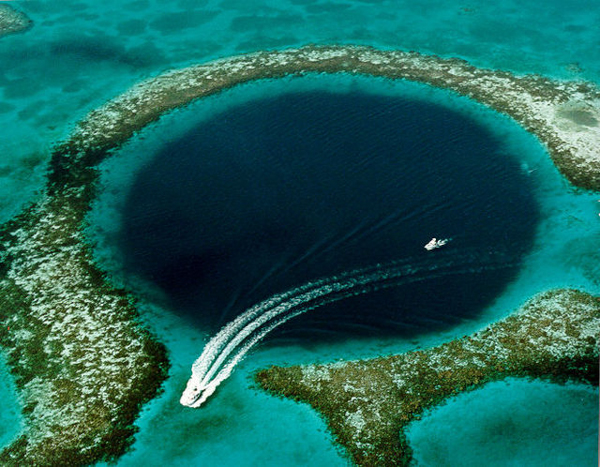 Belize’s Great Blue Hole, part of a UNESCO World Heritage Site that would be included in areas opened to oil and gas drilling under a new proposal from the Belizean government. Photo credit: U.S. Geological Survey. The government of Belize has proposed opening up most of the country’s marine area, including seven areas comprising a […]
Belize’s Great Blue Hole, part of a UNESCO World Heritage Site that would be included in areas opened to oil and gas drilling under a new proposal from the Belizean government. Photo credit: U.S. Geological Survey. The government of Belize has proposed opening up most of the country’s marine area, including seven areas comprising a […]
Photos from the front: the California oil spill in pictures
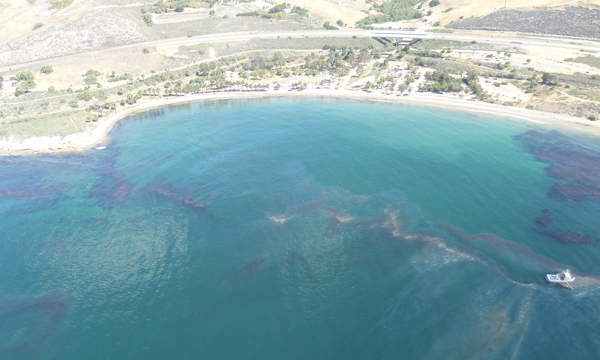 An aerial view of part of the spill on Wednesday, May 20, 2015. Photo credit: Refugio Response Information website. On Tuesday, an underground oil pipeline burst near Goleta, California, spilling crude oil into the Pacific, soiling beaches, killing marine animals, and coating birds in oil. Whales and sea lions were spotted in the spill area, […]
An aerial view of part of the spill on Wednesday, May 20, 2015. Photo credit: Refugio Response Information website. On Tuesday, an underground oil pipeline burst near Goleta, California, spilling crude oil into the Pacific, soiling beaches, killing marine animals, and coating birds in oil. Whales and sea lions were spotted in the spill area, […]
U.S. gov’t gives conditional approval for offshore Arctic drilling
 Chukchi, where the proposed exporatory drilling is to take place, is home to about 2,000 polar bears. The species is currently declining as global warming melts the sea ice on which it depends. Photo by Arturo de Frias Marques. Earlier this week, the Bureau of Ocean Energy Management (BOEM) approved Shell Gulf of Mexico Inc.’s […]
Chukchi, where the proposed exporatory drilling is to take place, is home to about 2,000 polar bears. The species is currently declining as global warming melts the sea ice on which it depends. Photo by Arturo de Frias Marques. Earlier this week, the Bureau of Ocean Energy Management (BOEM) approved Shell Gulf of Mexico Inc.’s […]
9 months after Amazonian oil pipeline spill, effects and fears linger
 CUNINICO, Peru–Villager examine oil slick near this Kukama Indian village in the northeastern Peruvian Amazon. Photo by Barbara Fraser. CUNINICO, Peru—When Peru’s state-run oil company pulled out of this small Kukama Indian village in mid-December after cleaning up an oil pipeline spill, residents thought life could slowly return to normal. But more than three months […]
CUNINICO, Peru–Villager examine oil slick near this Kukama Indian village in the northeastern Peruvian Amazon. Photo by Barbara Fraser. CUNINICO, Peru—When Peru’s state-run oil company pulled out of this small Kukama Indian village in mid-December after cleaning up an oil pipeline spill, residents thought life could slowly return to normal. But more than three months […]
Sundarbans still reeling from effects of December oil spill
 Emergency research finds devastating impacts of oil spill in the world’s largest mangrove forest A crocodile wades into oil-tainted waters in the Sundarbans. Photo by: Arati Kumar-Rao. Last month, an estimated 350,000 liters of fuel oil spilled into the Sundarbans delta on the Bay of Bengal. An oil tanker that had collided with a cargo […]
Emergency research finds devastating impacts of oil spill in the world’s largest mangrove forest A crocodile wades into oil-tainted waters in the Sundarbans. Photo by: Arati Kumar-Rao. Last month, an estimated 350,000 liters of fuel oil spilled into the Sundarbans delta on the Bay of Bengal. An oil tanker that had collided with a cargo […]
Top 10 Environmental Stories of 2014
 The most important environmental and wildlife stories from the last year Also see our Top 10 HAPPY Environmental Stories of 2014 1. The Year of Zero Deforestation Pledges: In 2014, the unimaginable happened: companies representing the majority of palm oil production and trade agreed to stop cutting down rainforests and draining peatlands for new oil […]
The most important environmental and wildlife stories from the last year Also see our Top 10 HAPPY Environmental Stories of 2014 1. The Year of Zero Deforestation Pledges: In 2014, the unimaginable happened: companies representing the majority of palm oil production and trade agreed to stop cutting down rainforests and draining peatlands for new oil […]
Children ‘clean’ oil spill with kitchen utensils in the Sundarbans
 Bangladesh struggles to deal with devastating oil spill in world’s largest mangrove forest, home to dolphins and tigers Government inaction has pushed local children and families to attempt to clean up the oil spill with little more than household items and no protective gear. Photo by: Kallol Mustafa. On December 9th, a tanker slammed into […]
Bangladesh struggles to deal with devastating oil spill in world’s largest mangrove forest, home to dolphins and tigers Government inaction has pushed local children and families to attempt to clean up the oil spill with little more than household items and no protective gear. Photo by: Kallol Mustafa. On December 9th, a tanker slammed into […]
What happened to the oil from the Deepwater Horizon disaster?
 A controlled burning of Macondo well oil from the Deepwater Horizon disaster that rose to the ocean surface. [Credit: David Valentine] Images from the 2010 Deepwater Horizon disaster endure, from the collapsing platform to oil-fouled coastline. But beneath the surface is a story photographers cannot as easily capture. Two days after the April 20, 2010 […]
A controlled burning of Macondo well oil from the Deepwater Horizon disaster that rose to the ocean surface. [Credit: David Valentine] Images from the 2010 Deepwater Horizon disaster endure, from the collapsing platform to oil-fouled coastline. But beneath the surface is a story photographers cannot as easily capture. Two days after the April 20, 2010 […]
Peruvian oil spill sparks concern in indigenous rainforest community
 The spill site in Cuninico, Peru. Courtesy of Google Earth. A ruptured pipeline that spilled tens of thousands of gallons of crude oil into the Marañón River in late June is fueling concerns about potential health impacts for a small indigenous community, reports Environmental Health News. According to a story published last week, an 845-kilometer […]
The spill site in Cuninico, Peru. Courtesy of Google Earth. A ruptured pipeline that spilled tens of thousands of gallons of crude oil into the Marañón River in late June is fueling concerns about potential health impacts for a small indigenous community, reports Environmental Health News. According to a story published last week, an 845-kilometer […]
By the bones: herring populations were superabundant before commercial fisheries
 Scientists analyzed almost half a million fish bones to shed light on the population history of Pacific herring (Clupea pallasii) in the North Pacific Ocean. Their paper, published in the journal Proceedings of the National Academy of Sciences (PNAS) reveals a decline of unprecedented scale. It suggests that while the abundance of Pacific herring does […]
Scientists analyzed almost half a million fish bones to shed light on the population history of Pacific herring (Clupea pallasii) in the North Pacific Ocean. Their paper, published in the journal Proceedings of the National Academy of Sciences (PNAS) reveals a decline of unprecedented scale. It suggests that while the abundance of Pacific herring does […]
Shell drops plans to drill in the Arctic for now
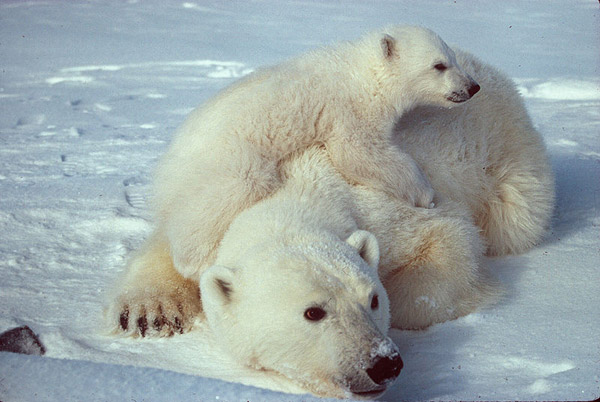 Facing plunging profits, Royal Dutch Shell has announced it will cut exploration and development funding by nearly $10 billion this year, including halting their long-suffering plans to drill in the Arctic ocean. Shell’s new CEO, Ben van Beurden, made the announcement yesterday that controversial plans to drill off the Alaskan coast will be put on […]
Facing plunging profits, Royal Dutch Shell has announced it will cut exploration and development funding by nearly $10 billion this year, including halting their long-suffering plans to drill in the Arctic ocean. Shell’s new CEO, Ben van Beurden, made the announcement yesterday that controversial plans to drill off the Alaskan coast will be put on […]
A series of oil spills sully Caribbean paradise, coating mangroves and wildlife (photos)
 On December 17th, officials first discovered a massive oil spill in the Caribbean-island nation of Trinidad and Tobago. Since then, a series of oil spills have been discovered, coating beaches, sullying mangrove forests, and very likely decimating wildlife in Trinidad’s Gulf of Paria. The oil spills have been linked to the state-owned oil company, Petrotrin, […]
On December 17th, officials first discovered a massive oil spill in the Caribbean-island nation of Trinidad and Tobago. Since then, a series of oil spills have been discovered, coating beaches, sullying mangrove forests, and very likely decimating wildlife in Trinidad’s Gulf of Paria. The oil spills have been linked to the state-owned oil company, Petrotrin, […]
World first: Russia begins pumping oil from Arctic seabed
 Oil has begun to be pumped from the Arctic seabed, according to Russian oil giant, Gazprom. The company announced on Friday that it has begun exploiting oil reserves at the offshore field of Prirazlomnoye. The project, which is several years behind schedule, is hugely controversial and made international headlines in September after Russian military arrested […]
Oil has begun to be pumped from the Arctic seabed, according to Russian oil giant, Gazprom. The company announced on Friday that it has begun exploiting oil reserves at the offshore field of Prirazlomnoye. The project, which is several years behind schedule, is hugely controversial and made international headlines in September after Russian military arrested […]
Indigenous groups win right to pursue Chevron assets in Canada in Amazon pollution case
 Lago Agrio oil field in Ecuador. Image adapted from Bing Maps Indigenous plaintiffs in a long-running legal dispute against Chevron won the right to pursue the oil giant’s assets in Canada as part of a $9.5 billion judgement by an Ecuadorean court over damages in the Amazon, reports Amazon Watch. On Tuesday Ontario’s Court of […]
Lago Agrio oil field in Ecuador. Image adapted from Bing Maps Indigenous plaintiffs in a long-running legal dispute against Chevron won the right to pursue the oil giant’s assets in Canada as part of a $9.5 billion judgement by an Ecuadorean court over damages in the Amazon, reports Amazon Watch. On Tuesday Ontario’s Court of […]
Gulf of Mexico deep sea may need decades to recover from oil spill
 The catastrophic explosion that spewed some five million barrels of oil deep into the Gulf of Mexico in April 2010 will take a heavy toll in the ocean’s lowest layers for years to come. That’s the stark conclusion of seafloor research conducted six months after the Deepwater Horizon oil spill. The study, published on August […]
The catastrophic explosion that spewed some five million barrels of oil deep into the Gulf of Mexico in April 2010 will take a heavy toll in the ocean’s lowest layers for years to come. That’s the stark conclusion of seafloor research conducted six months after the Deepwater Horizon oil spill. The study, published on August […]
Forgotten species: the nearly extinct primate that can be shot on sight
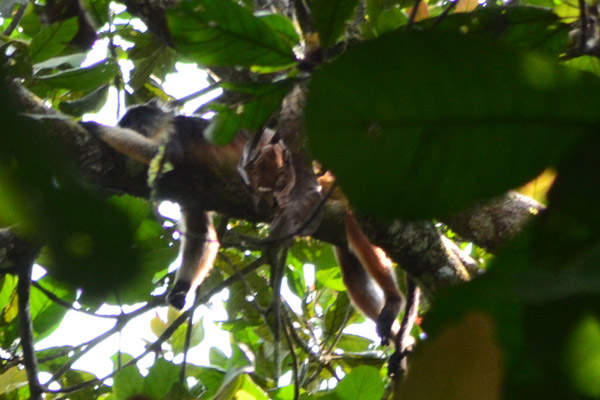 Everyone knows the tiger, the panda, the blue whale, but what about the other five to thirty million species estimated to inhabit our Earth? Many of these marvelous, stunning, and rare species have received little attention from the media, conservation groups, and the public. This series is an attempt to give these ‘forgotten species‘ some […]
Everyone knows the tiger, the panda, the blue whale, but what about the other five to thirty million species estimated to inhabit our Earth? Many of these marvelous, stunning, and rare species have received little attention from the media, conservation groups, and the public. This series is an attempt to give these ‘forgotten species‘ some […]
11,000 barrels of oil spill into the Coca River in the Amazon
 On May 31st, a landslide ruptured an oil pipeline in Ecuadorean Amazon, sending around 11,000 barrels of oil ( 420,000 gallons) into the Coca River. The oil pollution has since moved into the larger Napo River, which borders Yasuni National Park, and is currently heading downstream into Peru and Brazil. The spill has occurred in […]
On May 31st, a landslide ruptured an oil pipeline in Ecuadorean Amazon, sending around 11,000 barrels of oil ( 420,000 gallons) into the Coca River. The oil pollution has since moved into the larger Napo River, which borders Yasuni National Park, and is currently heading downstream into Peru and Brazil. The spill has occurred in […]
Canadian province cancels tar sands pipeline due to environmental impact
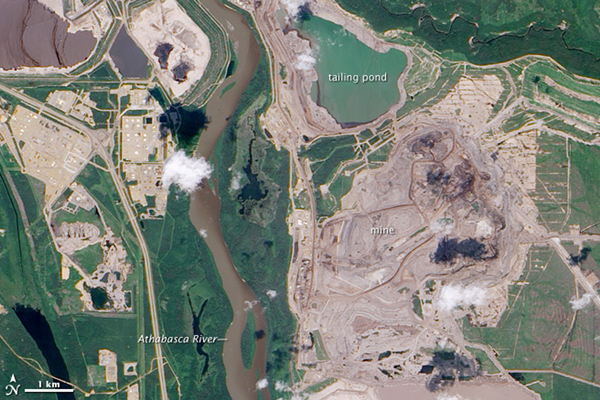 Efforts to expand production from the Alberta tar sands suffered a significant setback on Friday when the provincial government of British Columbia rejected a pipeline project because of environmental shortcomings. In a strongly worded statement, the government of the province said it was not satisfied with the pipeline company’s oil spill response plans. The rejection […]
Efforts to expand production from the Alberta tar sands suffered a significant setback on Friday when the provincial government of British Columbia rejected a pipeline project because of environmental shortcomings. In a strongly worded statement, the government of the province said it was not satisfied with the pipeline company’s oil spill response plans. The rejection […]
Is it possible to reduce the impact of oil drilling in the Amazon rainforest?
 Oil extraction in the Amazon rainforest has been linked to severe environmental degradation — including deforestation and pollution — which in some areas has spurred violent social conflict. Yet a vast extent of the Colombian, Peruvian, Ecuadorian, Bolivian, and Brazilian Amazon is currently under concession for oil and gas exploration and production — hundreds of […]
Oil extraction in the Amazon rainforest has been linked to severe environmental degradation — including deforestation and pollution — which in some areas has spurred violent social conflict. Yet a vast extent of the Colombian, Peruvian, Ecuadorian, Bolivian, and Brazilian Amazon is currently under concession for oil and gas exploration and production — hundreds of […]
Citizen group finds 30 toxic chemicals in air following tar sands oil spill in Arkansas
 Independent air samples by locals have yielded “a soup of toxic chemicals” in Mayflower, Arkansas where an Exxon Mobil pipeline burst on March 29th spilling some 5,000 barrels of tar sands oil, known as bitumen. Chemicals detected included several linked to cancer, reproductive problems, and neurological impacts such as benzene and ethylbenzene. Air samples were […]
Independent air samples by locals have yielded “a soup of toxic chemicals” in Mayflower, Arkansas where an Exxon Mobil pipeline burst on March 29th spilling some 5,000 barrels of tar sands oil, known as bitumen. Chemicals detected included several linked to cancer, reproductive problems, and neurological impacts such as benzene and ethylbenzene. Air samples were […]
Tar sands oil spill: ruptured pipe pours 200,000 gallons of oil into suburban neighborhood (photos)
 Last Saturday, an oil pipeline carrying tar sands oil from Canada ruptured in Mayflower, Arkansas spilling between 3,500-5,000 barrels of crude (at most 210,000 gallons) into neighborhood streets and lawns. Families from 22 homes have been evacuated while clean-up crews have scrambled to contain the spill. ExxonMobil, which runs the 65-year-old Pegasus pipeline, has stated […]
Last Saturday, an oil pipeline carrying tar sands oil from Canada ruptured in Mayflower, Arkansas spilling between 3,500-5,000 barrels of crude (at most 210,000 gallons) into neighborhood streets and lawns. Families from 22 homes have been evacuated while clean-up crews have scrambled to contain the spill. ExxonMobil, which runs the 65-year-old Pegasus pipeline, has stated […]
After decades of turning a blind eye, Peru declares state of emergency due to oil contamination in Amazon
 River in the Peruvian Amazon. Photo by: Rhett A. Butler. The Peruvian government has declared an environmental state of emergency after finding elevated levels of lead, barium, and chromium in the Pastaza River in the Amazon jungle, reports the Associated Press. Indigenous peoples in the area have been complaining for decades of widespread contamination from […]
River in the Peruvian Amazon. Photo by: Rhett A. Butler. The Peruvian government has declared an environmental state of emergency after finding elevated levels of lead, barium, and chromium in the Pastaza River in the Amazon jungle, reports the Associated Press. Indigenous peoples in the area have been complaining for decades of widespread contamination from […]
NGOs call on Obama Administration to suspend Arctic oil drilling after series of blunders
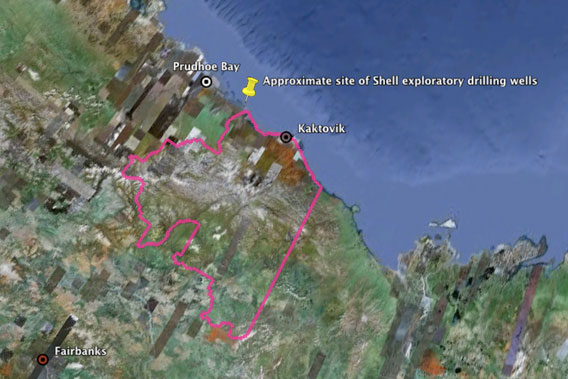 Approximate site of preliminarily approved drilling by Shell in the Chukchi Sea. Pink outline is the Arctic National Wildlife Refuge (ANWR). Image made with Google Earth. A coalition of 17 conservation groups are calling on the Obama Administration to suspend offshore oil and gas drilling in the Arctic after Shell’s attempt to drill there has […]
Approximate site of preliminarily approved drilling by Shell in the Chukchi Sea. Pink outline is the Arctic National Wildlife Refuge (ANWR). Image made with Google Earth. A coalition of 17 conservation groups are calling on the Obama Administration to suspend offshore oil and gas drilling in the Arctic after Shell’s attempt to drill there has […]
Oil drilling approved for national park in Belize
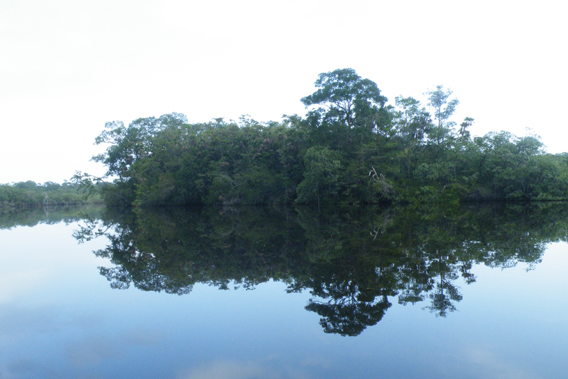 Dawn breaking over Black Creek, Sarstoon Temash National Park. Photo by: Robin Oisín Llewellyn. The Belizean government has approved an application by US Capital Energy to drill exploratory wells for oil in the Sarstoon Temash National Park in southern Belize. The decision is believed to have been taken on November 1st by the National Environmental […]
Dawn breaking over Black Creek, Sarstoon Temash National Park. Photo by: Robin Oisín Llewellyn. The Belizean government has approved an application by US Capital Energy to drill exploratory wells for oil in the Sarstoon Temash National Park in southern Belize. The decision is believed to have been taken on November 1st by the National Environmental […]
BP fined $4.5 billion for Gulf of Mexico oil spill, but company may spend more buying its own stocks
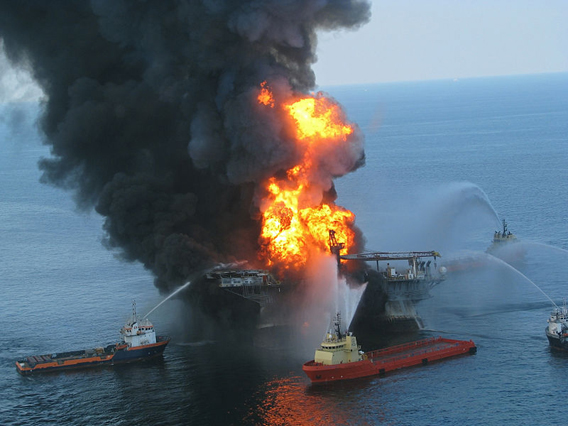 Ships battle the blaze after the Deepwater Horizon oil rig exploded. Photo by: U.S. Coast Guard. Last week the U.S. federal government fined BP $4.5 billion for the Deepwater Horizon disaster in 2010, which killed 11 workers and leaked nearly 5 million barrels of oil into the Gulf of Mexico. The oil giant also plead […]
Ships battle the blaze after the Deepwater Horizon oil rig exploded. Photo by: U.S. Coast Guard. Last week the U.S. federal government fined BP $4.5 billion for the Deepwater Horizon disaster in 2010, which killed 11 workers and leaked nearly 5 million barrels of oil into the Gulf of Mexico. The oil giant also plead […]
Above the ocean: saving the world’s most threatened birds
 This post is an expanded version of an article that appeared in August on Yale e360: Easing The Collateral Damage Fisheries Inflict on Seabirds.
This post is an expanded version of an article that appeared in August on Yale e360: Easing The Collateral Damage Fisheries Inflict on Seabirds.
Penguins face a slippery future
 Adelie penguins hunting for food. Photo by: J. Weller. Click to enlarge. Pablo Garcia Borboroglu will be speaking at the Wildlife Conservation Network Expo in San Francisco on October 13th, 2012. Penguins have spent years fooling us. With their image seemingly every where we turn—entertaining us in animated films, awing us in documentaries, and winking […]
Adelie penguins hunting for food. Photo by: J. Weller. Click to enlarge. Pablo Garcia Borboroglu will be speaking at the Wildlife Conservation Network Expo in San Francisco on October 13th, 2012. Penguins have spent years fooling us. With their image seemingly every where we turn—entertaining us in animated films, awing us in documentaries, and winking […]
Another mishap kills Shell’s Arctic oil drilling for the year
 Approximate site of preliminarily approved drilling by Shell in the Chukchi Sea. Pink outline is the Arctic National Wildlife Refuge (ANWR). Image made with Google Earth. Following global protests, a series of embarrassing mishaps, and a lengthy regulatory process, Dutch Royal Shell has announced it is abandoning its hugely controversial off-shore oil drilling in the […]
Approximate site of preliminarily approved drilling by Shell in the Chukchi Sea. Pink outline is the Arctic National Wildlife Refuge (ANWR). Image made with Google Earth. Following global protests, a series of embarrassing mishaps, and a lengthy regulatory process, Dutch Royal Shell has announced it is abandoning its hugely controversial off-shore oil drilling in the […]
Shell begins offshore drilling in the Alaskan Arctic
 Approximate site of preliminarily approved drilling by Shell in the Chukchi Sea. Pink outline is the Arctic National Wildlife Refuge (ANWR). Image made with Google Earth. With the approval of the Obama Administration, Royal Dutch Shell began drilling into the ocean floor of the Chukchi Sea off the coast of Alaska yesterday morning. The controversial […]
Approximate site of preliminarily approved drilling by Shell in the Chukchi Sea. Pink outline is the Arctic National Wildlife Refuge (ANWR). Image made with Google Earth. With the approval of the Obama Administration, Royal Dutch Shell began drilling into the ocean floor of the Chukchi Sea off the coast of Alaska yesterday morning. The controversial […]
Obama approves preparation for oil drilling in Arctic, Shell en route
 Approximate site of preliminarily approved drilling by Shell in the Chukchi Sea. Pink outline is the Arctic National Wildlife Refuge (ANWR). Image made with Google Earth. In the same week that sea ice in the Arctic Ocean hit another record low due to climate change, the Obama Administration has given final approval to Royal Dutch […]
Approximate site of preliminarily approved drilling by Shell in the Chukchi Sea. Pink outline is the Arctic National Wildlife Refuge (ANWR). Image made with Google Earth. In the same week that sea ice in the Arctic Ocean hit another record low due to climate change, the Obama Administration has given final approval to Royal Dutch […]
Greenpeace abandons occupation of Arctic oil drilling rig after workers throw metal at them
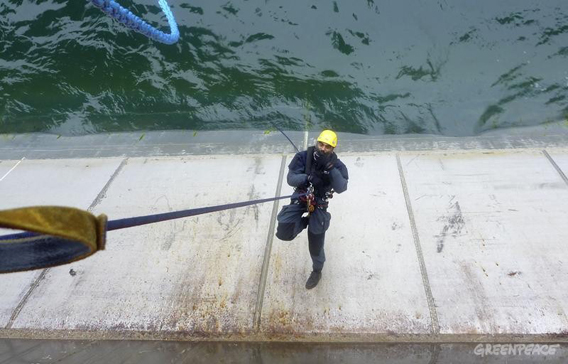 UPDATE: After failing to slow down Gazprom by occupying its oil rig, Greenpeace is trying a different tact: activists have now attached their boat to a Gazprom passenger vessel preventing workers from reaching the oil rig and forcing an ongoing delay in operations. Kumi Naidoo, head of Greenpeace, scaling a Gazprom oil platform for drilling […]
UPDATE: After failing to slow down Gazprom by occupying its oil rig, Greenpeace is trying a different tact: activists have now attached their boat to a Gazprom passenger vessel preventing workers from reaching the oil rig and forcing an ongoing delay in operations. Kumi Naidoo, head of Greenpeace, scaling a Gazprom oil platform for drilling […]
Shell running out of time to drill in U.S. Arctic – this year
 Approximate site of preliminarily approved drilling by Shell in the Chukchi Sea. Pink outline is the Arctic National Wildlife Refuge (ANWR). Image made with Google Earth. The clock is running out for oil giant, Royal Dutch Shell, to drill controversial oil wells in the U.S. Arctic before the harsh winter sets in, reports The Wall […]
Approximate site of preliminarily approved drilling by Shell in the Chukchi Sea. Pink outline is the Arctic National Wildlife Refuge (ANWR). Image made with Google Earth. The clock is running out for oil giant, Royal Dutch Shell, to drill controversial oil wells in the U.S. Arctic before the harsh winter sets in, reports The Wall […]
Deepwater Horizon oil spill may have played role in dolphin deaths
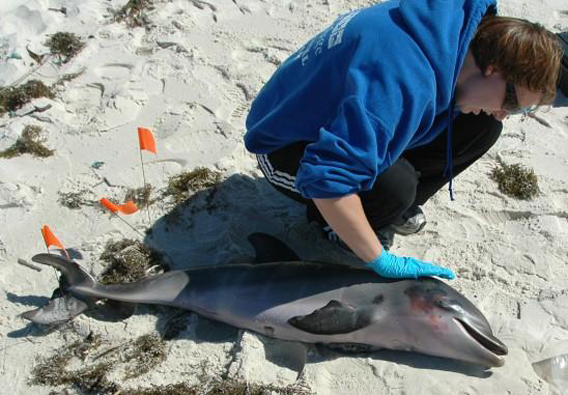 Researcher with dead dolphin calf. Photo courtesy of the University of Central Florida. In the first four months of 2011, 186 bottlenose dolphins (Tursiops truncatus) were found dead in the Gulf of Mexico, nearly half of them dolphin calves many of whom were perinatal, or near birth. Researchers now believe a number of factors may […]
Researcher with dead dolphin calf. Photo courtesy of the University of Central Florida. In the first four months of 2011, 186 bottlenose dolphins (Tursiops truncatus) were found dead in the Gulf of Mexico, nearly half of them dolphin calves many of whom were perinatal, or near birth. Researchers now believe a number of factors may […]
Greenpeace activists occupy icebreaker set for Arctic drilling
 Approximate site of exploratory drilling by Shell in the Arctic’s Beaufort Sea. Pink outline is the Arctic National Wildlife Refuge (ANWR). Shell is also hoping to drill in the neighboring Chukchi Sea. Image made with Google Earth. Greenpeace has announced that 20 of its activists, stemming from 13 countries, have locked themselves in an icebreaker […]
Approximate site of exploratory drilling by Shell in the Arctic’s Beaufort Sea. Pink outline is the Arctic National Wildlife Refuge (ANWR). Shell is also hoping to drill in the neighboring Chukchi Sea. Image made with Google Earth. Greenpeace has announced that 20 of its activists, stemming from 13 countries, have locked themselves in an icebreaker […]
BP Deepwater Horizon deformities: eyeless shrimp, clawless crabs
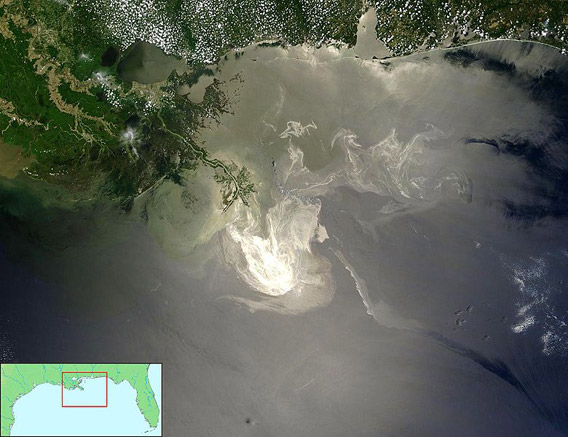 BP Deepwater Horizon oil spill as seen from space. Photo by: NASA’s Terra Satellite. Two years after the BP-leased Deepwater Horizon drilling rig exploded in the Gulf of Mexico, killing eleven and causing an oil spill that lasted three months, scientists say the impacts on the Gulf ecosystem are only beginning to come to light […]
BP Deepwater Horizon oil spill as seen from space. Photo by: NASA’s Terra Satellite. Two years after the BP-leased Deepwater Horizon drilling rig exploded in the Gulf of Mexico, killing eleven and causing an oil spill that lasted three months, scientists say the impacts on the Gulf ecosystem are only beginning to come to light […]
Obama Administration, Shell moving ahead with Arctic oil exploitation
 Approximate site of preliminarily approved drilling by Shell. Pink outline is the Arctic National Wildlife Refuge (ANWR). Image made with Google Earth. Last week, the U.S. Department of the Interior approved oil spill clean-up plans by Royal Dutch Shell Oil in the Beaufort Sea, paving the way for offshore oil drilling in the Arctic to […]
Approximate site of preliminarily approved drilling by Shell. Pink outline is the Arctic National Wildlife Refuge (ANWR). Image made with Google Earth. Last week, the U.S. Department of the Interior approved oil spill clean-up plans by Royal Dutch Shell Oil in the Beaufort Sea, paving the way for offshore oil drilling in the Arctic to […]
Indigenous groups fight for recognition and illumination in Peru
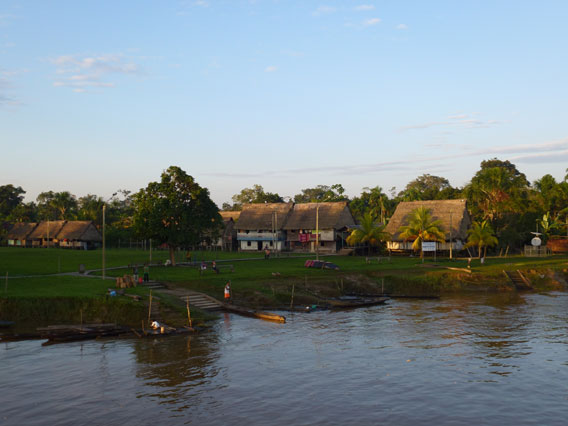 Amazon community on the Rio Corrientes. Photo by: Patrick le Flufy. “Shh, wait here,” Wilson told me. I ducked down behind the buttress of a large tree to wait. We had been walking through the jungle for a few hours. At first we followed a path through the undergrowth, a wet world of ferns, trunks […]
Amazon community on the Rio Corrientes. Photo by: Patrick le Flufy. “Shh, wait here,” Wilson told me. I ducked down behind the buttress of a large tree to wait. We had been walking through the jungle for a few hours. At first we followed a path through the undergrowth, a wet world of ferns, trunks […]
Featured Video: the true cost of the tar sands
What’s the big deal about the tar sands? Canadian photographer Garth Lenz presents the local environmental and social concerns presented by the tar sands in a concise, impassioned speech in a TEDx talk in Victoria, Canada. The tar sands has recently moved from a primarily Canadian issue into an international one as activists in the […]
Opposition rising against U.S. Arctic drilling
 Approximate site of preliminarily approved drilling by Shell. Pink outline is the Arctic National Wildlife Refuge (ANWR). Image made with Google Earth. Drilling in the Arctic waters of the U.S. may become as contested an issue as the Keystone Pipeline XL in up-coming months. Scientists, congress members, and ordinary Americans have all come out in […]
Approximate site of preliminarily approved drilling by Shell. Pink outline is the Arctic National Wildlife Refuge (ANWR). Image made with Google Earth. Drilling in the Arctic waters of the U.S. may become as contested an issue as the Keystone Pipeline XL in up-coming months. Scientists, congress members, and ordinary Americans have all come out in […]
Black Swans and bottom-up environmental action
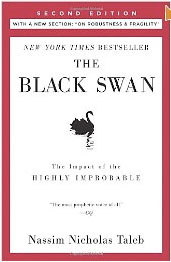 “History does not crawl, it jumps.”- Nassim Nicholas Taleb “This is an opportunity for greatness which has never been offered to any civilization… in human history before – to act as a generation to do the right thing – and if we fail to receive that opportunity to act on it then my feeling is […]
“History does not crawl, it jumps.”- Nassim Nicholas Taleb “This is an opportunity for greatness which has never been offered to any civilization… in human history before – to act as a generation to do the right thing – and if we fail to receive that opportunity to act on it then my feeling is […]
Top 10 Environmental Stories of 2011
 Victories won by activists around the world tops our list of the big environmental stories of the year. In this photo: a young woman is placed in handcuffs and arrested for civil disobedience against the Keystone XL Pipeline in the U.S. In all, 1,252 people were arrested in the two week long action. Photo by: […]
Victories won by activists around the world tops our list of the big environmental stories of the year. In this photo: a young woman is placed in handcuffs and arrested for civil disobedience against the Keystone XL Pipeline in the U.S. In all, 1,252 people were arrested in the two week long action. Photo by: […]
12,000 surround White House to protest tar sands pipeline
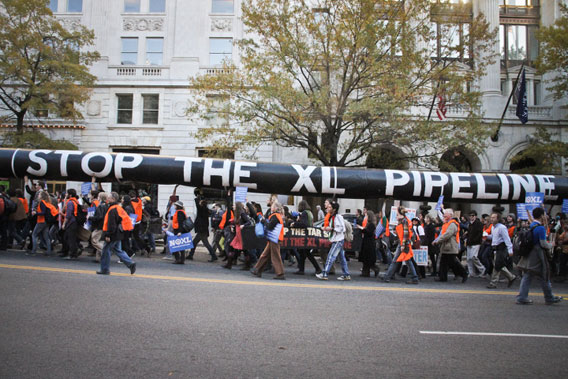 Around 12,000 protestors surrounded the White House, some carrying a symbolic pipeline. Photo by: Clayton Conn. One year to the day before the 2012 US election, up to 12,000 activists encircled the White House to protest the Keystone XL pipeline, a proposed 1,700 mile pipeline that would carry oil from Canada’s infamous tar sands to […]
Around 12,000 protestors surrounded the White House, some carrying a symbolic pipeline. Photo by: Clayton Conn. One year to the day before the 2012 US election, up to 12,000 activists encircled the White House to protest the Keystone XL pipeline, a proposed 1,700 mile pipeline that would carry oil from Canada’s infamous tar sands to […]
Photos: pelicans covered in BP oil wins top wildlife photo prize
 2011 Veolia Environment Wildlife Photographer of the Year: Still life in oil. Photo by: Daniel Beltra. Fittingly, the winner of the 2011 Veolia Wildlife Environment Photographer of the Year award captured the shock of last year’s BP Deepwater Horizon spill in the US with a single image of oiled pelicans huddled in a rescue center. […]
2011 Veolia Environment Wildlife Photographer of the Year: Still life in oil. Photo by: Daniel Beltra. Fittingly, the winner of the 2011 Veolia Wildlife Environment Photographer of the Year award captured the shock of last year’s BP Deepwater Horizon spill in the US with a single image of oiled pelicans huddled in a rescue center. […]
Photos: New Zealand oil disaster kills over 1200 birds to date
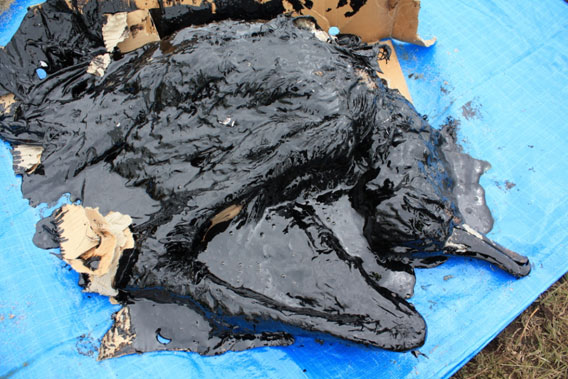 White capped albatross killed by oil. This species is listed as Near Threatened by the IUCN Red List. Photo ©: Forest & Bird. According to the New Zealand government an oil spill from a grounded container ship in the Bay of Plenty has killed 1,250 seabirds with hundreds of others in rescue centers. However, conservationists […]
White capped albatross killed by oil. This species is listed as Near Threatened by the IUCN Red List. Photo ©: Forest & Bird. According to the New Zealand government an oil spill from a grounded container ship in the Bay of Plenty has killed 1,250 seabirds with hundreds of others in rescue centers. However, conservationists […]
Bird-killing oil spill New Zealand’s ‘worst environmental disaster’
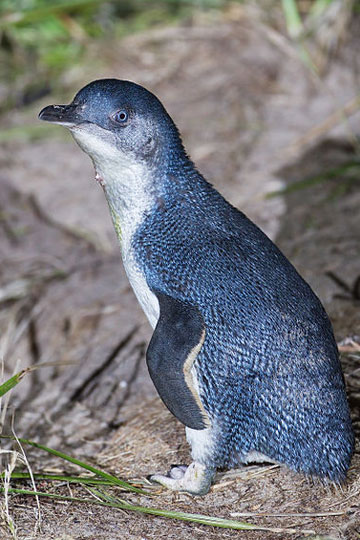 View Larger Map A marks the location of Papamoa Beach in the Bay of Plenty. An oil spill from a grounded container ship in New Zealand’s Bay of Plenty is threatening to worsen as authorities fear the ship is breaking up. Already, 350 tons of oil from the ship, the MV Rena, has leaked out […]
View Larger Map A marks the location of Papamoa Beach in the Bay of Plenty. An oil spill from a grounded container ship in New Zealand’s Bay of Plenty is threatening to worsen as authorities fear the ship is breaking up. Already, 350 tons of oil from the ship, the MV Rena, has leaked out […]
Deepwater spill ‘meets the Titanic’: groups sue to stop Arctic drilling
 Approximate site of preliminarily approved drilling by Shell. Pink outline is the Arctic National Wildlife Refuge (ANWR). Image made with Google Earth. Following the Obama administration’s approval of Royal Dutch Shell to drill in the Arctic’s Beaufort Sea, a wide-swathe of environmental have filed a lawsuit to stop the drilling, which could begin as early […]
Approximate site of preliminarily approved drilling by Shell. Pink outline is the Arctic National Wildlife Refuge (ANWR). Image made with Google Earth. Following the Obama administration’s approval of Royal Dutch Shell to drill in the Arctic’s Beaufort Sea, a wide-swathe of environmental have filed a lawsuit to stop the drilling, which could begin as early […]
Deepwater oil spill likely to hurt fish populations over decades
Oil pollution doesn’t have to kill fish to have a long-term impact, according to a recent study in the Proceedings of the National Academy of Sciences (PNAS). Researchers found that Gulf killifish (Fundulus grandis) that had been exposed to very low to non-detectable levels of oil contamination from the Deepwater oil spill last year, still […]
Climate test for Obama: 1,252 people arrested over notorious oil pipeline
 James Hansen (on the left) with religious leaders at Keystone XL civil disobedience. Photo by: Josh Lopez/Tar Sands Action. Two weeks of climate disobedience at the White House ended over the weekend with 1,252 people arrested in total. Activists were protesting the controversial Keystone XL pipeline in an effort to pressure US President Barack Obama […]
James Hansen (on the left) with religious leaders at Keystone XL civil disobedience. Photo by: Josh Lopez/Tar Sands Action. Two weeks of climate disobedience at the White House ended over the weekend with 1,252 people arrested in total. Activists were protesting the controversial Keystone XL pipeline in an effort to pressure US President Barack Obama […]
Mass walrus haul-outs, polar bear cub mortality linked to climate change
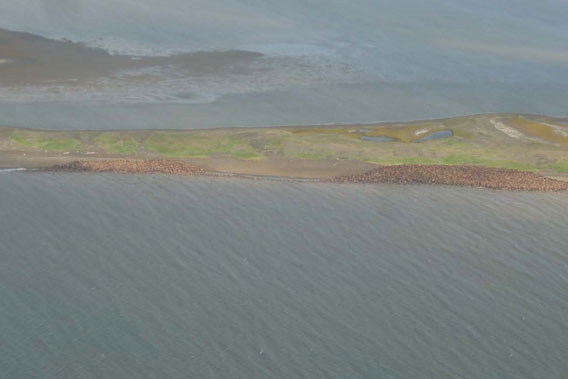 Walruses haul-out of the water en masse . Photo by: Baine Thorn/NOAA . Recent, unprecedented walrus haul-outs and increased instances of long-distance swims by polar bears show the direct impacts on wildlife of dwindling Arctic sea ice from climate change. These threatened species also face the prospect of offshore drilling in the Arctic after the […]
Walruses haul-out of the water en masse . Photo by: Baine Thorn/NOAA . Recent, unprecedented walrus haul-outs and increased instances of long-distance swims by polar bears show the direct impacts on wildlife of dwindling Arctic sea ice from climate change. These threatened species also face the prospect of offshore drilling in the Arctic after the […]
Mass walrus haul-outs, polar bear cub mortality linked to climate change
 Walruses haul-out of the water en masse. Photo by Baine Thorn/NOAA. Recent, unprecedented walrus haul-outs and increased instances of long-distance swims by polar bears show the direct impacts on wildlife of dwindling Arctic sea ice from climate change. These threatened species also face the prospect of offshore drilling in the Arctic after the Obama Administration […]
Walruses haul-out of the water en masse. Photo by Baine Thorn/NOAA. Recent, unprecedented walrus haul-outs and increased instances of long-distance swims by polar bears show the direct impacts on wildlife of dwindling Arctic sea ice from climate change. These threatened species also face the prospect of offshore drilling in the Arctic after the Obama Administration […]
Featured video: debating the tar sands pipeline as arrests mount
As arrests during a two week long civil action against the Keystone Pipeline XL in Washington DC rose to nearly 600 people, Bill McKibben, head of 350.org, and Robert Bryce, Manhattan Institute for Policy Research, debated the issue on PBS. While activists oppose the massive pipeline (from Canada to Texas) for a variety of reasons, […]
Picture of the day: activists rally at White House against tar sands pipeline
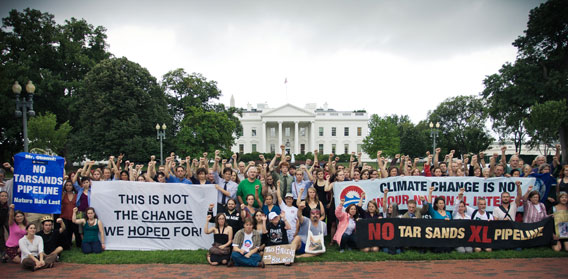 Activists against the tar sands pipeline rally on Saturday in Washington, DC ahead of Hurricane Irene. Photo by: Josh Lopez/Tar Sands Action. Click to enlarge. A two week long civil action is taking place in front of the White House in an attempt to convince the Obama Administration to turn down the Keystone Pipeline XL, […]
Activists against the tar sands pipeline rally on Saturday in Washington, DC ahead of Hurricane Irene. Photo by: Josh Lopez/Tar Sands Action. Click to enlarge. A two week long civil action is taking place in front of the White House in an attempt to convince the Obama Administration to turn down the Keystone Pipeline XL, […]
Shell spills over 50,000 gallons of oil off Scotland
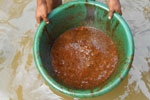 Yesterday, Royal Dutch Shell estimated that to date 54,600 gallons of oil had spilled into the North Sea off the east coast of Scotland, spreading some 19 miles wide (30 kilometers) at its maximum. While the company stopped the initial leak on Thursday, it has now announced that the oil has found a ‘second pathway’ […]
Yesterday, Royal Dutch Shell estimated that to date 54,600 gallons of oil had spilled into the North Sea off the east coast of Scotland, spreading some 19 miles wide (30 kilometers) at its maximum. While the company stopped the initial leak on Thursday, it has now announced that the oil has found a ‘second pathway’ […]
Arctic open for exploitation: Obama administration grants Shell approval to drill
 Approximate site of preliminarily approved drilling by Shell. Pink outline is the Arctic National Wildlife Refuge (ANWR). Image made with Google Earth. Less than a year and a half after the oil spill in the Gulf of Mexico, the Obama administration has bucked warnings from environmentalists to grant preliminary approval to oil giant, Royal Dutch […]
Approximate site of preliminarily approved drilling by Shell. Pink outline is the Arctic National Wildlife Refuge (ANWR). Image made with Google Earth. Less than a year and a half after the oil spill in the Gulf of Mexico, the Obama administration has bucked warnings from environmentalists to grant preliminary approval to oil giant, Royal Dutch […]
Oil horror in Nigeria: 30 years, one billion dollars to clean-up
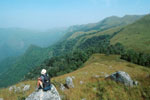 Fifty years of oil spills in Nigeria’s now infamous Ogoniland region will take up to three decades and over a billion dollars ($1 billion for just the first five years) to restore environments to healthy conditions, according to a new independent report by the United Nations Environment Program (UNEP). The most thorough study to date […]
Fifty years of oil spills in Nigeria’s now infamous Ogoniland region will take up to three decades and over a billion dollars ($1 billion for just the first five years) to restore environments to healthy conditions, according to a new independent report by the United Nations Environment Program (UNEP). The most thorough study to date […]
Oil company hires indigenous people to clean up its Amazon spill with rags and buckets
 On Sunday morning children swimming in the Mashiria River in the Peruvian Amazon noticed oil floating on the water. A pipeline owned by Maple Energy had ruptured in Block 31-E, polluting the Mashiria River which is used by the Shipibo indigenous community in Nuevo Sucre for fishing and drinking water. In response to the spill, […]
On Sunday morning children swimming in the Mashiria River in the Peruvian Amazon noticed oil floating on the water. A pipeline owned by Maple Energy had ruptured in Block 31-E, polluting the Mashiria River which is used by the Shipibo indigenous community in Nuevo Sucre for fishing and drinking water. In response to the spill, […]
Greenpeace head arrested after nonviolent protest on Arctic oil rig
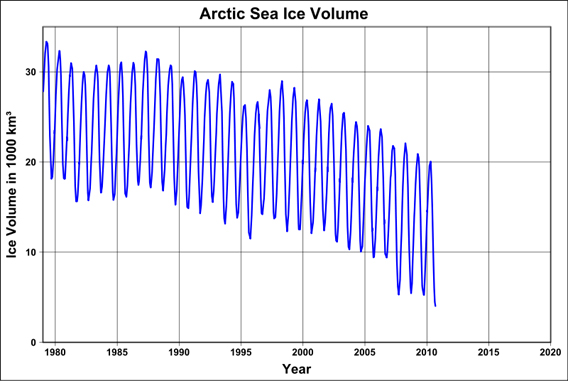 Scientists expect that the Arctic will be fully ice-free during summer sometime during this century. Graph by: Dominiklenne. Kumi Naidoo, the head of Greenpeace, has been arrested after scaling a deepwater oil rig in the Arctic run by Cairn Energy. Naidoo was attempting to deliver a petition to the captain signed by 50,000 people demanding […]
Scientists expect that the Arctic will be fully ice-free during summer sometime during this century. Graph by: Dominiklenne. Kumi Naidoo, the head of Greenpeace, has been arrested after scaling a deepwater oil rig in the Arctic run by Cairn Energy. Naidoo was attempting to deliver a petition to the captain signed by 50,000 people demanding […]
Arctic on the line: oil industry versus Greenpeace at the top of the world
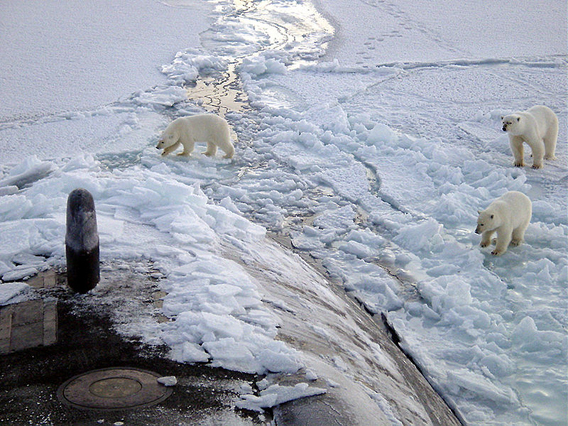 Not long ago such an image would have been impossible, but here polar bears meet a US attack submarine. US Navy Photo by: Chief Yeoman Alphonso Braggs, US-Navy. At the top of the world sits a lone region of shifting sea ice, bare islands, and strange creatures. For most of human history the Arctic remained […]
Not long ago such an image would have been impossible, but here polar bears meet a US attack submarine. US Navy Photo by: Chief Yeoman Alphonso Braggs, US-Navy. At the top of the world sits a lone region of shifting sea ice, bare islands, and strange creatures. For most of human history the Arctic remained […]
Shareholders to Chevron: company showing ‘poor judgment’ in Ecuador oil spill case
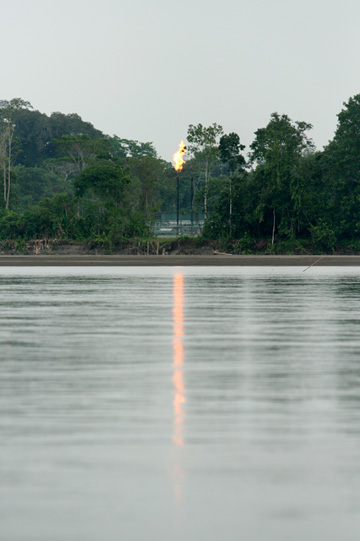 After being found guilty in February of environmental harm and ordered to pay $8.6 billion in an Ecuador court of law, Chevron this week faced another trial: this time by shareholders in its Annual General Meeting in California. While Chevron has appealed the Ecuador case and a US court has put an injunction barring the […]
After being found guilty in February of environmental harm and ordered to pay $8.6 billion in an Ecuador court of law, Chevron this week faced another trial: this time by shareholders in its Annual General Meeting in California. While Chevron has appealed the Ecuador case and a US court has put an injunction barring the […]
Beaver dam lessens impact of massive oil spill in Canada
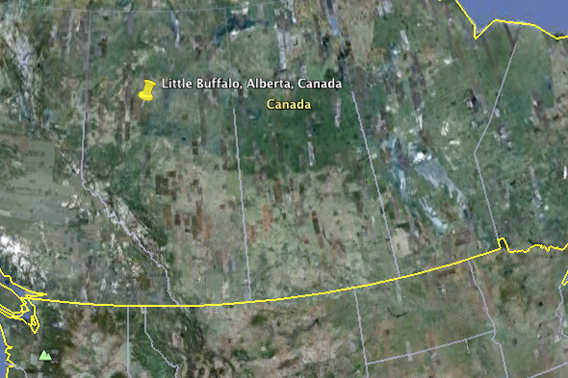 Google Earth view of location of Little Buffalo, Alberta near site of oil spill. Yellow line is the Canadian border with the US. The Canadian province of Alberta has suffered its worst oil spill in 35 years with 28,000 barrels of oil (over a million gallons) spilling from a ruptured pipeline operated by Plains Midstream […]
Google Earth view of location of Little Buffalo, Alberta near site of oil spill. Yellow line is the Canadian border with the US. The Canadian province of Alberta has suffered its worst oil spill in 35 years with 28,000 barrels of oil (over a million gallons) spilling from a ruptured pipeline operated by Plains Midstream […]
The great penguin rescue: far-flung community cooperates, sacrifices to save 4,000 penguins from oil spill
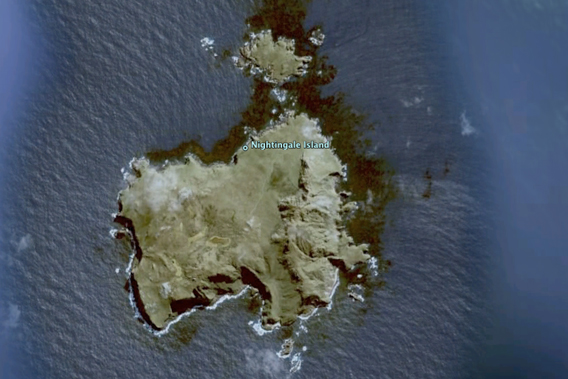 Nightingale Island as viewed from Google Earth. One of the world remotest communities, the UK’s Tristan da Cunha archipelago, has come together to save 4,000 endangered penguins following a devastating oil spill, reports the Guardian . Last month a freighter ran aground on Nightingale Island releasing 1,500 tons of oil, potentially devastating the local population […]
Nightingale Island as viewed from Google Earth. One of the world remotest communities, the UK’s Tristan da Cunha archipelago, has come together to save 4,000 endangered penguins following a devastating oil spill, reports the Guardian . Last month a freighter ran aground on Nightingale Island releasing 1,500 tons of oil, potentially devastating the local population […]
Photos: penguins devastated by oil spill
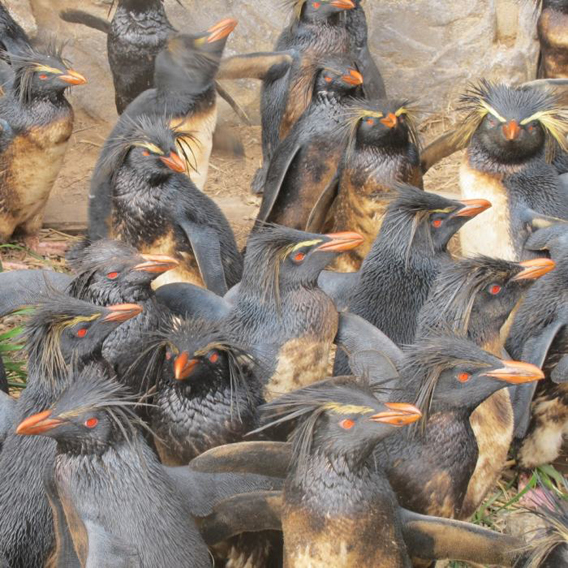 Northern rockhopper penguins covered in oil. Photo by: Tristan Conservation Team of Simon Glass, Wayne Swain and Matthew Green. Courtesy of: The Tristan da Cunha Website. Disturbing photos show northern rockhopper penguins (Eudyptes moseleyi) hit hard by an oil spill from a wrecked cargo ship on Nightingale Island in the Southern Atlantic. Already listed as […]
Northern rockhopper penguins covered in oil. Photo by: Tristan Conservation Team of Simon Glass, Wayne Swain and Matthew Green. Courtesy of: The Tristan da Cunha Website. Disturbing photos show northern rockhopper penguins (Eudyptes moseleyi) hit hard by an oil spill from a wrecked cargo ship on Nightingale Island in the Southern Atlantic. Already listed as […]
US approves first deepwater drilling in Gulf since BP disaster as oil tar balls reappear on coast
 Yesterday the US Bureau of Ocean Energy Management, Regulation and Enforcement awarded Royal Dutch Shell PLC the first deep-water exploration permit since the BP disaster last year, which sent some 4.9 million barrels of oil and up to 500,000 tons of methane into the Gulf of Mexico over three months. “Shell’s submission has satisfied the […]
Yesterday the US Bureau of Ocean Energy Management, Regulation and Enforcement awarded Royal Dutch Shell PLC the first deep-water exploration permit since the BP disaster last year, which sent some 4.9 million barrels of oil and up to 500,000 tons of methane into the Gulf of Mexico over three months. “Shell’s submission has satisfied the […]
Hundreds of endangered penguins covered in oil after remote spill
 Nightingale Island as viewed from Google Earth. Conservation workers have found hundreds of oiled northern rockhopper penguins (Eudyptes moseleyi) after a cargo vessel wrecked on Nightingale Island, apart of the UK’s Tristan da Cunha archipelago. Northern rockhopper penguins are listed as Endangered by the IUCN Red List. According to a press release by BirdLife International, […]
Nightingale Island as viewed from Google Earth. Conservation workers have found hundreds of oiled northern rockhopper penguins (Eudyptes moseleyi) after a cargo vessel wrecked on Nightingale Island, apart of the UK’s Tristan da Cunha archipelago. Northern rockhopper penguins are listed as Endangered by the IUCN Red List. According to a press release by BirdLife International, […]
Report: 90 oil spills in Peruvian Amazon over 3 years
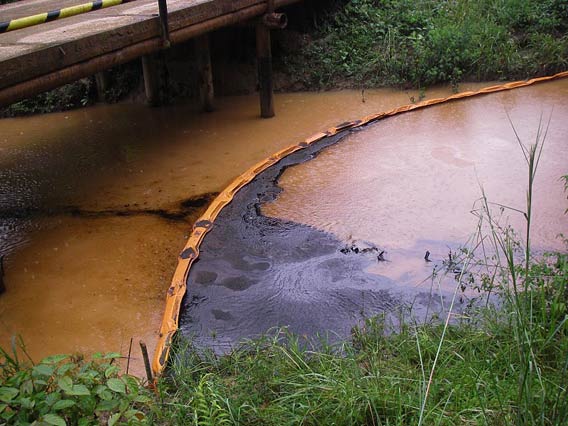 An oil spill flows down Chuuntsa Creek in Oil Block 1-AB. Photo courtesy of: Amazon Watch. A new report has uncovered 90 oil spills by Pluspetrol in northern Peru’s Amazon rainforest over the past 3 years. Covering two oil blocs—1-AB and 8—the report, complied by the Federation of Indigenous Communities of the Corrientes River (FECONACO), […]
An oil spill flows down Chuuntsa Creek in Oil Block 1-AB. Photo courtesy of: Amazon Watch. A new report has uncovered 90 oil spills by Pluspetrol in northern Peru’s Amazon rainforest over the past 3 years. Covering two oil blocs—1-AB and 8—the report, complied by the Federation of Indigenous Communities of the Corrientes River (FECONACO), […]
Dead baby dolphins washing ashore in Gulf of Mexico
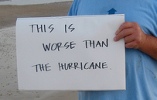 Every year a few baby dolphins in the Gulf don’t make it and are found on the shores of the Gulf, but this year something is different. To date, 24 baby dolphins have been found dead in Alabama and Georgia, some are stillborn, others aborted fetuses. Researchers, who say death-toll is ten times the average, […]
Every year a few baby dolphins in the Gulf don’t make it and are found on the shores of the Gulf, but this year something is different. To date, 24 baby dolphins have been found dead in Alabama and Georgia, some are stillborn, others aborted fetuses. Researchers, who say death-toll is ten times the average, […]
Gulf of Mexico bottom still coated in oil, recovery long way off
 Samantha Joye of the University of Georgia has seen the bottom of the Gulf of Mexico and the view wasn’t pretty. Speaking at the American Association for the Advancement of Science, Joye told the conference that she found places where oil lay on the Gulf floor nearly 4 inches (10 centimeters) thick. Joye’s findings contradict […]
Samantha Joye of the University of Georgia has seen the bottom of the Gulf of Mexico and the view wasn’t pretty. Speaking at the American Association for the Advancement of Science, Joye told the conference that she found places where oil lay on the Gulf floor nearly 4 inches (10 centimeters) thick. Joye’s findings contradict […]
Chevron found guilty, ordered to pay $8.2 billion in epic oil contamination fight
 It was the environmental legal battle that some believed would never end (and they may still be right). But today in Lago Agrio, Ecuador, after 18 years of an often-dramatic court case, Chevron was found guilty of environmental harm and ordered to pay $8.2 billion in damages, however the oil giant says it will appeal […]
It was the environmental legal battle that some believed would never end (and they may still be right). But today in Lago Agrio, Ecuador, after 18 years of an often-dramatic court case, Chevron was found guilty of environmental harm and ordered to pay $8.2 billion in damages, however the oil giant says it will appeal […]
The ocean crisis: hope in troubled waters, an interview with Carl Safina
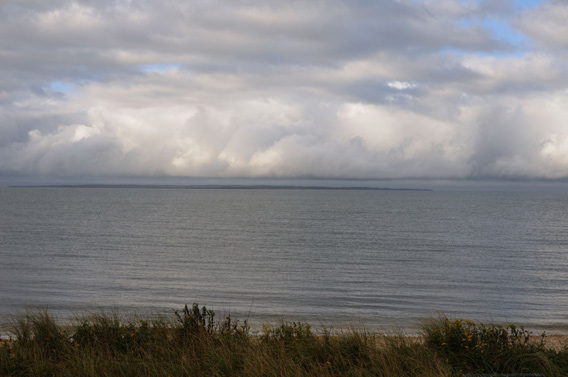 The view from Lazy Point. Photo courtesy of Carl Safina. Being compared—by more than one reviewer—to Henry Thoreau and Rachel Carson would make any nature writer’s day. But add in effusive reviews that compare one to a jazz musician, Ernest Hemingway, and Charles Darwin, and you have a sense of the praise heaped on Carl […]
The view from Lazy Point. Photo courtesy of Carl Safina. Being compared—by more than one reviewer—to Henry Thoreau and Rachel Carson would make any nature writer’s day. But add in effusive reviews that compare one to a jazz musician, Ernest Hemingway, and Charles Darwin, and you have a sense of the praise heaped on Carl […]
New Zealand: Can you sink a rainbow?
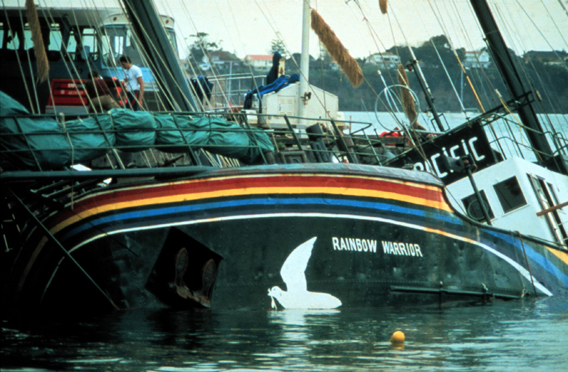 25 years on from Greenpeace’s joint stand with New Zealand’s government against potentially environmentally devastating practices, the country is at a Crossroads The Rainbow Warrior after the bombing by French commandos. Image courtesy of Greenpeace In light of the subject of this article, condolences go out to the families of the 29 miners who died […]
25 years on from Greenpeace’s joint stand with New Zealand’s government against potentially environmentally devastating practices, the country is at a Crossroads The Rainbow Warrior after the bombing by French commandos. Image courtesy of Greenpeace In light of the subject of this article, condolences go out to the families of the 29 miners who died […]
Top 10 Environmental Stories of 2010
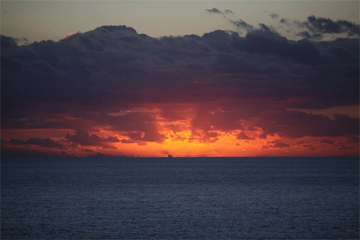 Below is a quick review of some of the biggest environmental stories of 2010. Climate change rears it ugly head (Hance) A streak of freak floods in the US, a deadly heat-wave across Central Russia, record drought in the Amazon, deadly floods in Colombia and Venezuela, record highs all over the globe, and a catastrophic […]
Below is a quick review of some of the biggest environmental stories of 2010. Climate change rears it ugly head (Hance) A streak of freak floods in the US, a deadly heat-wave across Central Russia, record drought in the Amazon, deadly floods in Colombia and Venezuela, record highs all over the globe, and a catastrophic […]
Bacteria deep in the Gulf of Mexico consumed oil faster than expected, study finds
 BP’s disastrous oil spill in the Gulf of Mexico this year killed countless marine animals, but it was a boon for oil-eating bacteria. The organisms, usually quiescent deep in the ocean, burst into life when the Deep Water Horizon wellhead ruptured and released a torrent of their favorite food. A study published in the 8 […]
BP’s disastrous oil spill in the Gulf of Mexico this year killed countless marine animals, but it was a boon for oil-eating bacteria. The organisms, usually quiescent deep in the ocean, burst into life when the Deep Water Horizon wellhead ruptured and released a torrent of their favorite food. A study published in the 8 […]
Already Critically Endangered, bluefin tuna hit hard by BP oil disaster
 Using satellite data from the European Space Agency, researchers estimate that over 20% of juvenile Atlantic bluefin tuna in the Gulf of Mexico were killed by the BP oil spill. Although that percentage may not seem catastrophic, the losses are on top of an 82% decline in the overall population over the past three decades […]
Using satellite data from the European Space Agency, researchers estimate that over 20% of juvenile Atlantic bluefin tuna in the Gulf of Mexico were killed by the BP oil spill. Although that percentage may not seem catastrophic, the losses are on top of an 82% decline in the overall population over the past three decades […]
Yasuni on film: could a documentary save the world’s most biodiverse ecosystem?
 An interview with wildlife documentarian Ryan Killackey. How do you save one of the most biologically and culturally diverse places in the world if most people have never heard of it? If you want a big audience—you make a film. This is what wildlife-filmmaker Ryan Killackey is hoping to do with his new movie Yasuni […]
An interview with wildlife documentarian Ryan Killackey. How do you save one of the most biologically and culturally diverse places in the world if most people have never heard of it? If you want a big audience—you make a film. This is what wildlife-filmmaker Ryan Killackey is hoping to do with his new movie Yasuni […]
Massive oil plume discovered in the Gulf
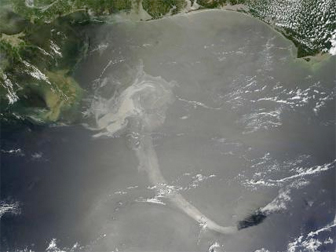 Researchers at the Woods Hole Oceanographic Institution (WHOI) have detected a plume of hydrocarbons that is at least 22 miles long and more than 3,000 feet below the surface of the Gulf of Mexico, a result of the BP Deepwater Horizon oil spill, reports a study published in Science. The 1.2-mile-wide, 650-foot-high plume of trapped […]
Researchers at the Woods Hole Oceanographic Institution (WHOI) have detected a plume of hydrocarbons that is at least 22 miles long and more than 3,000 feet below the surface of the Gulf of Mexico, a result of the BP Deepwater Horizon oil spill, reports a study published in Science. The 1.2-mile-wide, 650-foot-high plume of trapped […]
BP spill officially the worst offshore oil accident
BP’s Gulf of Mexico disaster is officially the worst accidental oil spill on record, U.S. authorities said Monday. Scientists appointed by the Department of Energy now estimate that some 4.9 million barrels or more than 205 million gallons of oil leaked into the Gulf following the blowout of the Deepwater Horizon well on April 20. […]
Visiting the Gulf: how wildlife and people are faring in America’s worst environmental disaster, an interview with Jennifer Jacquet
 “President Obama called it ‘the worst environmental disaster America has ever faced.’ So I thought I should face it and head to the Gulf”—these are the opening words on the popular blog Guilty Planet as the author, marine biologist Jennifer Jacquet, embarked on a ten day trip to Louisiana. As a scientist, Jacquet was, of […]
“President Obama called it ‘the worst environmental disaster America has ever faced.’ So I thought I should face it and head to the Gulf”—these are the opening words on the popular blog Guilty Planet as the author, marine biologist Jennifer Jacquet, embarked on a ten day trip to Louisiana. As a scientist, Jacquet was, of […]
Oil devastates indigenous tribes from the Amazon to the Gulf
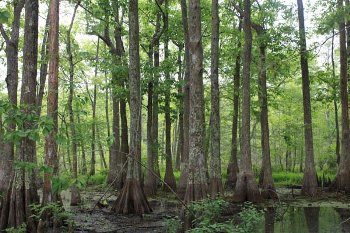 For the past few months, the mainstream media has focused on the environmental and technical dimensions of the Gulf mess. While that’s certainly important, reporters have ignored a crucial aspect of the BP spill: cultural extermination and the plight of indigenous peoples. Recently, the issue was highlighted when Louisiana Gulf residents in the town of […]
For the past few months, the mainstream media has focused on the environmental and technical dimensions of the Gulf mess. While that’s certainly important, reporters have ignored a crucial aspect of the BP spill: cultural extermination and the plight of indigenous peoples. Recently, the issue was highlighted when Louisiana Gulf residents in the town of […]
Who’s really accountable for the BP oil spill?
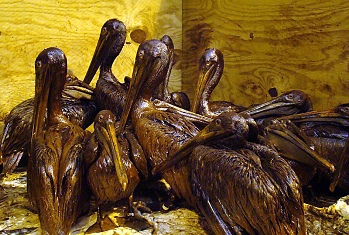 Reading articles in the newspapers recently and online, I find the media’s focus is on scrutinizing BP’s way of paying for the damage done when an estimated 76,934,000 gallons of their oil leaked out into the Gulf of Mexico after the explosion of their Deepwater Horizon rig in April. It is not that they are […]
Reading articles in the newspapers recently and online, I find the media’s focus is on scrutinizing BP’s way of paying for the damage done when an estimated 76,934,000 gallons of their oil leaked out into the Gulf of Mexico after the explosion of their Deepwater Horizon rig in April. It is not that they are […]
The growing impacts of China’s oil spill
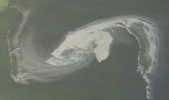 Two oil pipelines exploded Friday in the Chinese province of Liaoning beginning China’s worst oil spill; nearly a week later 400,000 gallons of oil have spread over 166 square miles, according to China’s state media. The pipeline has since been fixed and is operating again. While the spill is small compared to the BP oil […]
Two oil pipelines exploded Friday in the Chinese province of Liaoning beginning China’s worst oil spill; nearly a week later 400,000 gallons of oil have spread over 166 square miles, according to China’s state media. The pipeline has since been fixed and is operating again. While the spill is small compared to the BP oil […]
Oil disaster threatens Gulf of Mexico’s deep water titans
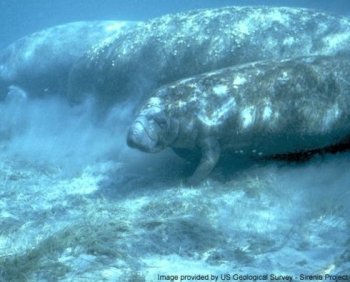 As I discovered in the course of researching my book, No Rain in the Amazon: How South America’s Climate Change Affects the Entire Planet (Palgrave, 2010), the oil industry has had a poor record when it comes to protecting aquatic sea life. Take for example the manatee, which has been put at risk from the […]
As I discovered in the course of researching my book, No Rain in the Amazon: How South America’s Climate Change Affects the Entire Planet (Palgrave, 2010), the oil industry has had a poor record when it comes to protecting aquatic sea life. Take for example the manatee, which has been put at risk from the […]
Goodbye to the Gulf: oil disaster hits region’s ‘primary production’
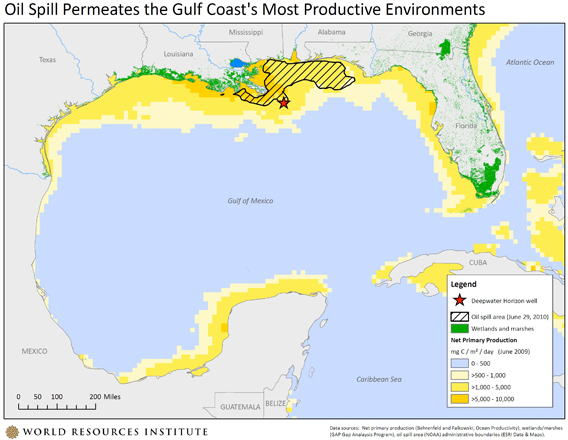 Oil disaster could cripple the Gulf’s ecosystem services. According to a new analysis by the World Resources Institute (WRI), the many ecosystem services provided by the Gulf of Mexico will be severely impacted by BP’s giant oil spill. ‘Ecosystem services’ are the name given by scientists and experts to free benefits provided by intact ecosystems, […]
Oil disaster could cripple the Gulf’s ecosystem services. According to a new analysis by the World Resources Institute (WRI), the many ecosystem services provided by the Gulf of Mexico will be severely impacted by BP’s giant oil spill. ‘Ecosystem services’ are the name given by scientists and experts to free benefits provided by intact ecosystems, […]
Methane and Climate Change: From the Amazon to the Gulf of Mexico
In surveying the environmental damage unleashed from the BP oil spill, could we be missing the 800-pound gorilla in the closet? While oil poses undeniable ecological risks, methane (CH4) could prove daunting as well. As it turns out, crude which is destroying the Gulf of Mexico contains about 40 percent methane which may suffocate marine […]
Spill may be 40,000 barrels per day
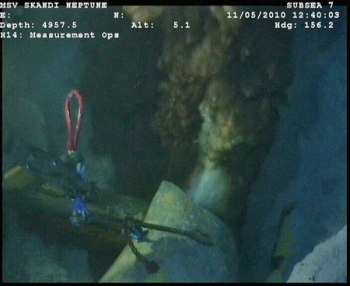 The amount of oil spilling into the Gulf of Mexico from the blown-out Deepwater Horizon well may be 40,000 barrels, well above the official government estimate of 12,000 and 19,000 barrels a day, according to an official with the U.S. Geological Survey. Marcia McNutt, director of the U.S. Geological Survey, said that based on new […]
The amount of oil spilling into the Gulf of Mexico from the blown-out Deepwater Horizon well may be 40,000 barrels, well above the official government estimate of 12,000 and 19,000 barrels a day, according to an official with the U.S. Geological Survey. Marcia McNutt, director of the U.S. Geological Survey, said that based on new […]
The penguin crisis: over 60 percent of the world’s penguins threatened with extinction
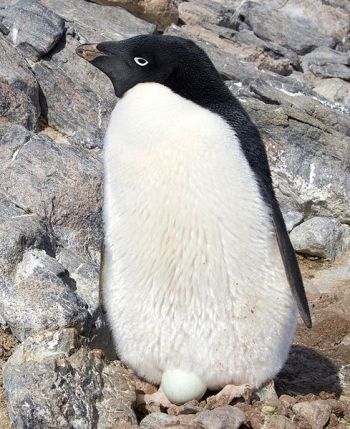 Everyone loves penguins. With their characteristic black-and-white ‘tuxedo’ markings, upright waddle, and childlike stature, penguins seem at once exotic and familiar: exotic because they live far from most human habitations, familiar because they appear in innumerable books and movies. From Mr. Popper’s Penguins to Happy Feet, and from March of the Penguins to And Tango […]
Everyone loves penguins. With their characteristic black-and-white ‘tuxedo’ markings, upright waddle, and childlike stature, penguins seem at once exotic and familiar: exotic because they live far from most human habitations, familiar because they appear in innumerable books and movies. From Mr. Popper’s Penguins to Happy Feet, and from March of the Penguins to And Tango […]
Will we ever know the full wildlife toll of the BP oil spill?
 Will we ever know the full wildlife toll of the BP oil spill? The short answer: no. The gruesome photos that are making the media rounds over the last week of oiled birds, fish, and crustaceans are according to experts only a small symbol of the ecological catastrophe that is likely occurring both in shallow […]
Will we ever know the full wildlife toll of the BP oil spill? The short answer: no. The gruesome photos that are making the media rounds over the last week of oiled birds, fish, and crustaceans are according to experts only a small symbol of the ecological catastrophe that is likely occurring both in shallow […]
As Mangroves Die from Oil, U.S. Public Yawns
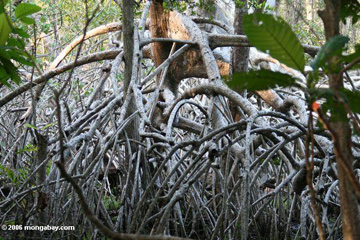 What if, instead of a nasty oil disaster in the Gulf of Mexico, the U.S. public was now confronted with a natural catastrophe in the Grand Canyon or in California Redwood forests? Within the popular imagination, certain types of ecosystems elicit more sympathy than others, and very low on the totem pole are mangrove forests. […]
What if, instead of a nasty oil disaster in the Gulf of Mexico, the U.S. public was now confronted with a natural catastrophe in the Grand Canyon or in California Redwood forests? Within the popular imagination, certain types of ecosystems elicit more sympathy than others, and very low on the totem pole are mangrove forests. […]
The Gulf oil spill in context: US oil consumption
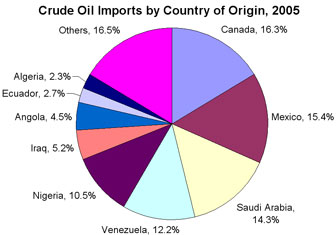 The US government has now confirmed that the oil spill in the Gulf of Mexico is the United States’ largest oil spill and perhaps the nation’s worst environmental disaster. While poor government oversight and negligence by oil giant BP certainly contributed to the disaster, the fact that the US is drilling over a mile below […]
The US government has now confirmed that the oil spill in the Gulf of Mexico is the United States’ largest oil spill and perhaps the nation’s worst environmental disaster. While poor government oversight and negligence by oil giant BP certainly contributed to the disaster, the fact that the US is drilling over a mile below […]
BP fails to stop oil spill
 BP has failed to stop oil gushing from over a mile below the surface in the Gulf of Mexico. The oil spill, which has been confirmed as the worst in American history, has spread between 504,000 to 798,000 gallons of crude oil per day into one of America’s most important marine ecosystems. BP abandoned its […]
BP has failed to stop oil gushing from over a mile below the surface in the Gulf of Mexico. The oil spill, which has been confirmed as the worst in American history, has spread between 504,000 to 798,000 gallons of crude oil per day into one of America’s most important marine ecosystems. BP abandoned its […]
Left Must Fine Tune Its Position on Cuba Embargo in Light of Oil Spill
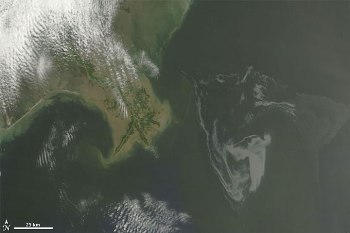 With no end in sight to the environmental catastrophe in the Gulf of Mexico, some may wonder whether BP’s spill could become truly international in scope. That, at least, is the fear in Cuba where people are worried that strong currents could carry the slick to pristine white beaches along the island’s northern coast. In […]
With no end in sight to the environmental catastrophe in the Gulf of Mexico, some may wonder whether BP’s spill could become truly international in scope. That, at least, is the fear in Cuba where people are worried that strong currents could carry the slick to pristine white beaches along the island’s northern coast. In […]
Researchers begin studying long-term effects of oil spill on marine life
 As a White House official today announced that the oil spill in the Gulf of Mexico is the worst in US history—surpassing even the Exxon Valdez spill in Alaska in 1989 (which is still affecting the area today)—marine biologist are beginning to prepare studies to monitor how the spill will impact the gulf in the […]
As a White House official today announced that the oil spill in the Gulf of Mexico is the worst in US history—surpassing even the Exxon Valdez spill in Alaska in 1989 (which is still affecting the area today)—marine biologist are beginning to prepare studies to monitor how the spill will impact the gulf in the […]
BP and the Perilous Voyage of Bama the Manatee
 To the degree that Americans are paying attention to the environmental plight of marine wildlife in the Gulf of Mexico, they may focus most upon dolphins and whales. However, the U.S. public is much less familiar with another marine mammal, the manatee, which could also be placed in jeopardy as a result of the BP […]
To the degree that Americans are paying attention to the environmental plight of marine wildlife in the Gulf of Mexico, they may focus most upon dolphins and whales. However, the U.S. public is much less familiar with another marine mammal, the manatee, which could also be placed in jeopardy as a result of the BP […]
NASA image reveals new oil trail hundreds of kilometers long in the Gulf
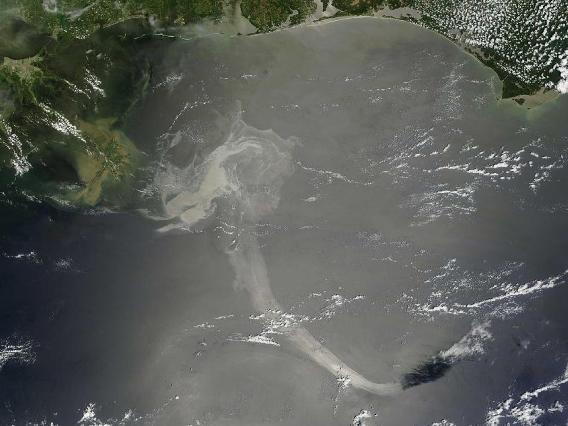 A new NASA image of the Gulf oil spill shows a trail of oil extending hundreds of kilometers south and then southeast from the spill. At points this new oil trail is at least twenty kilometers wide. Media groups are saying the new arm may be additional proof that oil has been caught up in […]
A new NASA image of the Gulf oil spill shows a trail of oil extending hundreds of kilometers south and then southeast from the spill. At points this new oil trail is at least twenty kilometers wide. Media groups are saying the new arm may be additional proof that oil has been caught up in […]
Spill may be spreading: tar balls wash up in the Florida Keys
 Florida had an unwelcome visitor today as tar balls washed on shore at Fort Zachary State Park in Key West, reports Reuters. Local officials fear the tar balls—small blobs of oil—originated from the Gulf oil spill caused after the Deepwater Horizon offshore oil rig run by BP exploded, killing eleven. If tests determine that tar […]
Florida had an unwelcome visitor today as tar balls washed on shore at Fort Zachary State Park in Key West, reports Reuters. Local officials fear the tar balls—small blobs of oil—originated from the Gulf oil spill caused after the Deepwater Horizon offshore oil rig run by BP exploded, killing eleven. If tests determine that tar […]
Wildlife death toll from BP oil spill likely includes dolphins
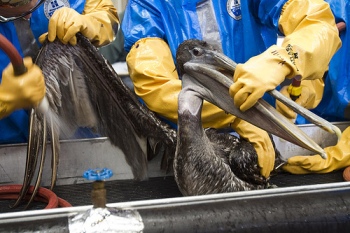 The oil spill in the Gulf of Mexico is taking its toll on the region’s wildlife: brown pelicans, sea turtles, several species of fish, and now dolphins have been found dead. The National Marine Fisheries Service reported today finding six dead dolphins in Louisiana, Mississippi, and Alabama since May 2nd. Officials are saying the deaths […]
The oil spill in the Gulf of Mexico is taking its toll on the region’s wildlife: brown pelicans, sea turtles, several species of fish, and now dolphins have been found dead. The National Marine Fisheries Service reported today finding six dead dolphins in Louisiana, Mississippi, and Alabama since May 2nd. Officials are saying the deaths […]
Who’s to blame for the oil spill?
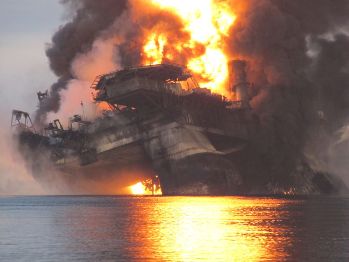 Why we get the oil spill we deserve. America, we deserve the oil spill now threatening the beautiful coast of Louisiana. This disaster is not natural, like the earthquake that devastated Haiti or tsunami that swept Southeast Asia in 2006; this disaster is man-made, American-made in fact, pure and simple. So, while in the upcoming […]
Why we get the oil spill we deserve. America, we deserve the oil spill now threatening the beautiful coast of Louisiana. This disaster is not natural, like the earthquake that devastated Haiti or tsunami that swept Southeast Asia in 2006; this disaster is man-made, American-made in fact, pure and simple. So, while in the upcoming […]
Gulf oil spill could impact non-coastal songbirds
Even though they don’t stop over in the Gulf of Mexico, many migrating songbirds could be impacted by the catastrophic oil spill in the area, warns the American Bird Conservancy (ABC). The threats to marine and coastal birds have been well-outlined during the past few days, however birds flying high above the spill could also […]
Oil spill in Gulf of Mexico heading towards full-scale environmental disaster
 With the news that the amount of oil leaking from below the surface of the Gulf of Mexico could be as much as five times the original estimate put forward by British oil-giant BP, the situation moved from worrisome to desperate. It is now believed that the 5,000 barrels of oil (210,000 gallons) are leaking […]
With the news that the amount of oil leaking from below the surface of the Gulf of Mexico could be as much as five times the original estimate put forward by British oil-giant BP, the situation moved from worrisome to desperate. It is now believed that the 5,000 barrels of oil (210,000 gallons) are leaking […]
After oil rig explosion, leaking crude threatens Gulf of Mexico
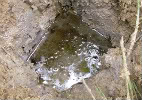 Just weeks after a Chinese coal barge rammed the Great Barrier Reef, cutting a nearly two-mile swath through the reef and spilling three tons of engine fuel, fragile marine ecosystems are again threatened. Last Tuesday a BP oil rig platform exploded in the Gulf of Mexico, likely killing eleven workers. The blast also left oil […]
Just weeks after a Chinese coal barge rammed the Great Barrier Reef, cutting a nearly two-mile swath through the reef and spilling three tons of engine fuel, fragile marine ecosystems are again threatened. Last Tuesday a BP oil rig platform exploded in the Gulf of Mexico, likely killing eleven workers. The blast also left oil […]
Falklands Dispute: Argentine Sovereignty Won’t Solve the Problem
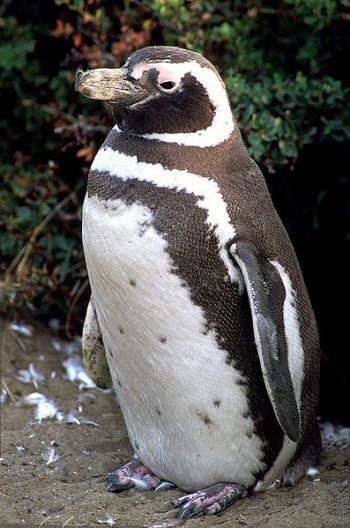 With Britain now moving to explore for oil and gas in the Falkland Islands, Argentina has cried foul. Buenos Aires claims that the Falklands, or the Malvinas as Argentines refer to the islands, represent a “colonial enclave” in the south Atlantic. The islands have been a British possession since 1833, and the local inhabitants consider […]
With Britain now moving to explore for oil and gas in the Falkland Islands, Argentina has cried foul. Buenos Aires claims that the Falklands, or the Malvinas as Argentines refer to the islands, represent a “colonial enclave” in the south Atlantic. The islands have been a British possession since 1833, and the local inhabitants consider […]
Oil spill off Australia potential ‘disaster’ for marine wildlife
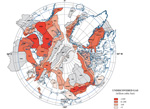
Twenty years on, some birds still haven’t recovered from Exxon Valdez oil spill
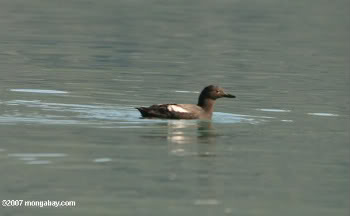 Twenty years ago today—at 12:04 AM on March 24th, 1989—the Exxon Valdez tanker struck Bligh reef in Prince William Sound causing 10.8 million gallons of crude oil to spill into the sea. The spill decimated the ecosystem and wildlife for 11,000 square miles and became one of the world’s most infamous oil spills. Twenty years […]
Twenty years ago today—at 12:04 AM on March 24th, 1989—the Exxon Valdez tanker struck Bligh reef in Prince William Sound causing 10.8 million gallons of crude oil to spill into the sea. The spill decimated the ecosystem and wildlife for 11,000 square miles and became one of the world’s most infamous oil spills. Twenty years […]
14,000-barrel oil spill in the Ecuadorean Amazon
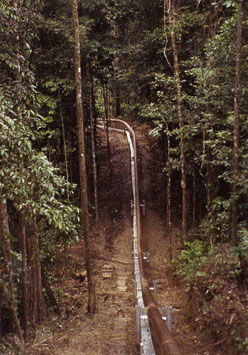
Feeds: news | india | latam | brasil | indonesia
 Below are summaries of the most popular stories by our Spanish language service, Mongabay Latam, from the week of May 21-27. Among the top articles: deforestation is clearing the tiny habitat of Colombia’s Caquetá titi monkey. In other news, a court gives Peru’s health ministry 30 days for an emergency health plan for communities affected […]
Below are summaries of the most popular stories by our Spanish language service, Mongabay Latam, from the week of May 21-27. Among the top articles: deforestation is clearing the tiny habitat of Colombia’s Caquetá titi monkey. In other news, a court gives Peru’s health ministry 30 days for an emergency health plan for communities affected […] These are the most popular stories at Mongabay Latam from April 2 – 8. The oil spill in Colombia is an ongoing environmental disaster. The search for the causes of the tragedy and the work to save affected animals were the most read stories of the week. The image above, a spectacular vista of the […]
These are the most popular stories at Mongabay Latam from April 2 – 8. The oil spill in Colombia is an ongoing environmental disaster. The search for the causes of the tragedy and the work to save affected animals were the most read stories of the week. The image above, a spectacular vista of the […] Belize’s Great Blue Hole, part of a UNESCO World Heritage Site that would be included in areas opened to oil and gas drilling under a new proposal from the Belizean government. Photo credit: U.S. Geological Survey. The government of Belize has proposed opening up most of the country’s marine area, including seven areas comprising a […]
Belize’s Great Blue Hole, part of a UNESCO World Heritage Site that would be included in areas opened to oil and gas drilling under a new proposal from the Belizean government. Photo credit: U.S. Geological Survey. The government of Belize has proposed opening up most of the country’s marine area, including seven areas comprising a […] An aerial view of part of the spill on Wednesday, May 20, 2015. Photo credit: Refugio Response Information website. On Tuesday, an underground oil pipeline burst near Goleta, California, spilling crude oil into the Pacific, soiling beaches, killing marine animals, and coating birds in oil. Whales and sea lions were spotted in the spill area, […]
An aerial view of part of the spill on Wednesday, May 20, 2015. Photo credit: Refugio Response Information website. On Tuesday, an underground oil pipeline burst near Goleta, California, spilling crude oil into the Pacific, soiling beaches, killing marine animals, and coating birds in oil. Whales and sea lions were spotted in the spill area, […] Chukchi, where the proposed exporatory drilling is to take place, is home to about 2,000 polar bears. The species is currently declining as global warming melts the sea ice on which it depends. Photo by Arturo de Frias Marques. Earlier this week, the Bureau of Ocean Energy Management (BOEM) approved Shell Gulf of Mexico Inc.’s […]
Chukchi, where the proposed exporatory drilling is to take place, is home to about 2,000 polar bears. The species is currently declining as global warming melts the sea ice on which it depends. Photo by Arturo de Frias Marques. Earlier this week, the Bureau of Ocean Energy Management (BOEM) approved Shell Gulf of Mexico Inc.’s […] CUNINICO, Peru–Villager examine oil slick near this Kukama Indian village in the northeastern Peruvian Amazon. Photo by Barbara Fraser. CUNINICO, Peru—When Peru’s state-run oil company pulled out of this small Kukama Indian village in mid-December after cleaning up an oil pipeline spill, residents thought life could slowly return to normal. But more than three months […]
CUNINICO, Peru–Villager examine oil slick near this Kukama Indian village in the northeastern Peruvian Amazon. Photo by Barbara Fraser. CUNINICO, Peru—When Peru’s state-run oil company pulled out of this small Kukama Indian village in mid-December after cleaning up an oil pipeline spill, residents thought life could slowly return to normal. But more than three months […] Emergency research finds devastating impacts of oil spill in the world’s largest mangrove forest A crocodile wades into oil-tainted waters in the Sundarbans. Photo by: Arati Kumar-Rao. Last month, an estimated 350,000 liters of fuel oil spilled into the Sundarbans delta on the Bay of Bengal. An oil tanker that had collided with a cargo […]
Emergency research finds devastating impacts of oil spill in the world’s largest mangrove forest A crocodile wades into oil-tainted waters in the Sundarbans. Photo by: Arati Kumar-Rao. Last month, an estimated 350,000 liters of fuel oil spilled into the Sundarbans delta on the Bay of Bengal. An oil tanker that had collided with a cargo […] The most important environmental and wildlife stories from the last year Also see our Top 10 HAPPY Environmental Stories of 2014 1. The Year of Zero Deforestation Pledges: In 2014, the unimaginable happened: companies representing the majority of palm oil production and trade agreed to stop cutting down rainforests and draining peatlands for new oil […]
The most important environmental and wildlife stories from the last year Also see our Top 10 HAPPY Environmental Stories of 2014 1. The Year of Zero Deforestation Pledges: In 2014, the unimaginable happened: companies representing the majority of palm oil production and trade agreed to stop cutting down rainforests and draining peatlands for new oil […] Bangladesh struggles to deal with devastating oil spill in world’s largest mangrove forest, home to dolphins and tigers Government inaction has pushed local children and families to attempt to clean up the oil spill with little more than household items and no protective gear. Photo by: Kallol Mustafa. On December 9th, a tanker slammed into […]
Bangladesh struggles to deal with devastating oil spill in world’s largest mangrove forest, home to dolphins and tigers Government inaction has pushed local children and families to attempt to clean up the oil spill with little more than household items and no protective gear. Photo by: Kallol Mustafa. On December 9th, a tanker slammed into […] A controlled burning of Macondo well oil from the Deepwater Horizon disaster that rose to the ocean surface. [Credit: David Valentine] Images from the 2010 Deepwater Horizon disaster endure, from the collapsing platform to oil-fouled coastline. But beneath the surface is a story photographers cannot as easily capture. Two days after the April 20, 2010 […]
A controlled burning of Macondo well oil from the Deepwater Horizon disaster that rose to the ocean surface. [Credit: David Valentine] Images from the 2010 Deepwater Horizon disaster endure, from the collapsing platform to oil-fouled coastline. But beneath the surface is a story photographers cannot as easily capture. Two days after the April 20, 2010 […] The spill site in Cuninico, Peru. Courtesy of Google Earth. A ruptured pipeline that spilled tens of thousands of gallons of crude oil into the Marañón River in late June is fueling concerns about potential health impacts for a small indigenous community, reports Environmental Health News. According to a story published last week, an 845-kilometer […]
The spill site in Cuninico, Peru. Courtesy of Google Earth. A ruptured pipeline that spilled tens of thousands of gallons of crude oil into the Marañón River in late June is fueling concerns about potential health impacts for a small indigenous community, reports Environmental Health News. According to a story published last week, an 845-kilometer […] Scientists analyzed almost half a million fish bones to shed light on the population history of Pacific herring (Clupea pallasii) in the North Pacific Ocean. Their paper, published in the journal Proceedings of the National Academy of Sciences (PNAS) reveals a decline of unprecedented scale. It suggests that while the abundance of Pacific herring does […]
Scientists analyzed almost half a million fish bones to shed light on the population history of Pacific herring (Clupea pallasii) in the North Pacific Ocean. Their paper, published in the journal Proceedings of the National Academy of Sciences (PNAS) reveals a decline of unprecedented scale. It suggests that while the abundance of Pacific herring does […] Facing plunging profits, Royal Dutch Shell has announced it will cut exploration and development funding by nearly $10 billion this year, including halting their long-suffering plans to drill in the Arctic ocean. Shell’s new CEO, Ben van Beurden, made the announcement yesterday that controversial plans to drill off the Alaskan coast will be put on […]
Facing plunging profits, Royal Dutch Shell has announced it will cut exploration and development funding by nearly $10 billion this year, including halting their long-suffering plans to drill in the Arctic ocean. Shell’s new CEO, Ben van Beurden, made the announcement yesterday that controversial plans to drill off the Alaskan coast will be put on […] On December 17th, officials first discovered a massive oil spill in the Caribbean-island nation of Trinidad and Tobago. Since then, a series of oil spills have been discovered, coating beaches, sullying mangrove forests, and very likely decimating wildlife in Trinidad’s Gulf of Paria. The oil spills have been linked to the state-owned oil company, Petrotrin, […]
On December 17th, officials first discovered a massive oil spill in the Caribbean-island nation of Trinidad and Tobago. Since then, a series of oil spills have been discovered, coating beaches, sullying mangrove forests, and very likely decimating wildlife in Trinidad’s Gulf of Paria. The oil spills have been linked to the state-owned oil company, Petrotrin, […] Oil has begun to be pumped from the Arctic seabed, according to Russian oil giant, Gazprom. The company announced on Friday that it has begun exploiting oil reserves at the offshore field of Prirazlomnoye. The project, which is several years behind schedule, is hugely controversial and made international headlines in September after Russian military arrested […]
Oil has begun to be pumped from the Arctic seabed, according to Russian oil giant, Gazprom. The company announced on Friday that it has begun exploiting oil reserves at the offshore field of Prirazlomnoye. The project, which is several years behind schedule, is hugely controversial and made international headlines in September after Russian military arrested […] Lago Agrio oil field in Ecuador. Image adapted from Bing Maps Indigenous plaintiffs in a long-running legal dispute against Chevron won the right to pursue the oil giant’s assets in Canada as part of a $9.5 billion judgement by an Ecuadorean court over damages in the Amazon, reports Amazon Watch. On Tuesday Ontario’s Court of […]
Lago Agrio oil field in Ecuador. Image adapted from Bing Maps Indigenous plaintiffs in a long-running legal dispute against Chevron won the right to pursue the oil giant’s assets in Canada as part of a $9.5 billion judgement by an Ecuadorean court over damages in the Amazon, reports Amazon Watch. On Tuesday Ontario’s Court of […] The catastrophic explosion that spewed some five million barrels of oil deep into the Gulf of Mexico in April 2010 will take a heavy toll in the ocean’s lowest layers for years to come. That’s the stark conclusion of seafloor research conducted six months after the Deepwater Horizon oil spill. The study, published on August […]
The catastrophic explosion that spewed some five million barrels of oil deep into the Gulf of Mexico in April 2010 will take a heavy toll in the ocean’s lowest layers for years to come. That’s the stark conclusion of seafloor research conducted six months after the Deepwater Horizon oil spill. The study, published on August […] Everyone knows the tiger, the panda, the blue whale, but what about the other five to thirty million species estimated to inhabit our Earth? Many of these marvelous, stunning, and rare species have received little attention from the media, conservation groups, and the public. This series is an attempt to give these ‘forgotten species‘ some […]
Everyone knows the tiger, the panda, the blue whale, but what about the other five to thirty million species estimated to inhabit our Earth? Many of these marvelous, stunning, and rare species have received little attention from the media, conservation groups, and the public. This series is an attempt to give these ‘forgotten species‘ some […] On May 31st, a landslide ruptured an oil pipeline in Ecuadorean Amazon, sending around 11,000 barrels of oil ( 420,000 gallons) into the Coca River. The oil pollution has since moved into the larger Napo River, which borders Yasuni National Park, and is currently heading downstream into Peru and Brazil. The spill has occurred in […]
On May 31st, a landslide ruptured an oil pipeline in Ecuadorean Amazon, sending around 11,000 barrels of oil ( 420,000 gallons) into the Coca River. The oil pollution has since moved into the larger Napo River, which borders Yasuni National Park, and is currently heading downstream into Peru and Brazil. The spill has occurred in […] Efforts to expand production from the Alberta tar sands suffered a significant setback on Friday when the provincial government of British Columbia rejected a pipeline project because of environmental shortcomings. In a strongly worded statement, the government of the province said it was not satisfied with the pipeline company’s oil spill response plans. The rejection […]
Efforts to expand production from the Alberta tar sands suffered a significant setback on Friday when the provincial government of British Columbia rejected a pipeline project because of environmental shortcomings. In a strongly worded statement, the government of the province said it was not satisfied with the pipeline company’s oil spill response plans. The rejection […] Oil extraction in the Amazon rainforest has been linked to severe environmental degradation — including deforestation and pollution — which in some areas has spurred violent social conflict. Yet a vast extent of the Colombian, Peruvian, Ecuadorian, Bolivian, and Brazilian Amazon is currently under concession for oil and gas exploration and production — hundreds of […]
Oil extraction in the Amazon rainforest has been linked to severe environmental degradation — including deforestation and pollution — which in some areas has spurred violent social conflict. Yet a vast extent of the Colombian, Peruvian, Ecuadorian, Bolivian, and Brazilian Amazon is currently under concession for oil and gas exploration and production — hundreds of […] Independent air samples by locals have yielded “a soup of toxic chemicals” in Mayflower, Arkansas where an Exxon Mobil pipeline burst on March 29th spilling some 5,000 barrels of tar sands oil, known as bitumen. Chemicals detected included several linked to cancer, reproductive problems, and neurological impacts such as benzene and ethylbenzene. Air samples were […]
Independent air samples by locals have yielded “a soup of toxic chemicals” in Mayflower, Arkansas where an Exxon Mobil pipeline burst on March 29th spilling some 5,000 barrels of tar sands oil, known as bitumen. Chemicals detected included several linked to cancer, reproductive problems, and neurological impacts such as benzene and ethylbenzene. Air samples were […] Last Saturday, an oil pipeline carrying tar sands oil from Canada ruptured in Mayflower, Arkansas spilling between 3,500-5,000 barrels of crude (at most 210,000 gallons) into neighborhood streets and lawns. Families from 22 homes have been evacuated while clean-up crews have scrambled to contain the spill. ExxonMobil, which runs the 65-year-old Pegasus pipeline, has stated […]
Last Saturday, an oil pipeline carrying tar sands oil from Canada ruptured in Mayflower, Arkansas spilling between 3,500-5,000 barrels of crude (at most 210,000 gallons) into neighborhood streets and lawns. Families from 22 homes have been evacuated while clean-up crews have scrambled to contain the spill. ExxonMobil, which runs the 65-year-old Pegasus pipeline, has stated […] River in the Peruvian Amazon. Photo by: Rhett A. Butler. The Peruvian government has declared an environmental state of emergency after finding elevated levels of lead, barium, and chromium in the Pastaza River in the Amazon jungle, reports the Associated Press. Indigenous peoples in the area have been complaining for decades of widespread contamination from […]
River in the Peruvian Amazon. Photo by: Rhett A. Butler. The Peruvian government has declared an environmental state of emergency after finding elevated levels of lead, barium, and chromium in the Pastaza River in the Amazon jungle, reports the Associated Press. Indigenous peoples in the area have been complaining for decades of widespread contamination from […] Approximate site of preliminarily approved drilling by Shell in the Chukchi Sea. Pink outline is the Arctic National Wildlife Refuge (ANWR). Image made with Google Earth. A coalition of 17 conservation groups are calling on the Obama Administration to suspend offshore oil and gas drilling in the Arctic after Shell’s attempt to drill there has […]
Approximate site of preliminarily approved drilling by Shell in the Chukchi Sea. Pink outline is the Arctic National Wildlife Refuge (ANWR). Image made with Google Earth. A coalition of 17 conservation groups are calling on the Obama Administration to suspend offshore oil and gas drilling in the Arctic after Shell’s attempt to drill there has […] Dawn breaking over Black Creek, Sarstoon Temash National Park. Photo by: Robin Oisín Llewellyn. The Belizean government has approved an application by US Capital Energy to drill exploratory wells for oil in the Sarstoon Temash National Park in southern Belize. The decision is believed to have been taken on November 1st by the National Environmental […]
Dawn breaking over Black Creek, Sarstoon Temash National Park. Photo by: Robin Oisín Llewellyn. The Belizean government has approved an application by US Capital Energy to drill exploratory wells for oil in the Sarstoon Temash National Park in southern Belize. The decision is believed to have been taken on November 1st by the National Environmental […] Ships battle the blaze after the Deepwater Horizon oil rig exploded. Photo by: U.S. Coast Guard. Last week the U.S. federal government fined BP $4.5 billion for the Deepwater Horizon disaster in 2010, which killed 11 workers and leaked nearly 5 million barrels of oil into the Gulf of Mexico. The oil giant also plead […]
Ships battle the blaze after the Deepwater Horizon oil rig exploded. Photo by: U.S. Coast Guard. Last week the U.S. federal government fined BP $4.5 billion for the Deepwater Horizon disaster in 2010, which killed 11 workers and leaked nearly 5 million barrels of oil into the Gulf of Mexico. The oil giant also plead […] This post is an expanded version of an article that appeared in August on Yale e360: Easing The Collateral Damage Fisheries Inflict on Seabirds.
This post is an expanded version of an article that appeared in August on Yale e360: Easing The Collateral Damage Fisheries Inflict on Seabirds. Adelie penguins hunting for food. Photo by: J. Weller. Click to enlarge. Pablo Garcia Borboroglu will be speaking at the Wildlife Conservation Network Expo in San Francisco on October 13th, 2012. Penguins have spent years fooling us. With their image seemingly every where we turn—entertaining us in animated films, awing us in documentaries, and winking […]
Adelie penguins hunting for food. Photo by: J. Weller. Click to enlarge. Pablo Garcia Borboroglu will be speaking at the Wildlife Conservation Network Expo in San Francisco on October 13th, 2012. Penguins have spent years fooling us. With their image seemingly every where we turn—entertaining us in animated films, awing us in documentaries, and winking […] Approximate site of preliminarily approved drilling by Shell in the Chukchi Sea. Pink outline is the Arctic National Wildlife Refuge (ANWR). Image made with Google Earth. Following global protests, a series of embarrassing mishaps, and a lengthy regulatory process, Dutch Royal Shell has announced it is abandoning its hugely controversial off-shore oil drilling in the […]
Approximate site of preliminarily approved drilling by Shell in the Chukchi Sea. Pink outline is the Arctic National Wildlife Refuge (ANWR). Image made with Google Earth. Following global protests, a series of embarrassing mishaps, and a lengthy regulatory process, Dutch Royal Shell has announced it is abandoning its hugely controversial off-shore oil drilling in the […] Approximate site of preliminarily approved drilling by Shell in the Chukchi Sea. Pink outline is the Arctic National Wildlife Refuge (ANWR). Image made with Google Earth. With the approval of the Obama Administration, Royal Dutch Shell began drilling into the ocean floor of the Chukchi Sea off the coast of Alaska yesterday morning. The controversial […]
Approximate site of preliminarily approved drilling by Shell in the Chukchi Sea. Pink outline is the Arctic National Wildlife Refuge (ANWR). Image made with Google Earth. With the approval of the Obama Administration, Royal Dutch Shell began drilling into the ocean floor of the Chukchi Sea off the coast of Alaska yesterday morning. The controversial […] Approximate site of preliminarily approved drilling by Shell in the Chukchi Sea. Pink outline is the Arctic National Wildlife Refuge (ANWR). Image made with Google Earth. In the same week that sea ice in the Arctic Ocean hit another record low due to climate change, the Obama Administration has given final approval to Royal Dutch […]
Approximate site of preliminarily approved drilling by Shell in the Chukchi Sea. Pink outline is the Arctic National Wildlife Refuge (ANWR). Image made with Google Earth. In the same week that sea ice in the Arctic Ocean hit another record low due to climate change, the Obama Administration has given final approval to Royal Dutch […] UPDATE: After failing to slow down Gazprom by occupying its oil rig, Greenpeace is trying a different tact: activists have now attached their boat to a Gazprom passenger vessel preventing workers from reaching the oil rig and forcing an ongoing delay in operations. Kumi Naidoo, head of Greenpeace, scaling a Gazprom oil platform for drilling […]
UPDATE: After failing to slow down Gazprom by occupying its oil rig, Greenpeace is trying a different tact: activists have now attached their boat to a Gazprom passenger vessel preventing workers from reaching the oil rig and forcing an ongoing delay in operations. Kumi Naidoo, head of Greenpeace, scaling a Gazprom oil platform for drilling […] Approximate site of preliminarily approved drilling by Shell in the Chukchi Sea. Pink outline is the Arctic National Wildlife Refuge (ANWR). Image made with Google Earth. The clock is running out for oil giant, Royal Dutch Shell, to drill controversial oil wells in the U.S. Arctic before the harsh winter sets in, reports The Wall […]
Approximate site of preliminarily approved drilling by Shell in the Chukchi Sea. Pink outline is the Arctic National Wildlife Refuge (ANWR). Image made with Google Earth. The clock is running out for oil giant, Royal Dutch Shell, to drill controversial oil wells in the U.S. Arctic before the harsh winter sets in, reports The Wall […] Researcher with dead dolphin calf. Photo courtesy of the University of Central Florida. In the first four months of 2011, 186 bottlenose dolphins (Tursiops truncatus) were found dead in the Gulf of Mexico, nearly half of them dolphin calves many of whom were perinatal, or near birth. Researchers now believe a number of factors may […]
Researcher with dead dolphin calf. Photo courtesy of the University of Central Florida. In the first four months of 2011, 186 bottlenose dolphins (Tursiops truncatus) were found dead in the Gulf of Mexico, nearly half of them dolphin calves many of whom were perinatal, or near birth. Researchers now believe a number of factors may […] Approximate site of exploratory drilling by Shell in the Arctic’s Beaufort Sea. Pink outline is the Arctic National Wildlife Refuge (ANWR). Shell is also hoping to drill in the neighboring Chukchi Sea. Image made with Google Earth. Greenpeace has announced that 20 of its activists, stemming from 13 countries, have locked themselves in an icebreaker […]
Approximate site of exploratory drilling by Shell in the Arctic’s Beaufort Sea. Pink outline is the Arctic National Wildlife Refuge (ANWR). Shell is also hoping to drill in the neighboring Chukchi Sea. Image made with Google Earth. Greenpeace has announced that 20 of its activists, stemming from 13 countries, have locked themselves in an icebreaker […] BP Deepwater Horizon oil spill as seen from space. Photo by: NASA’s Terra Satellite. Two years after the BP-leased Deepwater Horizon drilling rig exploded in the Gulf of Mexico, killing eleven and causing an oil spill that lasted three months, scientists say the impacts on the Gulf ecosystem are only beginning to come to light […]
BP Deepwater Horizon oil spill as seen from space. Photo by: NASA’s Terra Satellite. Two years after the BP-leased Deepwater Horizon drilling rig exploded in the Gulf of Mexico, killing eleven and causing an oil spill that lasted three months, scientists say the impacts on the Gulf ecosystem are only beginning to come to light […] Approximate site of preliminarily approved drilling by Shell. Pink outline is the Arctic National Wildlife Refuge (ANWR). Image made with Google Earth. Last week, the U.S. Department of the Interior approved oil spill clean-up plans by Royal Dutch Shell Oil in the Beaufort Sea, paving the way for offshore oil drilling in the Arctic to […]
Approximate site of preliminarily approved drilling by Shell. Pink outline is the Arctic National Wildlife Refuge (ANWR). Image made with Google Earth. Last week, the U.S. Department of the Interior approved oil spill clean-up plans by Royal Dutch Shell Oil in the Beaufort Sea, paving the way for offshore oil drilling in the Arctic to […] Amazon community on the Rio Corrientes. Photo by: Patrick le Flufy. “Shh, wait here,” Wilson told me. I ducked down behind the buttress of a large tree to wait. We had been walking through the jungle for a few hours. At first we followed a path through the undergrowth, a wet world of ferns, trunks […]
Amazon community on the Rio Corrientes. Photo by: Patrick le Flufy. “Shh, wait here,” Wilson told me. I ducked down behind the buttress of a large tree to wait. We had been walking through the jungle for a few hours. At first we followed a path through the undergrowth, a wet world of ferns, trunks […] Approximate site of preliminarily approved drilling by Shell. Pink outline is the Arctic National Wildlife Refuge (ANWR). Image made with Google Earth. Drilling in the Arctic waters of the U.S. may become as contested an issue as the Keystone Pipeline XL in up-coming months. Scientists, congress members, and ordinary Americans have all come out in […]
Approximate site of preliminarily approved drilling by Shell. Pink outline is the Arctic National Wildlife Refuge (ANWR). Image made with Google Earth. Drilling in the Arctic waters of the U.S. may become as contested an issue as the Keystone Pipeline XL in up-coming months. Scientists, congress members, and ordinary Americans have all come out in […] “History does not crawl, it jumps.”- Nassim Nicholas Taleb “This is an opportunity for greatness which has never been offered to any civilization… in human history before – to act as a generation to do the right thing – and if we fail to receive that opportunity to act on it then my feeling is […]
“History does not crawl, it jumps.”- Nassim Nicholas Taleb “This is an opportunity for greatness which has never been offered to any civilization… in human history before – to act as a generation to do the right thing – and if we fail to receive that opportunity to act on it then my feeling is […] Victories won by activists around the world tops our list of the big environmental stories of the year. In this photo: a young woman is placed in handcuffs and arrested for civil disobedience against the Keystone XL Pipeline in the U.S. In all, 1,252 people were arrested in the two week long action. Photo by: […]
Victories won by activists around the world tops our list of the big environmental stories of the year. In this photo: a young woman is placed in handcuffs and arrested for civil disobedience against the Keystone XL Pipeline in the U.S. In all, 1,252 people were arrested in the two week long action. Photo by: […] Around 12,000 protestors surrounded the White House, some carrying a symbolic pipeline. Photo by: Clayton Conn. One year to the day before the 2012 US election, up to 12,000 activists encircled the White House to protest the Keystone XL pipeline, a proposed 1,700 mile pipeline that would carry oil from Canada’s infamous tar sands to […]
Around 12,000 protestors surrounded the White House, some carrying a symbolic pipeline. Photo by: Clayton Conn. One year to the day before the 2012 US election, up to 12,000 activists encircled the White House to protest the Keystone XL pipeline, a proposed 1,700 mile pipeline that would carry oil from Canada’s infamous tar sands to […] 2011 Veolia Environment Wildlife Photographer of the Year: Still life in oil. Photo by: Daniel Beltra. Fittingly, the winner of the 2011 Veolia Wildlife Environment Photographer of the Year award captured the shock of last year’s BP Deepwater Horizon spill in the US with a single image of oiled pelicans huddled in a rescue center. […]
2011 Veolia Environment Wildlife Photographer of the Year: Still life in oil. Photo by: Daniel Beltra. Fittingly, the winner of the 2011 Veolia Wildlife Environment Photographer of the Year award captured the shock of last year’s BP Deepwater Horizon spill in the US with a single image of oiled pelicans huddled in a rescue center. […] White capped albatross killed by oil. This species is listed as Near Threatened by the IUCN Red List. Photo ©: Forest & Bird. According to the New Zealand government an oil spill from a grounded container ship in the Bay of Plenty has killed 1,250 seabirds with hundreds of others in rescue centers. However, conservationists […]
White capped albatross killed by oil. This species is listed as Near Threatened by the IUCN Red List. Photo ©: Forest & Bird. According to the New Zealand government an oil spill from a grounded container ship in the Bay of Plenty has killed 1,250 seabirds with hundreds of others in rescue centers. However, conservationists […] View Larger Map A marks the location of Papamoa Beach in the Bay of Plenty. An oil spill from a grounded container ship in New Zealand’s Bay of Plenty is threatening to worsen as authorities fear the ship is breaking up. Already, 350 tons of oil from the ship, the MV Rena, has leaked out […]
View Larger Map A marks the location of Papamoa Beach in the Bay of Plenty. An oil spill from a grounded container ship in New Zealand’s Bay of Plenty is threatening to worsen as authorities fear the ship is breaking up. Already, 350 tons of oil from the ship, the MV Rena, has leaked out […] Approximate site of preliminarily approved drilling by Shell. Pink outline is the Arctic National Wildlife Refuge (ANWR). Image made with Google Earth. Following the Obama administration’s approval of Royal Dutch Shell to drill in the Arctic’s Beaufort Sea, a wide-swathe of environmental have filed a lawsuit to stop the drilling, which could begin as early […]
Approximate site of preliminarily approved drilling by Shell. Pink outline is the Arctic National Wildlife Refuge (ANWR). Image made with Google Earth. Following the Obama administration’s approval of Royal Dutch Shell to drill in the Arctic’s Beaufort Sea, a wide-swathe of environmental have filed a lawsuit to stop the drilling, which could begin as early […] James Hansen (on the left) with religious leaders at Keystone XL civil disobedience. Photo by: Josh Lopez/Tar Sands Action. Two weeks of climate disobedience at the White House ended over the weekend with 1,252 people arrested in total. Activists were protesting the controversial Keystone XL pipeline in an effort to pressure US President Barack Obama […]
James Hansen (on the left) with religious leaders at Keystone XL civil disobedience. Photo by: Josh Lopez/Tar Sands Action. Two weeks of climate disobedience at the White House ended over the weekend with 1,252 people arrested in total. Activists were protesting the controversial Keystone XL pipeline in an effort to pressure US President Barack Obama […] Walruses haul-out of the water en masse . Photo by: Baine Thorn/NOAA . Recent, unprecedented walrus haul-outs and increased instances of long-distance swims by polar bears show the direct impacts on wildlife of dwindling Arctic sea ice from climate change. These threatened species also face the prospect of offshore drilling in the Arctic after the […]
Walruses haul-out of the water en masse . Photo by: Baine Thorn/NOAA . Recent, unprecedented walrus haul-outs and increased instances of long-distance swims by polar bears show the direct impacts on wildlife of dwindling Arctic sea ice from climate change. These threatened species also face the prospect of offshore drilling in the Arctic after the […] Walruses haul-out of the water en masse. Photo by Baine Thorn/NOAA. Recent, unprecedented walrus haul-outs and increased instances of long-distance swims by polar bears show the direct impacts on wildlife of dwindling Arctic sea ice from climate change. These threatened species also face the prospect of offshore drilling in the Arctic after the Obama Administration […]
Walruses haul-out of the water en masse. Photo by Baine Thorn/NOAA. Recent, unprecedented walrus haul-outs and increased instances of long-distance swims by polar bears show the direct impacts on wildlife of dwindling Arctic sea ice from climate change. These threatened species also face the prospect of offshore drilling in the Arctic after the Obama Administration […] Activists against the tar sands pipeline rally on Saturday in Washington, DC ahead of Hurricane Irene. Photo by: Josh Lopez/Tar Sands Action. Click to enlarge. A two week long civil action is taking place in front of the White House in an attempt to convince the Obama Administration to turn down the Keystone Pipeline XL, […]
Activists against the tar sands pipeline rally on Saturday in Washington, DC ahead of Hurricane Irene. Photo by: Josh Lopez/Tar Sands Action. Click to enlarge. A two week long civil action is taking place in front of the White House in an attempt to convince the Obama Administration to turn down the Keystone Pipeline XL, […] Yesterday, Royal Dutch Shell estimated that to date 54,600 gallons of oil had spilled into the North Sea off the east coast of Scotland, spreading some 19 miles wide (30 kilometers) at its maximum. While the company stopped the initial leak on Thursday, it has now announced that the oil has found a ‘second pathway’ […]
Yesterday, Royal Dutch Shell estimated that to date 54,600 gallons of oil had spilled into the North Sea off the east coast of Scotland, spreading some 19 miles wide (30 kilometers) at its maximum. While the company stopped the initial leak on Thursday, it has now announced that the oil has found a ‘second pathway’ […] Approximate site of preliminarily approved drilling by Shell. Pink outline is the Arctic National Wildlife Refuge (ANWR). Image made with Google Earth. Less than a year and a half after the oil spill in the Gulf of Mexico, the Obama administration has bucked warnings from environmentalists to grant preliminary approval to oil giant, Royal Dutch […]
Approximate site of preliminarily approved drilling by Shell. Pink outline is the Arctic National Wildlife Refuge (ANWR). Image made with Google Earth. Less than a year and a half after the oil spill in the Gulf of Mexico, the Obama administration has bucked warnings from environmentalists to grant preliminary approval to oil giant, Royal Dutch […] Fifty years of oil spills in Nigeria’s now infamous Ogoniland region will take up to three decades and over a billion dollars ($1 billion for just the first five years) to restore environments to healthy conditions, according to a new independent report by the United Nations Environment Program (UNEP). The most thorough study to date […]
Fifty years of oil spills in Nigeria’s now infamous Ogoniland region will take up to three decades and over a billion dollars ($1 billion for just the first five years) to restore environments to healthy conditions, according to a new independent report by the United Nations Environment Program (UNEP). The most thorough study to date […] On Sunday morning children swimming in the Mashiria River in the Peruvian Amazon noticed oil floating on the water. A pipeline owned by Maple Energy had ruptured in Block 31-E, polluting the Mashiria River which is used by the Shipibo indigenous community in Nuevo Sucre for fishing and drinking water. In response to the spill, […]
On Sunday morning children swimming in the Mashiria River in the Peruvian Amazon noticed oil floating on the water. A pipeline owned by Maple Energy had ruptured in Block 31-E, polluting the Mashiria River which is used by the Shipibo indigenous community in Nuevo Sucre for fishing and drinking water. In response to the spill, […] Scientists expect that the Arctic will be fully ice-free during summer sometime during this century. Graph by: Dominiklenne. Kumi Naidoo, the head of Greenpeace, has been arrested after scaling a deepwater oil rig in the Arctic run by Cairn Energy. Naidoo was attempting to deliver a petition to the captain signed by 50,000 people demanding […]
Scientists expect that the Arctic will be fully ice-free during summer sometime during this century. Graph by: Dominiklenne. Kumi Naidoo, the head of Greenpeace, has been arrested after scaling a deepwater oil rig in the Arctic run by Cairn Energy. Naidoo was attempting to deliver a petition to the captain signed by 50,000 people demanding […] Not long ago such an image would have been impossible, but here polar bears meet a US attack submarine. US Navy Photo by: Chief Yeoman Alphonso Braggs, US-Navy. At the top of the world sits a lone region of shifting sea ice, bare islands, and strange creatures. For most of human history the Arctic remained […]
Not long ago such an image would have been impossible, but here polar bears meet a US attack submarine. US Navy Photo by: Chief Yeoman Alphonso Braggs, US-Navy. At the top of the world sits a lone region of shifting sea ice, bare islands, and strange creatures. For most of human history the Arctic remained […] After being found guilty in February of environmental harm and ordered to pay $8.6 billion in an Ecuador court of law, Chevron this week faced another trial: this time by shareholders in its Annual General Meeting in California. While Chevron has appealed the Ecuador case and a US court has put an injunction barring the […]
After being found guilty in February of environmental harm and ordered to pay $8.6 billion in an Ecuador court of law, Chevron this week faced another trial: this time by shareholders in its Annual General Meeting in California. While Chevron has appealed the Ecuador case and a US court has put an injunction barring the […] Google Earth view of location of Little Buffalo, Alberta near site of oil spill. Yellow line is the Canadian border with the US. The Canadian province of Alberta has suffered its worst oil spill in 35 years with 28,000 barrels of oil (over a million gallons) spilling from a ruptured pipeline operated by Plains Midstream […]
Google Earth view of location of Little Buffalo, Alberta near site of oil spill. Yellow line is the Canadian border with the US. The Canadian province of Alberta has suffered its worst oil spill in 35 years with 28,000 barrels of oil (over a million gallons) spilling from a ruptured pipeline operated by Plains Midstream […] Nightingale Island as viewed from Google Earth. One of the world remotest communities, the UK’s Tristan da Cunha archipelago, has come together to save 4,000 endangered penguins following a devastating oil spill, reports the Guardian . Last month a freighter ran aground on Nightingale Island releasing 1,500 tons of oil, potentially devastating the local population […]
Nightingale Island as viewed from Google Earth. One of the world remotest communities, the UK’s Tristan da Cunha archipelago, has come together to save 4,000 endangered penguins following a devastating oil spill, reports the Guardian . Last month a freighter ran aground on Nightingale Island releasing 1,500 tons of oil, potentially devastating the local population […] Northern rockhopper penguins covered in oil. Photo by: Tristan Conservation Team of Simon Glass, Wayne Swain and Matthew Green. Courtesy of: The Tristan da Cunha Website. Disturbing photos show northern rockhopper penguins (Eudyptes moseleyi) hit hard by an oil spill from a wrecked cargo ship on Nightingale Island in the Southern Atlantic. Already listed as […]
Northern rockhopper penguins covered in oil. Photo by: Tristan Conservation Team of Simon Glass, Wayne Swain and Matthew Green. Courtesy of: The Tristan da Cunha Website. Disturbing photos show northern rockhopper penguins (Eudyptes moseleyi) hit hard by an oil spill from a wrecked cargo ship on Nightingale Island in the Southern Atlantic. Already listed as […] Yesterday the US Bureau of Ocean Energy Management, Regulation and Enforcement awarded Royal Dutch Shell PLC the first deep-water exploration permit since the BP disaster last year, which sent some 4.9 million barrels of oil and up to 500,000 tons of methane into the Gulf of Mexico over three months. “Shell’s submission has satisfied the […]
Yesterday the US Bureau of Ocean Energy Management, Regulation and Enforcement awarded Royal Dutch Shell PLC the first deep-water exploration permit since the BP disaster last year, which sent some 4.9 million barrels of oil and up to 500,000 tons of methane into the Gulf of Mexico over three months. “Shell’s submission has satisfied the […] Nightingale Island as viewed from Google Earth. Conservation workers have found hundreds of oiled northern rockhopper penguins (Eudyptes moseleyi) after a cargo vessel wrecked on Nightingale Island, apart of the UK’s Tristan da Cunha archipelago. Northern rockhopper penguins are listed as Endangered by the IUCN Red List. According to a press release by BirdLife International, […]
Nightingale Island as viewed from Google Earth. Conservation workers have found hundreds of oiled northern rockhopper penguins (Eudyptes moseleyi) after a cargo vessel wrecked on Nightingale Island, apart of the UK’s Tristan da Cunha archipelago. Northern rockhopper penguins are listed as Endangered by the IUCN Red List. According to a press release by BirdLife International, […] An oil spill flows down Chuuntsa Creek in Oil Block 1-AB. Photo courtesy of: Amazon Watch. A new report has uncovered 90 oil spills by Pluspetrol in northern Peru’s Amazon rainforest over the past 3 years. Covering two oil blocs—1-AB and 8—the report, complied by the Federation of Indigenous Communities of the Corrientes River (FECONACO), […]
An oil spill flows down Chuuntsa Creek in Oil Block 1-AB. Photo courtesy of: Amazon Watch. A new report has uncovered 90 oil spills by Pluspetrol in northern Peru’s Amazon rainforest over the past 3 years. Covering two oil blocs—1-AB and 8—the report, complied by the Federation of Indigenous Communities of the Corrientes River (FECONACO), […] Every year a few baby dolphins in the Gulf don’t make it and are found on the shores of the Gulf, but this year something is different. To date, 24 baby dolphins have been found dead in Alabama and Georgia, some are stillborn, others aborted fetuses. Researchers, who say death-toll is ten times the average, […]
Every year a few baby dolphins in the Gulf don’t make it and are found on the shores of the Gulf, but this year something is different. To date, 24 baby dolphins have been found dead in Alabama and Georgia, some are stillborn, others aborted fetuses. Researchers, who say death-toll is ten times the average, […] Samantha Joye of the University of Georgia has seen the bottom of the Gulf of Mexico and the view wasn’t pretty. Speaking at the American Association for the Advancement of Science, Joye told the conference that she found places where oil lay on the Gulf floor nearly 4 inches (10 centimeters) thick. Joye’s findings contradict […]
Samantha Joye of the University of Georgia has seen the bottom of the Gulf of Mexico and the view wasn’t pretty. Speaking at the American Association for the Advancement of Science, Joye told the conference that she found places where oil lay on the Gulf floor nearly 4 inches (10 centimeters) thick. Joye’s findings contradict […] It was the environmental legal battle that some believed would never end (and they may still be right). But today in Lago Agrio, Ecuador, after 18 years of an often-dramatic court case, Chevron was found guilty of environmental harm and ordered to pay $8.2 billion in damages, however the oil giant says it will appeal […]
It was the environmental legal battle that some believed would never end (and they may still be right). But today in Lago Agrio, Ecuador, after 18 years of an often-dramatic court case, Chevron was found guilty of environmental harm and ordered to pay $8.2 billion in damages, however the oil giant says it will appeal […] The view from Lazy Point. Photo courtesy of Carl Safina. Being compared—by more than one reviewer—to Henry Thoreau and Rachel Carson would make any nature writer’s day. But add in effusive reviews that compare one to a jazz musician, Ernest Hemingway, and Charles Darwin, and you have a sense of the praise heaped on Carl […]
The view from Lazy Point. Photo courtesy of Carl Safina. Being compared—by more than one reviewer—to Henry Thoreau and Rachel Carson would make any nature writer’s day. But add in effusive reviews that compare one to a jazz musician, Ernest Hemingway, and Charles Darwin, and you have a sense of the praise heaped on Carl […] 25 years on from Greenpeace’s joint stand with New Zealand’s government against potentially environmentally devastating practices, the country is at a Crossroads The Rainbow Warrior after the bombing by French commandos. Image courtesy of Greenpeace In light of the subject of this article, condolences go out to the families of the 29 miners who died […]
25 years on from Greenpeace’s joint stand with New Zealand’s government against potentially environmentally devastating practices, the country is at a Crossroads The Rainbow Warrior after the bombing by French commandos. Image courtesy of Greenpeace In light of the subject of this article, condolences go out to the families of the 29 miners who died […] Below is a quick review of some of the biggest environmental stories of 2010. Climate change rears it ugly head (Hance) A streak of freak floods in the US, a deadly heat-wave across Central Russia, record drought in the Amazon, deadly floods in Colombia and Venezuela, record highs all over the globe, and a catastrophic […]
Below is a quick review of some of the biggest environmental stories of 2010. Climate change rears it ugly head (Hance) A streak of freak floods in the US, a deadly heat-wave across Central Russia, record drought in the Amazon, deadly floods in Colombia and Venezuela, record highs all over the globe, and a catastrophic […] BP’s disastrous oil spill in the Gulf of Mexico this year killed countless marine animals, but it was a boon for oil-eating bacteria. The organisms, usually quiescent deep in the ocean, burst into life when the Deep Water Horizon wellhead ruptured and released a torrent of their favorite food. A study published in the 8 […]
BP’s disastrous oil spill in the Gulf of Mexico this year killed countless marine animals, but it was a boon for oil-eating bacteria. The organisms, usually quiescent deep in the ocean, burst into life when the Deep Water Horizon wellhead ruptured and released a torrent of their favorite food. A study published in the 8 […] Using satellite data from the European Space Agency, researchers estimate that over 20% of juvenile Atlantic bluefin tuna in the Gulf of Mexico were killed by the BP oil spill. Although that percentage may not seem catastrophic, the losses are on top of an 82% decline in the overall population over the past three decades […]
Using satellite data from the European Space Agency, researchers estimate that over 20% of juvenile Atlantic bluefin tuna in the Gulf of Mexico were killed by the BP oil spill. Although that percentage may not seem catastrophic, the losses are on top of an 82% decline in the overall population over the past three decades […] An interview with wildlife documentarian Ryan Killackey. How do you save one of the most biologically and culturally diverse places in the world if most people have never heard of it? If you want a big audience—you make a film. This is what wildlife-filmmaker Ryan Killackey is hoping to do with his new movie Yasuni […]
An interview with wildlife documentarian Ryan Killackey. How do you save one of the most biologically and culturally diverse places in the world if most people have never heard of it? If you want a big audience—you make a film. This is what wildlife-filmmaker Ryan Killackey is hoping to do with his new movie Yasuni […] Researchers at the Woods Hole Oceanographic Institution (WHOI) have detected a plume of hydrocarbons that is at least 22 miles long and more than 3,000 feet below the surface of the Gulf of Mexico, a result of the BP Deepwater Horizon oil spill, reports a study published in Science. The 1.2-mile-wide, 650-foot-high plume of trapped […]
Researchers at the Woods Hole Oceanographic Institution (WHOI) have detected a plume of hydrocarbons that is at least 22 miles long and more than 3,000 feet below the surface of the Gulf of Mexico, a result of the BP Deepwater Horizon oil spill, reports a study published in Science. The 1.2-mile-wide, 650-foot-high plume of trapped […] “President Obama called it ‘the worst environmental disaster America has ever faced.’ So I thought I should face it and head to the Gulf”—these are the opening words on the popular blog Guilty Planet as the author, marine biologist Jennifer Jacquet, embarked on a ten day trip to Louisiana. As a scientist, Jacquet was, of […]
“President Obama called it ‘the worst environmental disaster America has ever faced.’ So I thought I should face it and head to the Gulf”—these are the opening words on the popular blog Guilty Planet as the author, marine biologist Jennifer Jacquet, embarked on a ten day trip to Louisiana. As a scientist, Jacquet was, of […] For the past few months, the mainstream media has focused on the environmental and technical dimensions of the Gulf mess. While that’s certainly important, reporters have ignored a crucial aspect of the BP spill: cultural extermination and the plight of indigenous peoples. Recently, the issue was highlighted when Louisiana Gulf residents in the town of […]
For the past few months, the mainstream media has focused on the environmental and technical dimensions of the Gulf mess. While that’s certainly important, reporters have ignored a crucial aspect of the BP spill: cultural extermination and the plight of indigenous peoples. Recently, the issue was highlighted when Louisiana Gulf residents in the town of […] Reading articles in the newspapers recently and online, I find the media’s focus is on scrutinizing BP’s way of paying for the damage done when an estimated 76,934,000 gallons of their oil leaked out into the Gulf of Mexico after the explosion of their Deepwater Horizon rig in April. It is not that they are […]
Reading articles in the newspapers recently and online, I find the media’s focus is on scrutinizing BP’s way of paying for the damage done when an estimated 76,934,000 gallons of their oil leaked out into the Gulf of Mexico after the explosion of their Deepwater Horizon rig in April. It is not that they are […] Two oil pipelines exploded Friday in the Chinese province of Liaoning beginning China’s worst oil spill; nearly a week later 400,000 gallons of oil have spread over 166 square miles, according to China’s state media. The pipeline has since been fixed and is operating again. While the spill is small compared to the BP oil […]
Two oil pipelines exploded Friday in the Chinese province of Liaoning beginning China’s worst oil spill; nearly a week later 400,000 gallons of oil have spread over 166 square miles, according to China’s state media. The pipeline has since been fixed and is operating again. While the spill is small compared to the BP oil […] As I discovered in the course of researching my book, No Rain in the Amazon: How South America’s Climate Change Affects the Entire Planet (Palgrave, 2010), the oil industry has had a poor record when it comes to protecting aquatic sea life. Take for example the manatee, which has been put at risk from the […]
As I discovered in the course of researching my book, No Rain in the Amazon: How South America’s Climate Change Affects the Entire Planet (Palgrave, 2010), the oil industry has had a poor record when it comes to protecting aquatic sea life. Take for example the manatee, which has been put at risk from the […] Oil disaster could cripple the Gulf’s ecosystem services. According to a new analysis by the World Resources Institute (WRI), the many ecosystem services provided by the Gulf of Mexico will be severely impacted by BP’s giant oil spill. ‘Ecosystem services’ are the name given by scientists and experts to free benefits provided by intact ecosystems, […]
Oil disaster could cripple the Gulf’s ecosystem services. According to a new analysis by the World Resources Institute (WRI), the many ecosystem services provided by the Gulf of Mexico will be severely impacted by BP’s giant oil spill. ‘Ecosystem services’ are the name given by scientists and experts to free benefits provided by intact ecosystems, […] The amount of oil spilling into the Gulf of Mexico from the blown-out Deepwater Horizon well may be 40,000 barrels, well above the official government estimate of 12,000 and 19,000 barrels a day, according to an official with the U.S. Geological Survey. Marcia McNutt, director of the U.S. Geological Survey, said that based on new […]
The amount of oil spilling into the Gulf of Mexico from the blown-out Deepwater Horizon well may be 40,000 barrels, well above the official government estimate of 12,000 and 19,000 barrels a day, according to an official with the U.S. Geological Survey. Marcia McNutt, director of the U.S. Geological Survey, said that based on new […] Everyone loves penguins. With their characteristic black-and-white ‘tuxedo’ markings, upright waddle, and childlike stature, penguins seem at once exotic and familiar: exotic because they live far from most human habitations, familiar because they appear in innumerable books and movies. From Mr. Popper’s Penguins to Happy Feet, and from March of the Penguins to And Tango […]
Everyone loves penguins. With their characteristic black-and-white ‘tuxedo’ markings, upright waddle, and childlike stature, penguins seem at once exotic and familiar: exotic because they live far from most human habitations, familiar because they appear in innumerable books and movies. From Mr. Popper’s Penguins to Happy Feet, and from March of the Penguins to And Tango […] Will we ever know the full wildlife toll of the BP oil spill? The short answer: no. The gruesome photos that are making the media rounds over the last week of oiled birds, fish, and crustaceans are according to experts only a small symbol of the ecological catastrophe that is likely occurring both in shallow […]
Will we ever know the full wildlife toll of the BP oil spill? The short answer: no. The gruesome photos that are making the media rounds over the last week of oiled birds, fish, and crustaceans are according to experts only a small symbol of the ecological catastrophe that is likely occurring both in shallow […] What if, instead of a nasty oil disaster in the Gulf of Mexico, the U.S. public was now confronted with a natural catastrophe in the Grand Canyon or in California Redwood forests? Within the popular imagination, certain types of ecosystems elicit more sympathy than others, and very low on the totem pole are mangrove forests. […]
What if, instead of a nasty oil disaster in the Gulf of Mexico, the U.S. public was now confronted with a natural catastrophe in the Grand Canyon or in California Redwood forests? Within the popular imagination, certain types of ecosystems elicit more sympathy than others, and very low on the totem pole are mangrove forests. […] The US government has now confirmed that the oil spill in the Gulf of Mexico is the United States’ largest oil spill and perhaps the nation’s worst environmental disaster. While poor government oversight and negligence by oil giant BP certainly contributed to the disaster, the fact that the US is drilling over a mile below […]
The US government has now confirmed that the oil spill in the Gulf of Mexico is the United States’ largest oil spill and perhaps the nation’s worst environmental disaster. While poor government oversight and negligence by oil giant BP certainly contributed to the disaster, the fact that the US is drilling over a mile below […] BP has failed to stop oil gushing from over a mile below the surface in the Gulf of Mexico. The oil spill, which has been confirmed as the worst in American history, has spread between 504,000 to 798,000 gallons of crude oil per day into one of America’s most important marine ecosystems. BP abandoned its […]
BP has failed to stop oil gushing from over a mile below the surface in the Gulf of Mexico. The oil spill, which has been confirmed as the worst in American history, has spread between 504,000 to 798,000 gallons of crude oil per day into one of America’s most important marine ecosystems. BP abandoned its […] With no end in sight to the environmental catastrophe in the Gulf of Mexico, some may wonder whether BP’s spill could become truly international in scope. That, at least, is the fear in Cuba where people are worried that strong currents could carry the slick to pristine white beaches along the island’s northern coast. In […]
With no end in sight to the environmental catastrophe in the Gulf of Mexico, some may wonder whether BP’s spill could become truly international in scope. That, at least, is the fear in Cuba where people are worried that strong currents could carry the slick to pristine white beaches along the island’s northern coast. In […] As a White House official today announced that the oil spill in the Gulf of Mexico is the worst in US history—surpassing even the Exxon Valdez spill in Alaska in 1989 (which is still affecting the area today)—marine biologist are beginning to prepare studies to monitor how the spill will impact the gulf in the […]
As a White House official today announced that the oil spill in the Gulf of Mexico is the worst in US history—surpassing even the Exxon Valdez spill in Alaska in 1989 (which is still affecting the area today)—marine biologist are beginning to prepare studies to monitor how the spill will impact the gulf in the […] To the degree that Americans are paying attention to the environmental plight of marine wildlife in the Gulf of Mexico, they may focus most upon dolphins and whales. However, the U.S. public is much less familiar with another marine mammal, the manatee, which could also be placed in jeopardy as a result of the BP […]
To the degree that Americans are paying attention to the environmental plight of marine wildlife in the Gulf of Mexico, they may focus most upon dolphins and whales. However, the U.S. public is much less familiar with another marine mammal, the manatee, which could also be placed in jeopardy as a result of the BP […] A new NASA image of the Gulf oil spill shows a trail of oil extending hundreds of kilometers south and then southeast from the spill. At points this new oil trail is at least twenty kilometers wide. Media groups are saying the new arm may be additional proof that oil has been caught up in […]
A new NASA image of the Gulf oil spill shows a trail of oil extending hundreds of kilometers south and then southeast from the spill. At points this new oil trail is at least twenty kilometers wide. Media groups are saying the new arm may be additional proof that oil has been caught up in […] Florida had an unwelcome visitor today as tar balls washed on shore at Fort Zachary State Park in Key West, reports Reuters. Local officials fear the tar balls—small blobs of oil—originated from the Gulf oil spill caused after the Deepwater Horizon offshore oil rig run by BP exploded, killing eleven. If tests determine that tar […]
Florida had an unwelcome visitor today as tar balls washed on shore at Fort Zachary State Park in Key West, reports Reuters. Local officials fear the tar balls—small blobs of oil—originated from the Gulf oil spill caused after the Deepwater Horizon offshore oil rig run by BP exploded, killing eleven. If tests determine that tar […] The oil spill in the Gulf of Mexico is taking its toll on the region’s wildlife: brown pelicans, sea turtles, several species of fish, and now dolphins have been found dead. The National Marine Fisheries Service reported today finding six dead dolphins in Louisiana, Mississippi, and Alabama since May 2nd. Officials are saying the deaths […]
The oil spill in the Gulf of Mexico is taking its toll on the region’s wildlife: brown pelicans, sea turtles, several species of fish, and now dolphins have been found dead. The National Marine Fisheries Service reported today finding six dead dolphins in Louisiana, Mississippi, and Alabama since May 2nd. Officials are saying the deaths […] Why we get the oil spill we deserve. America, we deserve the oil spill now threatening the beautiful coast of Louisiana. This disaster is not natural, like the earthquake that devastated Haiti or tsunami that swept Southeast Asia in 2006; this disaster is man-made, American-made in fact, pure and simple. So, while in the upcoming […]
Why we get the oil spill we deserve. America, we deserve the oil spill now threatening the beautiful coast of Louisiana. This disaster is not natural, like the earthquake that devastated Haiti or tsunami that swept Southeast Asia in 2006; this disaster is man-made, American-made in fact, pure and simple. So, while in the upcoming […] With the news that the amount of oil leaking from below the surface of the Gulf of Mexico could be as much as five times the original estimate put forward by British oil-giant BP, the situation moved from worrisome to desperate. It is now believed that the 5,000 barrels of oil (210,000 gallons) are leaking […]
With the news that the amount of oil leaking from below the surface of the Gulf of Mexico could be as much as five times the original estimate put forward by British oil-giant BP, the situation moved from worrisome to desperate. It is now believed that the 5,000 barrels of oil (210,000 gallons) are leaking […] Just weeks after a Chinese coal barge rammed the Great Barrier Reef, cutting a nearly two-mile swath through the reef and spilling three tons of engine fuel, fragile marine ecosystems are again threatened. Last Tuesday a BP oil rig platform exploded in the Gulf of Mexico, likely killing eleven workers. The blast also left oil […]
Just weeks after a Chinese coal barge rammed the Great Barrier Reef, cutting a nearly two-mile swath through the reef and spilling three tons of engine fuel, fragile marine ecosystems are again threatened. Last Tuesday a BP oil rig platform exploded in the Gulf of Mexico, likely killing eleven workers. The blast also left oil […] With Britain now moving to explore for oil and gas in the Falkland Islands, Argentina has cried foul. Buenos Aires claims that the Falklands, or the Malvinas as Argentines refer to the islands, represent a “colonial enclave” in the south Atlantic. The islands have been a British possession since 1833, and the local inhabitants consider […]
With Britain now moving to explore for oil and gas in the Falkland Islands, Argentina has cried foul. Buenos Aires claims that the Falklands, or the Malvinas as Argentines refer to the islands, represent a “colonial enclave” in the south Atlantic. The islands have been a British possession since 1833, and the local inhabitants consider […]
 Twenty years ago today—at 12:04 AM on March 24th, 1989—the Exxon Valdez tanker struck Bligh reef in Prince William Sound causing 10.8 million gallons of crude oil to spill into the sea. The spill decimated the ecosystem and wildlife for 11,000 square miles and became one of the world’s most infamous oil spills. Twenty years […]
Twenty years ago today—at 12:04 AM on March 24th, 1989—the Exxon Valdez tanker struck Bligh reef in Prince William Sound causing 10.8 million gallons of crude oil to spill into the sea. The spill decimated the ecosystem and wildlife for 11,000 square miles and became one of the world’s most infamous oil spills. Twenty years […]